Your Vietnam
Detailed entry requirements for international visitors to vietnam.


The Ministry of Culture, Sports and Tourism has issued Document No. 829/PA-BVHTTDL on its plan to reopen the tourism sector in the new normal.

Regulations on the reception of international visitors to Vietnam under the document are now much easier than previous proposals submitted by relevant agencies. * To enter Vietnam, international visitors need to meet the following conditions: - To be a citizen from the 13 following states who will be entitled to 15-day visa exemption regardless of passport types and entry purposes, provided they meet all the conditions stipulated by Vietnamese law: Germany, France, Italy, Spain, the UK, Russia, Japan, the Republic of Korea, Denmark, Sweden, Norway, Finland, and Belarus. This rule is valid from March 15, 2022 through March 14, 2025. - To be foreign nationals, overseas Vietnamese, or relatives who hold sufficient legal papers as regulated (including valid permanent residence cards, temporary residence cards, visas, visa waivers). They do not need to re-apply for personal verification or visa issuance/visa waivers, or apply for entry permission by ministries, sectors, or localities. * Testing and vaccination requirements: - International visitors to Vietnam (except for children under 2) need to test negative for SARS-CoV-2 prior to their departure by air within 72 hours if using the RT/PCR/RT-LAMP test method, or within 24 hours if using the rapid antigen test method as verified by competent authorities of the countries conducting the tests. - Those who enter Vietnam by road, railway, or sea can take a test before their departure like air passengers if their travel duration is short. Meanwhile, they need to take a test at ports of entry if their travel duration is long. - A test is required if an international visitor shows COVID-19 symptoms. If the test result is positive, he/she must comply with the Ministry of Health’s guidance. - The rule that international arrivals by air have to undergo another test when entering Vietnam, as well as quarantine requirements, is no longer in place. International visitors can engage in tourism activities as soon as they meet these conditions.

* Entry procedures: - All international arrivals have to make health declarations at tokhaiyte.vn prior to leaving. - Installing the PC-COVID application. * Quarantine requirements: Within 10 days since their entry, international visitors have to self-monitor their health. In case of showing suspected symptoms (fever; cough; sore throat; runny nose, nasal congestion; aches or pains, tiredness, cold; loss of taste or smell; headache; diarrhea; shortage of breath; respiratory infection), they have to immediately report to their nearest healthcare establishment to receive timely guidance and management while practicing disease prevention measures (frequently wearing face masks, cleaning hands with sanitiser). * Other information: - International visitors must have health insurance or travel insurance with coverage of at least US$10,000 for COVID-19 treatment. - International visitors must pay testing, health quarantine, check-up, and treatment expenses, and others (if any) by themselves. - If wishing to apply for or having problems with seeking the Vietnam entry permit, foreign nationals and Vietnamese holding foreign passports can liaise via the following contacts: + Email: [email protected] + Email: [email protected] for guiding and handling foreigners’ entry, exist, and residence procedures. + Telephone numbers: (+84) 24 38 26 01 14/ 24 38 26 40 26 (Hanoi)/ (+84) 28 39 20 03 65 (Ho Chi Minh City). + For more information about entry permit application procedures, visit the website: https://xuatnhapcanh.gov.vn ./.

Foreigners, overseas Vietnamese to benefit from favourable entry procedures
Permanent Deputy Prime Minister Pham Binh Minh has given in-principle approval that favourable entry procedures will be created for foreigners, and overseas Vietnamese and their relatives.
Báo điện tử VOV
- Customized Tour
Info for travelers on Covid-19 in Vietnam: Entry requirements & Restrictions

Vietnam officially reopened its inbound tourism on 15th March 2022 after nearly two years of closure. Two months later (on 15th May 2022), Vietnam also removed the pre-entry Covid-19 testing requirements for all arrivals as per a recent government’s Official Dispatch No. 416/CD-TTg. The latest decision is expected to boost the traveling of international visitors to Vietnam in the context that the country’s Covid-19 infections have dropped to a 10-month low.
Vietnam Travel highest priority is our duty of care to your health, safety and well-being. The uncertainty surrounding Covid-19 makes it a confusing time to travel. As the situation evolves, we are closely monitoring official guidance from the World Health Organization (WHO) and Centers for Disease Control and Prevention (CDC), and working with Vietnam authorities on a country-by-country basis to ensure what we are doing is correct, comprehensive and effective.
We will support you to do whatever you feel is best for you and your loved ones. Below are a few useful fact you need to know before you go to Vietnam during and post-Covid 19:
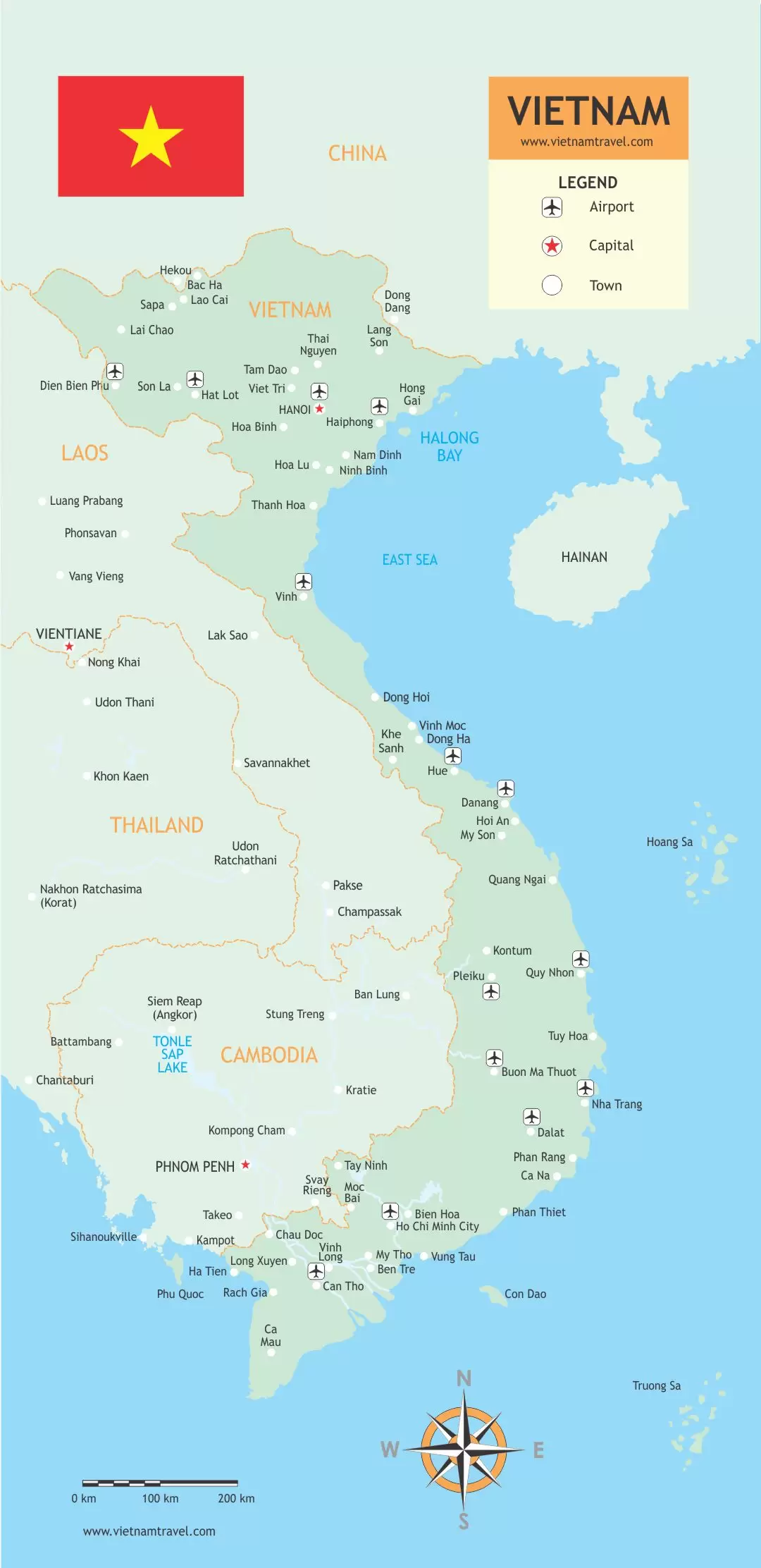
Table of Contents
1. Vietnam Visa Exemptions
2. vietnam electronic visa (evisa), 3. vietnam visa on arrival, ii. passports, iii. borders, 1. heath check on arrival, 2. insurance requirement, 3. current snapshot of covid-19 situation in vietnam, v. what you can bring with, vi. traveling by air, 1. northern vietnam (hanoi, sapa, ha giang, halong & the red river delta…), 2. central vietnam (hue, danang, hoian, nha trang, phan thiet…), 3. southern vietnam (ho chi minh city, the mekong delta & phu quoc…), 1. location, 2. time zone, 3. country calling code, 4. capital city, 5. population, 7. language, 8. history & culture, 9. religion, 11. currency, 12. electricity, 13. vaccinations, 14. main airports, 15. major airlines, 16. internet access, 17. sim cards, 18. credit cards, 19. tipping, 20. emergency calls, 1. cambodia, 2. thailand, x. final lines.
– You may also need a visa to come into or travel through Vietnam, depending on your nationality. – Vietnamese visit visas are issued to foreign nationals for a limited duration and on the basis that visitors must leave on or before the date of expiry. Those who come to Vietnam to work are required to apply for a work visa / permit. You should check the visa validity and conditions carefully. Overstaying your Vietnamese visit visa is a serious matter and you may be delayed from travel until a fine is paid, and may be prevented from visiting Vietnam in the future. – In a very small number of exceptional cases, the Vietnamese authorities may be prepared to consider extending visit visas. This often requires agents who are prepared to act as sponsors, including taking some legal and financial responsibility, for the people applying for visa extensions.
Below is all the information you need on visas for Vietnam.
Vietnam offers visa exemptions ranging from 14 to 90 days to citizens of 24 countries holding valid ordinary passports. The full list of countries with visa exemptions is below.
Vietnam’s e-Visa is now available to nationals of 80 countries ALL countries: Andorra, Argentina, Armenia, Australia, Austria, Azerbaijan, Belarus, Belgium, Bosnia and Herzegovina, Brazil, Brunei, Bulgaria, Canada, Colombia, Croatia, Cuba, Cyprus, Czech Republic, Chile, China (including Hong Kong and Macau passports), Denmark, Estonia, Fiji, Finland, France, Georgia, Germany, Greece, Hungary, Iceland, India, Ireland, Italy, Japan, Kazakhstan, Latvia, Liechtenstein, Lithuania, Luxembourg, Macedonia, Malta, Marshall Islands, Mexico, Micronesia, Moldova, Monaco, Montenegro, Mongolia, Myanmar, Nauru, Netherlands, New Zealand, Norway, Palau, Panama, Papua New Guinea, Peru, Poland, Portugal, Philippines, Qatar, Romania, Russia, Salomon Islands, San Marino, Serbia, Slovakia, Slovenia, South Korea, Spain, Sweden, Switzerland, Timor Leste, United Arab Emirates, United Kingdom, United States of America, Uruguay, Vanuatu, Venezuela, and Western Samoa.
The e-Visa takes three working days to process, costs 25 USD, and is a single-entry visa, valid for 30 days. You can enter Vietnam on an e-Visa at any of the country’s eight international airports, including Hanoi, Ho Chi Minh City, Danang and Phu Quoc, as well as 14 land crossings and 7 seaports.
How to Apply for Vietnam’s e-Visa: Step 1 : Prepare the required materials: + One 4×6 passport photo in .jpg format with a white background, without glasses. + One photo in .jpg format of your passport data page, + Passport valid for at least six months. + Your temporary address in Vietnam and points of entry and exit. + Debit or credit card for payment. Step 2 : Click this link or access www.immigration.gov.vn and go to ‘E-visa Issuance’ then click on the link for ‘Outside Vietnam foreigners’. Step 3 : Upload your .jpg images (passport data page and passport photo) and fill out the required fields on the form completely. Submit your form. Step 4 : Pay the e-Visa fee of 25 USD. Copy down the document code provided. Step 5 : Within three working days you should receive news of your e-Visa application via email. If not, you can also run a search for your e-Visa at this link. Step 6 : Use your document code to locate your e-Visa online. Download and print the e-Visa in two copies for extra safety. Travelers with an eVisa can go directly to immigration counters at their point of entry and do not need to queue at Visa On Arrival counters.
If you are planning a multiple-entry visit or a stay of more than 30 days, you will should apply for a visa on arrival. Requirements: + A 4×6 passport photo with a white background and no glasses. + A filled-out visa application form. + A passport or substitute ID valid for six months from the date you plan to enter Vietnam. + Payment (25 USD to 50 USD) for visa fees. + A Letter of Approval from a Vietnamese embassy or consulate (if you are picking up your visa at the airport). + If you are near a Vietnamese embassy or consulate, you can submit your photo, application form, passport, and visa fee in person.
If you are unable to reach a Vietnamese embassy, or are short on time, Vietnam Travel can help you obtain the Vietnam Visa Approval Letter . Bring this letter and together with a visa application form and your other documents to the Visa On Arrival counter at the airport when you land. You will need to pay your visa stamp fee in USD or Vietnamese Dong on arrival at the airport.
1. Your passport should be valid for a minimum of 6 months on the date you enter Vietnam. 2. A number of foreigners have been refused entry and exit due to their passport being damaged. Make sure your passport is in good condition before arriving in Vietnam. 3. Your passport will be checked when you arrive at a Vietnam port or airport to make sure you’re allowed to come into the country. It should be valid for the whole of your stay. 4. Being refused entry can result in significant cost and a long stay at the airport.
When checking into a hotel, you’ll have to hand over your passport so that the hotel can register your presence with the local police. Make sure your passport is returned and keep it in a safe place. You may be fined if you don’t register.
On 15 March 2022, Vietnam officially reopened its inbound tourism after nearly two years of closure.
IV. HEALTH AND SAFETY PRECAUTIONS FOR TRAVELERS
Travelers in Vietnam are encouraged to take sensible precautions against Covid-19 during their trips.
The World Health Organization outlines these basic practices to keep yourself and your loved ones safe: 1. Avoid traveling if you have a fever and cough. If you have fever, cough, and difficulty breathing, alert health care services and share with them your recent travel history. 2. Maintain social distancing. Stay a metre or more away from others, especially those who are sneezing or coughing, or have fever. 3. Wash your hands regularly with soap and running water. You can also use an alcohol-based hand-sanitizer to spray your hands as often as you like. 4. Cover your mouth and nose with tissue when you cough or sneeze. Dispose of dirty tissues immediately and wash your hands after coughing or sneezing. 5. Avoid contact with live animals. Wash your hands with soap and water if you touch live animals or animal products in markets. 6. Eat only well-cooked food. Make sure your meals especially animal proteins and dairy products are thoroughly cooked and prepared in a sanitary environment. 7. Discard single-use masks. If you choose to wear a single-use mask, ensure it covers your nose and mouth, avoid touching the mask, and wash your hands after removing it.
Vietnam dropped Covid-19 testing requirements for all international arrivals from 15 May 2022 as per Official Dispatch No. 416/CD-TTg after a significant decrease in the number of cases.
Purchase medical/travel insurance that covers COVID-19 treatment with a minimum of 10,000 USD cover. This typically costs about 40 USD.
Any travelers experiencing symptoms of the virus – fever, cough and difficulty breathing – should immediately call Vietnam’s health hotline: 19003228, or contact Vietnam Travel’s consultants for instant support.
What you can bring with you depends on where you’re traveling from. You must declare to customs: + anything over your duty-free allowance. + banned or restricted goods in Vietnam. + goods that you plan to sell. + more than 5,000 USD (or its equivalent) in cash. You and your baggage may be checked for anything you must declare.
Passengers must wear face masks when flying in Vietnam, including with Vietnam Airlines, Vietjet Air, Bamboo Airways. Flight attendants will also be required to wear masks. Passengers on flights within Vietnam are also required to undergo verbal health assessments and temperature checks.
VII. WEATHER AND CLIMATE IN VIETNAM
Vietnam’s unique geography creates a range of weather patterns, with both tropical and temperate zones. Generally, there are two monsoon seasons, between October and March in the northeast and between April and October everywhere but the mountains. While March to May offers the best weather countrywide, there is no bad time to visit Vietnam, as there is always some part of the country with holiday skies. Below is a guide to climate of Vietnam ’s major regions and destinations, so you know what to expect during your trip.
December – March : cool to cold, misty, cloudy. April – June : warm to hot, clear skies, sunny. June – August : hot, humid, rainy. September – November : cool, clear skies, sunny. The best time to visit Hanoi and the Red River Delta (including Halong Bay, Cat Ba Island, Ninh Binh) is usually from April to June or from September to December. From April the days are normally hot, occasionally above 30 degrees with clear skies. September to November sees cooler temperatures of around 25 degrees and sunny skies – perfect for exploring the region.
If you’re coming to Hanoi in June, expect soaring temperatures with humidity highs of 40 degrees Celsius, and the rainy season is full swing (June to August). December is cool, misty and atmospheric, however from late December until March temperatures are surprisingly cold with lows of 10 degrees. You’ll want to bundle up.
September – January : rainy, cool, cloudy. February – August : warm to hot, sunny, clear skies. Tropical storms often hit Central Vietnam starting in September. March is an excellent time to see the region when the fields, gardens and streets are awash in bright blossoms and soothing greens. From May to August, it can be hot, and you’ll want to head to the beach to cool off. In the late months of the year, from September to November, the Central Vietnam sees a lot of rain and even a few small floods. The temperatures begin to dip and reach their coldest point in January, warming up just before the Vietnamese New Year.
May to November : sporadic rainfall, hot, humid. December to April : clear skies, hot, sunny. Southern Vietnam and Ho Chi Minh City (Saigon) have consistent temperatures year-round. HCMC is either hot and dry or hot and rainy, although there are some pleasant fresh days early in the year, and some scorching days mid-year. Temperatures are normally around 30 degrees, with sunshine. From May to November, the wet season brings a dependable afternoon downpour, usually lasting a few hours.
VIII. THE BASICS
Vietnam is a country in Southeast Asia and borders China, Laos, Cambodia, Gulf of Tonkin, the Pacific Sea and the Gulf of Thailand. It comprises over 330,000 square kilometers, with more than 3,200km of coastline. From Dubai, a non-stop flight is 7h15m, and from Australia, it is roughly 8 hours direct.
Indochina Time Zone UTC + 07:00.
International dialing code for Vietnam: +84.
Hanoi is the capital of the Socialist Republic of Vietnam. It is the second biggest city of the country, just after Ho Chi Minh City (formerly known as Saigon).
Vietnam’s population has been recorded at over 96.2 million on 1 st April 2019, making it the 15th most populous country in the world and the third in Southeast Asia.
Vietnamese people are composed of 54 different ethnic groups coexisting peacefully, in which the Kinh (Viet) people account for 86% of the population and 53 other ethnic groups represent over 10%.
The official language of Vietnam is Vietnamese. English is spoken across the country and you should have no issue with basic communication or greetings.
Vietnam’s long and complex history includes Chinese, French, Japanese, and American influences adding to the intrigue of the country. Millennia of invasions and conflicts have shaped Vietnamese culture into what you see today. Vietnamese culture is complex, diverse and represents something of a history lesson. Vietnam’s culture focuses on humanity, harmony, family, and community values through music, art, dance, and literature. There are hints of French and American influence, but national symbols like dragons, turtles, bamboo, and lotuses are strictly Vietnamese and can be seen on many buildings and Buddhist temples throughout the country.
Vietnamese society is both conservative and fairly tolerant, so it’s best to follow these simple rules to avoid causing offence: shorts and sleeveless tops fine for the beach, not so at religious sites, and nudity on the beach is a no-no.
Vietnam’s major religions are Buddhism (14.91%) and Catholicism (7.35%), although the largest percentage of the population follows Vietnamese folk traditions or identifies as non-religious. Around 7% of the population is Christian, and there are also tiny numbers of Hindu and Muslim believers.
Vietnam travel is safer than you’d expect – the government has done a good job on keeping a lid on civil unrest in Vietnam, and violence to tourists has remained thankfully rare. Which isn’t to say that crimes of opportunity don’t happen: in Hanoi, Nha Trang and Ho Chi Minh City, tourists may be targeted by pickpockets and motorcycle-riding purse snatchers.
Vietnam uses the Vietnamese Dong (VND). It is safe to withdraw money from banks or ATMs while you’re in Vietnam – just check how much you’re really withdrawing. Exchange rates: 1 USD ~ 0 VND 1 EUR ~ 0 VND 1 AUD ~ 0 VND 1 SAR ~ 0 VND 1 INR ~ 0 VND
The electrical current in Vietnam is 220V/50Hz using plug types A, C and F. The standard voltage in the US is 110 volts, so you may need a surge adapter.
Typhoid, Hepatitis A and B and antimalarial tablets are advised, but not compulsory. You will, however, need a Yellow Fever certificate if traveling from a high-risk area. Consult your doctor 4 to 8 weeks before you depart.
Noi Bai International Airport (Hanoi – in the North), Tan Son Nhat International Airport (Ho Chi Minh City – in the South) and Danang International Airport (Danang City – in the Centre) are the international and domestic hubs for travelers. Other international airports of the country are Cat Bi (Hai Phong), Van Don (Quang Ninh), Vinh (Nghe An), Phu Bai (Hue), Cam Ranh (Nha Trang – Khanh Hoa), Can Tho (Can Tho City), and Phu Quoc (Phu Quoc Island).
With four airlines operating internal flights in Vietnam, and all providing an online booking service, there’s plenty of choice and booking in advance is easy. Vietnam Airlines is Vietnam’s national carrier. It has a comprehensive domestic network and a growing international one. Following names are Vietjet Air, Bamboo Airways, Jetstar Pacific Airlines.
Vietnam ranked 60th in the world for mobile speeds and 59th for fixed broadband speeds during May 2020. Internet and Wi-Fi are widely available throughout Vietnam. Something like 98% of hotels and guesthouses have Wi-Fi; only in very remote places (such as national parks, islands) is it not standard. Wi-Fi is almost always free of charge. Many cafes and restaurants also have (free) Wi-Fi. Connection speeds are normally fast and stably. Most travelers also surf the net using 4G mobile phone connections.
In Vietnam, Google (including Gmail, Google Maps, Youtube…) Facebook and TikTok are tops and Twitter isn’t blocked.
SIM cards are easy to get and affordable in Vietnam so there is no excuse for not getting one, even if you’re only traveling through for few days. For only 5 USD, you can enjoy a 2GB mobile data valid for 30 days with a speed up to 30Mbps. The cost of Vietnam sim card (mobile data) is between 5 USD to 14 USD, equivalent to 2GB – 20GB. Make sure your phone is unlocked. You can purchase SIM cards almost everywhere, including at the airport, mini marts, street vendors and travel agencies. The biggest mobile networks in Vietnam are Viettel, Vinaphone and Mobifone.
Credit cards are widely accepted throughout Vietnam. Please check with your bank about any foreign transaction. Mostly, transaction fee will be applied by agents, hotels, shops in Vietnam (about 3% for processing fee).
While tipping is not compulsory or always expected, but it is recommended to leave a tip to show your gratitude and appreciation for the food or service. As a guideline if you are traveling, alone we would recommend that you tip your guide between 5-7 USD per day, if traveling in a couple then allow 7-10 USD per couple per day. When traveling in a group of 3-4 then tipping in the region of 10-12 USD per group per day is appropriate, when traveling in groups larger than four then allow an increase roughly equating to 10% more for each additional person in the group.
The phone numbers to call in case of emergency are 113 for the police, 114 for a fire and 115 for an ambulance.
IX. OTHER TRAVEL INFORMATION RELATED TO CAMBODIA, LAOS, THAILAND & MYANMAR
Now Cambodia no longer requires inbound travelers to complete a health declaration form or provide proof of vaccination as 6th Oct 2022, effectively ending all border controls. However, travelers will continue to be subjected to temperature screening at all entry points into Cambodia.
No requirement for Covid-19 insurance coverage as well.
Visa on Arrival for all travelers to Cambodia is also reopened and this is applicable for all travelers arriving in Cambodia by air, land and sea. You can apply Cambodia e-Visa yourself at: https://www.evisa.gov.kh/
From 1 October 2022, passengers is no longer required to present Covid-19 related documents such as a certificate of vaccination and Covid-19 test results upon arrival in Thailand. No requirement for Covid-19 insurance coverage as well.
Laos officially dropped Covid entry restrictions for fully vaccinated tourists from Monday, 9 May 2022. Unvaccinated visitors must produce a Rapid Antigen Test issued within 48 hours of leaving their origin country. Visitors contracting or arriving with Covid-19 will be responsible for all treatment costs. Treatment can be obtained at state and private hospitals, while self-isolation and self-care is another option.
Those who have been infected with Covid-19 and recovered will not need to take an RT-PCR test, however, an official medical certificate will be required.
All international checkpoints is reopened for entry and exit by citizens and foreigners. Vehicles will be allowed to enter and exit as normal, the same as before the pandemic.
Citizens of countries that have bilateral or unilateral visa waiver agreements with Laos may now enter Laos without the need for a visa.
Citizens of countries that do not have a visa waiver agreement with Laos may now apply for a visa at a Lao embassy or consulate abroad or via the e-Visa online system. Visa on arrivals will also be reinstated at certain international checkpoints.
Now Myanmar is officially open for travel if visitors are fully vaccinated and meet the criteria to secure an online e-visa. You will be expected to take a Covid-19 Rapid Antigen Diagnostic Test at the airport, regardless of your vaccination status. You should bring 15,000 MMK (Myanmar Kyat; roughly 7 USD) with you or be prepared to convert cash at one of the exchange counters. This is in addition to the test you need to take 48 hours before your arrival. Which test you can take depends on if you are fully vaccinated or not.
If the test result is negative, you will be free to leave. Travellers who display symptoms or test positive will be isolated and taken to a hospital or hotel designated by the Ministry of Health at their own expense.
International travelers are also required to purchase Myanmar health insurance that covers Covid-19 (starting price 50 USD for insurance valid for 15 days). If the in-country test is positive, the health insurance covers the additional cost of hotel quarantine and hospital fees according to requirements by the health authorities for a maximum of 4,500 USD.
The list of approved hotels where international travelers must wait for results from their PCR test can be found here . There will be two categories of hotels to choose from: Category A which is 5 star accommodation and recommended for travelers and Category B which is 3* accommodation.
Due to the current situation in Myanmar, some areas of the country are either off limits to tourism or require special permission to visit. We recommend you only visiting established tourism centers including Yangon, Mandalay, Bagan and Inle and to avoid overland travel where possible by using flights.
Cash withdrawals from ATMs in Myanmar are not possible at the moment, and businesses do not accept international credit cards. Travelers must pre-arrange their trip to Myanmar through a travel agency and bring lots of cash to cover the entire holiday costs.
We share your passion for travel and are always here, whether you are looking for a family vacation , a beach escape or seeking an adventure or a contentment. We hope that our information gives you some peace of mind and we look forward to welcoming you soon. Please keep in mind that information is correct at the time of 15:00, 31 Oct 2022 (GMT +7, Hanoi Time) and will be updated as soon as possible.
Bookmark our Vietnam Travel Guide to see the most updated news and useful tips related to tourism first.
Thank you for choosing Vietnam Travel !
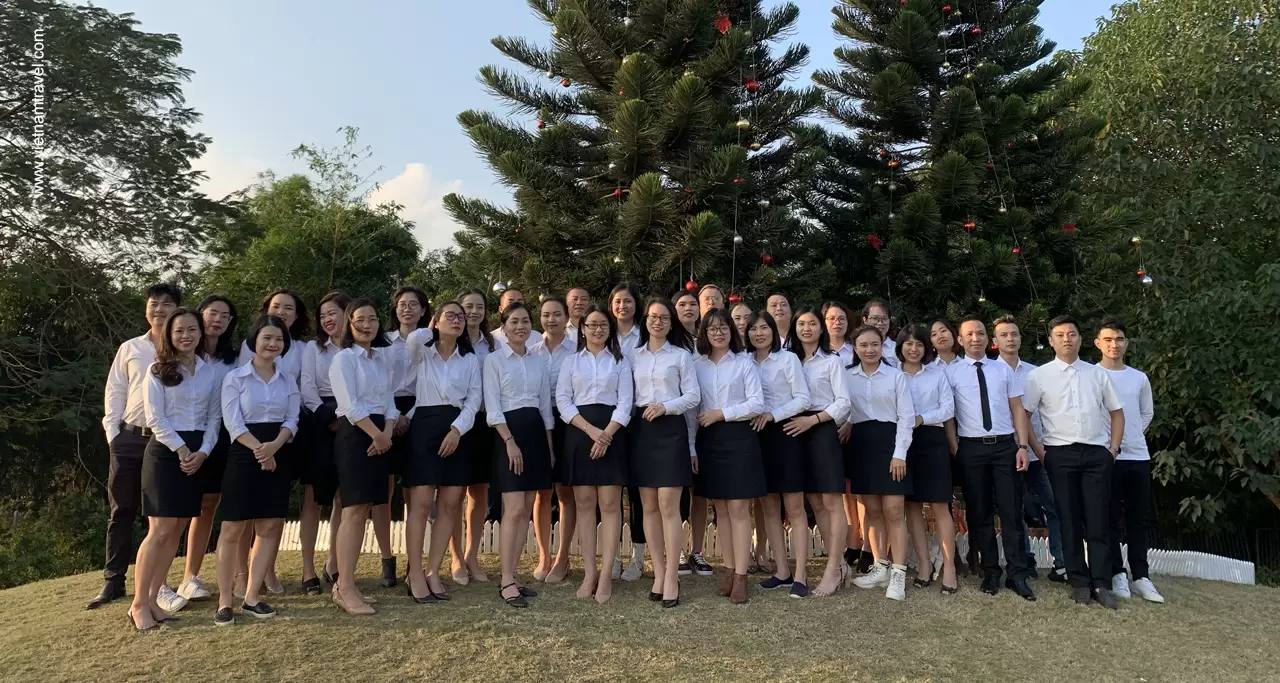
Updated: 31 Oct 2022
Related Posts
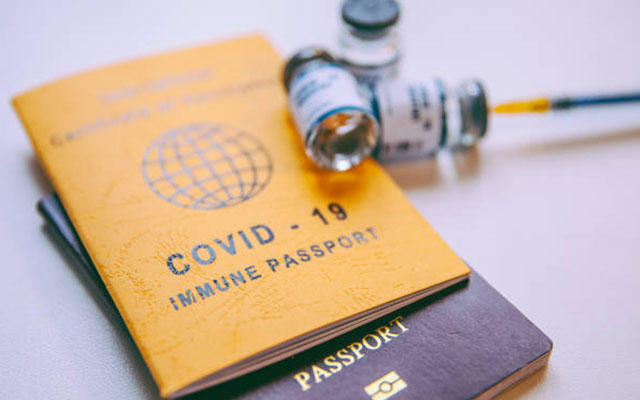
Vaccine Passports to Vietnam
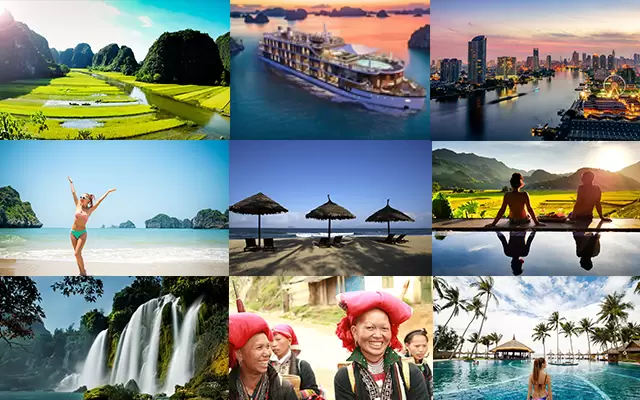
Vietnam Travel Destinations To Visit Post-Covid19
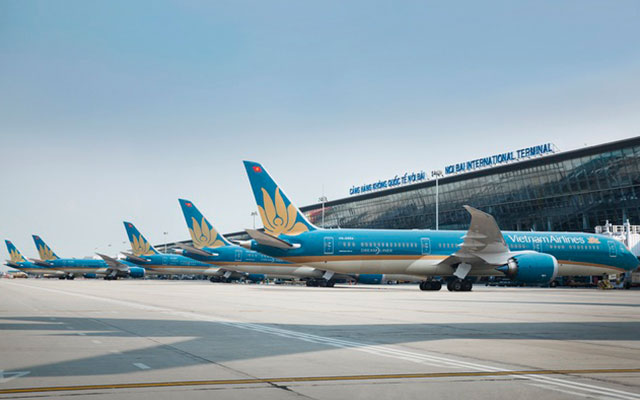
Vietnam proposes resumption of international flights
Leave a comment cancel comment.
Sign up today and receive a customized itinerary based on your own travel style, budget… by our Vietnam Travel consultants
You have chosen a tour duration longer than 20 days. Please specify the exact number of days you want to travel in the message box below, so that we can have enough information and make a program for you. Thank you for your cooperation.
You have selected a number of travellers greater than 20. Please let us know the exact number of people in your group in the message box below so that we can quote you accurately. Thank you for your cooperation.
You have selected a number of travellers and duration greater than 20. Please let us know the exact number of people in your group and the exact number of days in the message box below so that we can quote you accurately. Thank you for your cooperation.
* To be sure you'll receive our itinerary (email failure case...)
(We'll get back to you within 8 business hours)
Regulations for international visitors to Vietnam from 15th March 2022 - Viet Nam National Authority of Tourism
(TITC) – Vietnam officially reopens tourism from 15th March. On the same day, Ministry of Culture, Sports and Tourism promulgated the guidance including requirements for international visitors to Vietnam.

International tourists in Hoi An City, Quang Nam Provinve. Photo VOV
Accordingly, international visitors entering into Vietnam are not required for mandatory quarantine.
Requirements for international visitors to Vietnam
- Have a negative SARS-CoV-2 test result using RT-PCR/RT-LAMP method within 72 hours before entry into Vietnam or have a negative rapid test result within 24 hours before departure certified by the competent authority of the country where the test is performed.
- For international visitors entering via land, rail and sea border gates, undergo test for SARS-CoV-2 at border before entry in case of no proof of negative test result.
- Children under 2 years old are not required to be test for SARS-CoV-2.
- Have medical or travel insurance that covers COVID-19 treatment with a minimum liability of USD10,000.
- Complete a health declaration before entry. (at https://tokhaiyte.vn)
- Install and use PC-COVID application.
- Self-monitor health for 10 days after entry.
- Notify health authority if having signs and symptoms of COVID-19.
- Ensure conditions on exit and entry according to Vietnam's immigration laws and other relevant regulations when travelling in Vietnam.
Visa policy
Vietnam restored the policies on entry visas for foreigners as before the pandemic outbreak.
From 15th March 2022 to 14th March 2025, Vietnam applies visa exemption for citizens of 13 countries (Germany, French, Italy, Spain, UK and Northern Ireland, Russian, Japan, Republic of Korea, Denmark, Sweden, Norway, Finland and Belarus) with maximum length of stay to 15 days.
In case of need support in acquiring the entry permit, please contact Vietnam Immigration as following:
Email: [email protected], and [email protected]
Tel: +84 (024) 3826114 / (024) 3826026 (Ha Noi) / (028) 3920 0365 (Ho Chi Minh City)
Website: https://xuatnhapcanh.gov.vn
Tourism Information Technology Center
Vietnam Travel Restrictions
Traveler's COVID-19 vaccination status
Traveling from the United States to Vietnam
Open for vaccinated visitors
COVID-19 testing
Not required
Not required for vaccinated visitors
Restaurants
Not required in public spaces and public transportation.
Ready to travel?
Find flights to vietnam, find stays in vietnam, explore more countries on travel restrictions map, destinations you can travel to now, dominican republic, netherlands, philippines, puerto rico, switzerland, united arab emirates, united kingdom, know when to go.
Sign up for email alerts as countries begin to open - choose the destinations you're interested in so you're in the know.
Can I travel to Vietnam from the United States?
Most visitors from the United States, regardless of vaccination status, can enter Vietnam.
Can I travel to Vietnam if I am vaccinated?
Fully vaccinated visitors from the United States can enter Vietnam without restrictions.
Can I travel to Vietnam without being vaccinated?
Unvaccinated visitors from the United States can enter Vietnam without restrictions.
Do I need a COVID test to enter Vietnam?
Visitors from the United States are not required to present a negative COVID-19 PCR test or antigen result upon entering Vietnam.
Can I travel to Vietnam without quarantine?
Travelers from the United States are not required to quarantine.
Do I need to wear a mask in Vietnam?
Mask usage in Vietnam is not required in public spaces and public transportation.
Are the restaurants and bars open in Vietnam?
Restaurants in Vietnam are open. Bars in Vietnam are .
- Ho Chi Minh City

- Vietnam Visa
Entry Requirements
Vietnam is not so strict on entry visa requirements like other countries. Below is list of things you will need to know before you enter Vietnam.
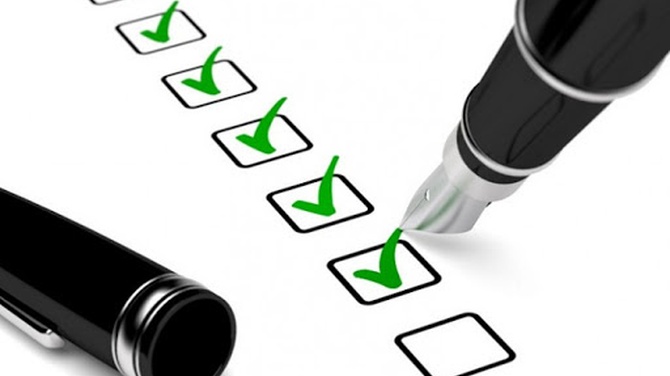
- 1. Mandatory Requirements (in case you get your visa in advance from the embassy)
- 2. Mandatory Requirements (in case you apply for a visa on arrival online)
All travelers need to present their passports at the Vietnamese border to gain entry. To meet the entry requirements, nationals from certain countries also need to obtain a visa in advance while the other can enter without a visa.
Mandatory Requirements (in case you get your visa in advance from the embassy )
- A valid passport with 02 blank pages and 6 months remaining beyond intended stay
- Proof of onward travel (Unlikely to be asked)
- Visa application form ( https://visa.mofa.gov.vn/_layouts/registration/ApplicationForm.aspx )
- 2 recently taken photos
- Visa application fees
Mandatory Requirements (in case you apply for a visa on arrival online)
- Applicants must enter Vietnam by air to Hanoi , Ho Chi Minh city or Da Nang .
- Passport must valid at least 6 month from the date of exit.
- Two passport photos size 4 x 6 cm (see photo specifications ).
In most cases, you do NOT need to show the following:
- Proof of sufficient financial
- Vaccination certificate
- Travel plans (including a proof of hotel booking)
The required documents and visa requirements for Vietnam can vary on a case-to-case basis, therefore, it is advised that you consult with the local Embassy of Vietnam before you travel to Vietnam.
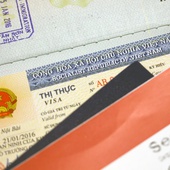
Vietnam applies its new policy for e-visa effective from 1 February 2017.
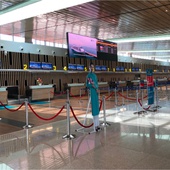
Airport Procedures
Ever wonder how the immigration takes place? Here is what happens as you leave your country for Vietnam.
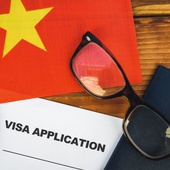
Forms and Documents
In this page, you will find the detailed guide to fill out a Vietnam visa application forms and entry/exit form.
Meet our experts

Suggested Holiday Packages

Do I need a visa to go to Vietnam?

Aug 10, 2023 • 6 min read

Here's what you need to know about visa requirements for Vietnam © Matthew Micah Wright / Getty Images
Whether you’re planning to bask on the beaches, scramble through the jungles, time-travel in historic townships or set up as a digital nomad in hip Hanoi, the chances are you’ll need a visa to visit Vietnam , except for short visits of less than 15 days.
But there’s good news – while there’s red tape to wriggle through, many nationalities can apply for an E-Visa online, saving time and money.
Vietnam imposed tight COVID restrictions at the height of the pandemic, but these days, you can visit without a Covid test or proof of vaccination. Getting hold of a visa has also become easier, with a dedicated government portal for E-Visa applications. Here’s what you need to know about the entry requirements for Vietnam.

Who needs a visa to visit Vietnam?
Whether or not you need a visa to visit Vietnam will depend on where you live and how long you’re planning to stay. Citizens of neighboring nations in Southeast Asia, including Cambodia, Thailand, Malaysia, Singapore, Indonesia, and Laos, can visit for 30 days without a visa. Citizens of the Philippines can stay for 21 days visa-free, citizens of South Korea and Japan can stay without a visa for 15 days and citizens of Brunei and Myanmar can stay visa-free for 14 days.
How about travelers from Europe?
There’s good news for European travelers – citizens of Sweden, Norway, Denmark, and Finland can travel visa-free for 15 days, reflecting the fact that these countries were among the first foreign powers to recognize the Socialist Republic of Vietnam. British, German, French, Spanish and Russian citizens can also visit without a visa for 15 days.
What about everyone else?
Travelers from the rest of Europe and the rest of the world will need a visa to visit Vietnam, as will travelers from visa-exempt countries visiting for more than the approved number of days, and visitors coming for business or other non-tourism purposes.
How do I get a visa?
There are three ways to get hold of a visa. You can apply the old-fashioned way via the Vietnamese embassy or consulate in your home country (either in person or by post); you can apply for a Visa on Arrival via a Vietnamese visa agency; or you can apply for an E-Visa online before you travel.

How long are Vietnam visas valid?
Standard tourist visas are valid for 30 or 90 days. You can apply for either a single entry or multiple entries, and visas can be extended within Vietnam for an additional fee. For visas for business trips, contact your local Vietnamese embassy or consulate – there’s a list of overseas missions on the website of the Ministry for Foreign Affairs . Digital nomads generally travel on tourist visas.
What are the special visa rules for Phu Quoc Island?
Travelers visiting Phu Quoc – Vietnam’s best-loved tropical island – can stay for up to 30 days visa-free. This applies even if you don’t come from a visa-exempt country, but you must enter Phu Quoc by air. On arrival, you can apply for a visa allowing entry to the rest of Vietnam or stays of more than 30 days.
How do I apply for an E-Visa?
The government’s slightly confusing E-Visa portal is the place to apply for an electronic visa. These visas are valid for 30 days and allow a single entry. You can enter via any approved air, land, or sea border but the port of entry must be listed on your application. The process takes three working days, and the scheme is open to citizens of 80 countries, including most nations in Europe, the US, Canada, Australia, and New Zealand.
You’ll need to provide a high-resolution digital passport photo and a scan of your passport ID pages when you apply. Be sure to note down the registration number for your application – you’ll need this to access the downloadable PDF file containing your visa (print and carry two copies with you when you travel).
How do I apply for a Visa on Arrival?
If you fly into Vietnam and land at Tan Son Nhat International Airport in Ho Chi Minh City , Noi Bai International Airport in Hanoi , or Da Nang International Airport in Da Nang , you can apply for a Visa on Arrival via an online visa agency such as Vietnam Visa Center or Vietnam Visa , but this is a more expensive option.
In fact, this is a two-part process. As well as paying a fee for the online application, you’ll need to pay a second fee on arrival in Vietnam for the visa to be physically added to your passport. The online application takes two working days to process, but you can also pay extra for an expedited one-day or four-hour service.

How much does a Vietnam visa cost?
Visa prices vary depending on where you obtain your visa – travelers who apply online pay different fees to people applying in person or by post at embassies and consulates. For a standard 30-day E-Visa, the fee is US$25. Contact your local embassy or consulate for fees for in-person or postal applications.
To get a Visa on Arrival, you must first pay a fee to a visa agency for a "visa pre-approval letter". For a single-entry visa, this costs around US$17 for 30 days and US$25 for 90 days. For a multiple-entry visa, the fee is around US$20 for 30 days and US$65 for 90 days.
You’ll need to pay a second fee, known as a "Stamping Fee", when you reach Vietnam, using foreign currency. This costs US$25 for a single-entry visa and US$50 for a multiple-entry visa. Different fees apply for visitors from most of Africa and the Middle East and some countries in Asia.
Applying for a visa – the practicalities
Whether you apply online or in person at your local embassy or consulate, your passport should be valid for at least six months after your proposed date of exit from Vietnam. You can enter on or after the date of entry you declare on the application form, but you must still exit by the expiry date printed on your visa.
If you apply in person or by post, you’ll also need to provide some passport photos with your application form. If you apply online, you’ll need high quality digital passport photos; for a Visa on Arrival, bring two 4cm by 6cm photos to hand over when you pay the stamping fee.
Can I extend my visa in Vietnam?
It isn’t too tricky to extend a tourist visa while in Vietnam, but you’ll need to enlist the help of a local visa agency. The procedure can take up to a week and you must apply before your original visa expires. It may be possible to get an extension of 15, 30 or 60 days, depending on the visa you currently hold.
Fees vary from agency to agency and depend on the duration of the extension. In practice, extensions are easiest to arrange in Ho Chi Minh City, Hanoi, Danang and Hue . Note that additional fees apply if you apply to extend your visa in a different location to the city where you first arrived in Vietnam.
This article was first published Mar 25, 2021 and updated Aug 10, 2023.
Explore related stories

Tips & Advice
Sep 3, 2024 • 9 min read
November is the perfect time to give yourself a travel-fueled lift, with destinations primed for exploration during the penultimate month of the year.

Aug 20, 2024 • 13 min read

Aug 12, 2024 • 12 min read

Aug 5, 2024 • 6 min read

Aug 1, 2024 • 11 min read
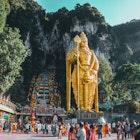
Jul 25, 2024 • 7 min read

Jul 19, 2024 • 5 min read
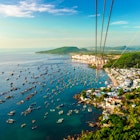
Jul 12, 2024 • 7 min read

Mar 14, 2024 • 10 min read

Feb 24, 2024 • 8 min read

Vietnam travel requirements 2024: What travelers need to know
We aim to keep this post updated about Vietnam travel in 2024 with official Vietnam travel restrictions, requirements, and health and safety guidance. Our goal is to help you make informed decisions so you can travel confidently, safely, and responsibly in this new post-pandemic world of ours.
Vietnam is a destination close to our hearts. We returned to visit Vietnam in 2023 and 2024.
As restrictions can vary based on the traveler’s citizenship, we will focus primarily on rules affecting U.S. citizens.
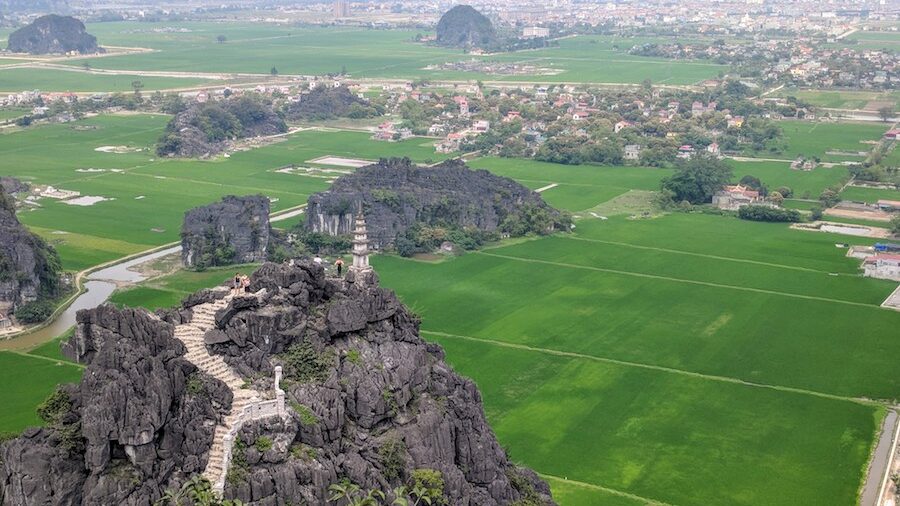
* Get our free Post-Pandemic Travel Checklist *
April 2024 – “During our 3-month stay in Central Vietnam, we took a short trip out of the country. We brought our printed e-visa , which was examined by the agent that checked us into our flight from Hong Kong back to Vietnam and again at immigration in Da Nang. Proof of onward travel was not requested this time. The Hanoi airport international check in was as crowded as ever in April. Budget airlines like VietJet use buses instead of jetways for boarding and deplaning, so it’s impossible to avoid close contact with crowds. I’d say less than 1/4 of travelers are still wearing masks. Masks are more commonly worn outside on motorbikes in Vietnam.”
January 2024 – “We flew back to Hanoi, this time with a 3-month evisa we applied for online well in advance. Besides valid passports, we were asked for proof of onward travel from Vietnam while checking into our flight in the US. We were asked to name our travel insurance provider on the visa application and brought documentation of the policy from Safety Wing , however, we weren’t asked to show it at any point. We were not asked any questions at immigration, only provided our passport and black/white print out of the visa.”
At the end of the post, we share more on-the-ground perspectives from local residents and travelers to Vietnam so you can get a true sense of what things are like.
Table of Contents
Is Vietnam open for travel? Can I travel to Vietnam right now?
Vietnam is now open to foreign travelers. Vietnam officially reopened its borders to all international visitors on March 2022, after two years of being closed.
Travelers can apply for an e-visa online. See our Vietnam evisa tips here.
Foreign travelers are not required to take a pre-departure Covid-19 test or show proof of vaccination prior to arrival. The health declaration form requirement has been removed.
Travel insurance that covers Covid-19 treatment with a minimum coverage of $10,000 has been required. There is a declaration that you’ll have insurance on the evisa application. It’s unclear if this is still being enforced anywhere. (We use Safety Wing for travel insurance in Vietnam.)
What Vietnam tourist visas are available right now?
E -visas are available to Americans, Canadians, and all other nationalities.
Effective August 2023, e-visa validity has been extended to 90 days. You can choose between single entry or multiple entries.
Travelers can apply for an e-visa at the e-visa web portal of the Vietnam Immigration Department.
Be sure to review our Vietnam evisa tips here , as there are some quirks and important things to know to avoid having to reapply.
In our experience, processing the evisa can take at least 3 days. We also had to redo one application because one of our credit cards wouldn’t allow the online charge. It’s best to apply for Vietnam e-visas several weeks in advance, just in case.
What about Vietnam Visas On Arrival?
We’re not clear on the availability of Visas On Arrival – technically it’s a Landing Approval Letter, which we used before the pandemic. We saw no desk for VOAs in the immigration hall at Ho Chi Minh City airport when we arrived at the end of 2022. In early 2024, there was a “Visa Application” desk in Hanoi, but it didn’t seem to be active.
In cases where you’re ineligible or have trouble with the e-visa process, you may be able to apply for a Landing Approval Letter through an agent in Vietnam, print out the letter, and proceed to the visa counter at the airport to receive your actual visa sticker, which is another $25 USD.
Can Vietnam e-Visas be extended?
E-visas cannot be extended , meaning visitors have to leave or do a border run and reapply. There is no official limit that we can find as to how many times tourists will be approved for e-visas back to back.
Vietnamese embassies and consulates are telling callers that nothing can be done about visas there, as all applications are currently online.
Quarantine rules in Vietnam: What happens if I get Covid?
Travelers entering Vietnam are not required to quarantine upon arrival.
Foreign tourists experiencing COVID-19 symptoms or those concerned they have been exposed to COVID-19 while in Vietnam can call Vietnam’s health hotline at 19009095 (Press 1 for English).
Foreign tourists who test positive for Covid while in Vietnam may need to isolate for treatment. Thankfully, isolation no longer needs to take place in government facilities.
Medical treatment should be covered by the visitor’s travel insurance. Some of our acquaintances tried getting Paxlovid via a local doctor while in Vietnam but were not successful.
How has the Coronavirus impacted Vietnam?
Apart from suspending foreign travel, the impact of Covid in Vietnam was relatively minimal in the first year. The country’s quick reaction became one of the most effective in the world at first. Lock downs were for a few short weeks and then daily life resumed as usual for several months until new cases popped up.
Vietnam had 99 days without any cases of community transmission and no deaths in Spring 2020. However, in late summer 2021, the infection rate in Vietnam skyrocketed as the Delta variant spread and vaccination rates were low. In December 2021, Vietnam detected the first case of the Omicron variant in Hanoi.
Strict lock down zones were implemented throughout 2021. Vietnam’s tourism and manufacturing sectors have been especially hit hard.
In March 2021, vaccinations began but very slowly. Now, over three quarters of the population are fully vaccinated.
In January 2022, Vietnam reopened international flights from select locations. A limited number of tourists were accepted through package tours and a trial vaccine passport program until full reopening in late Spring 2022.
International tourism recovery was slow in 2022, though domestic tourism was strengthened. Vietnam’s tourism in 2023 was still lower than pre-pandemic levels.
For the current situation in Vietnam, including: total COVID-19 positive cases; total cases in Vietnam; and COVID-19 testing in Vietnam, please see the Vietnam Ministry of Health site .
Can I travel to Vietnam this Fall 2024?
Travel to Vietnam this Fall is open . Read on for details and check back for updates.
What is it like to fly to Vietnam HAN Hanoi, DAD Da Nang, or SGN Ho Chi Minh City International Airport right now?
Vietnam airports seemed very busy to us, and crowds are difficult to avoid. Hanoi and Ho Chi Minh City airports can get exceptionally crowded. Masks are no longer required.
Do I have to quarantine when traveling to Vietnam? No. See details above.
Does Vietnam check COVID-19 symptoms of incoming travelers? No.
Does Vietnam require a proof of negative Covid 19 test result for travelers? No. As of April 2022, a negative test is no longer required for entry into Vietnam.
Does Vietnam require a proof of Coronavirus vaccine for travelers? No. Proof of vaccination is currently not required to enter Vietnam.
Do I still need to provide a negative Covid test or quarantine if I have been vaccinated? At this time, there is no special allowance for vaccinated travelers in Vietnam. However, a Covid test and quarantine is no longer required to enter Vietnam.
Is a booster shot required for travel to Vietnam? At this time, booster shots are not required in Vietnam. There is currently no expiration period set for the validity of vaccinations.
What healthcare options are available to travelers in Vietnam who get the virus? Hospitals and clinics are open in Vietnam. Foreigners must pay for any medical treatment out of pocket.
Government quarantine locations may only have rudimentary facilities.
Persons experiencing symptoms of the COVID-19 virus should call the health hotline at 19009095 (Press 1 for English). Availability of treatments may differ from your home country.
If a foreign visitor is required to be tested for Coronavirus, they can get tested at designated laboratories in Vietnam. The test may be free if they test negative. If the test is positive, the visitor will be required to pay for it.
For travel insurance that covers Covid, check out Nomad Insurance by Safety Wing >
What service businesses and restaurants are open in Vietnam? Businesses and activities have fully reopened. Select cities and provinces have imposed temporary lock downs or closed certain non-essential businesses when outbreaks of the virus are detected in the area.
Are face masks required in Vietnam? Vietnam has relaxed mask rules in pubic places. You’ll still see many people wearing face masks, especially while driving, as this was common practice even before the pandemic.
Are buses and trains running in Vietnam? Domestic airline and railway transportation are running on normal schedules. More daily flights within Vietnam are now available. Public and passenger transportation has resumed.
Will Vietnam impose new Covid restrictions? What’s next is difficult to predict. Vietnam no longer follows a “zero Covid” policy so shut downs are less likely than they were before vaccines were available. Historically, most countries impose COVID-19 restrictions when strains on the health care system become unsustainable.
What should you pack for safely traveling in Vietnam?
😷 Face Masks – Face coverings are required in some public places and commonly used throughout Vietnam. Find N95 masks at Bona Fide > or designer options at Vida >
🧴 Hand sanitizer Shop hand sanitizer >
💊 Medicine – Bring enough prescription and over-the-counter medication for your entire trip to avoid trips to the clinic.
💳 Vaccine Card Holder – Protect that paper CDC card when traveling abroad (if your country doesn’t offer a digital version). Get a simple plastic protector > or Vegan leather clippable > or Leather passport + card combo holder >
👃 Covid self-test – The most studied rapid antigen self-test with FDA emergency authorization. NOT valid to enter countries. Use for your own peace of mind. Order from CVS > or Walmart >
💧 Sealed water bottle – Make sure your reusable water bottle has a lid that’s not exposed to the air. We use one of each of the following: Shop insulated water bottles with protective lid > Shop water bottles with purification filter and protective lid >
✈️ Travel insurance that covers Covid – We’ve started using Nomad Insurance by Safety Wing for affordable evacuation, international medical, and trip coverage.
TIP: Traveling abroad is much easier when our smartphone stays connected.
If you have our WorldWide Connectivity course (also available inside our Membership ), review the modules on eSIM Best Practices and Managing Data Usage to get the most out of your eSIM!
What do Vietnamese locals and recent travelers say about visiting Vietnam now?
What is it like to visit Vietnam right now? It’s our goal to provide regular updates here from real people on the ground, to help potential visitors know what to expect. The following are subjective opinions only. Official travel guidance can be found above.
October 2023 – Peta and Jonas of Exit45 Travels , Australian travelers: “We are travelling around the north of Vietnam for 1 month from mid-September to mid-October 2023. We are nearing the end of the wet season here in the north of Vietnam which is traditionally low season. There are some tourists travelling around but in general, it is fairly quiet.
There are no travel restrictions in place here in Vietnam and there is no shortage of restaurant, accommodation and medical care facilities available. As the seasons are changing here at the moment, many locals and travellers are sick with head colds. This has been most obvious in restaurants where the cooks and waiters have been coughing and sneezing freely without covering their mouths or wearing face masks. It feels as though covid never really happened, and no lessons have been learnt about general hygiene. This may have been the case pre-covid too, and maybe we just didn’t notice then, but we have certainly had a heightened awareness of it this time.
The new e-Visa application process can be quite a challenge and whilst they say to allow 3 to 5 business days for approval, we would highly recommend applying approximately 1 month before you plan on arriving in Vietnam. If you then have any problems with the application, you will have time to reapply.
The biggest problem people are encountering is once approved, the information on your approval is incorrect i.e. middle name is missing, D.O.B. has the day / month in the wrong format, incorrect entry port etc.”
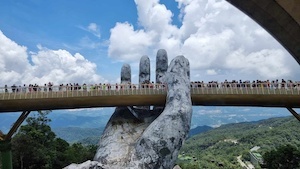
September 2023 – Ros & Alan Cuthbertson of StepIntoVietnam , Australian Digital Nomads: “We visited Vietnam frequently prior to Covid and have returned three times since the country reopened post Covid.
Everything is back to normal, masks are not required but you will find many locals still wearing them. Very few tourists can be seen wearing masks. There is no Covid or health testing required for travel within the country.
Tourists are beginning to flock to Vietnam and are rediscovering the wonders of this fascinating country. Popular destinations such as Hanoi, Ha Long Bay and Hoi An and Ho Chi Minh City are busy with tourists and prebooking travel and tours is advised. For example we tried to book a two berth train cabin from Hanoi to Hue but they had been booked out months in advance and we had to get a four berth cabin instead.”
March 2023 – Michelle, Intentional Travelers, U.S. nomad: “We thoroughly enjoyed returning to visit Vietnam and would have stayed longer if we could. Our Vietnamese friends tell us that Covid is no longer a major concern in Vietnam. Tourists have few restrictions to worry about.
There are still fewer tourists than pre-pandemic times, so I think now is a great time to visit. It still gets crowded in Hoi An Ancient Town at night, and the Hanoi airport departures area seemed exceptionally crowded.”
February 28, 2023 – Michelle, Intentional Travelers, U.S. nomad: “We arrived back in Vietnam, flying from Thailand to DAD, for our second stay on the 30-day tourist visa. The evisa application took 3-4 days this time and we made sure to print it out. Air Asia checked the evisa at check in, as did the agent at immigration when we arrived.
Filling out an immigration form when arriving in Vietnam is no longer required unless you have something to declare (bring in significant money or goods into the country). Wait time for immigration was no longer than the wait for our bags to show up at luggage claim, and customs just asked us to scan our two carry on bags.
As our flight came in, AirAsia announced that there was a mask requirement for arriving in Vietnam. However, we did not see masks enforced and even a few of the airport employees weren’t wearing masks.”
January 27, 2023 – Michelle, Intentional Travelers, U.S. nomad: “Unlike our flight into Vietnam, masks were not required on our outgoing flight but a majority of passengers and all the crew were wearing face coverings. Da Nang airport is spacious and only crowded at certain times when many flights are scheduled.”
January 2, 2023 – Michelle, Intentional Travelers, U.S. nomad: “The Ho Chi Minh City airport was very busy and had quite a few delayed domestic flights early in the year. More than half of passengers were wearing masks though they’re not required.”
December 2022 – Michelle, Intentional Travelers, U.S. nomad: “We flew to Ho Chi Minh City, Vietnam from the US via Singapore. We applied for the 30-day evisa about one week before traveling. There was an issue with Chase not allowing the credit card charge online, so we had to redo one of our applications. It was processed in 2-3 days and I printed the one-page documents for our trip. We also printed our Safety Wing travel insurance coverage letter but didn’t end up needing to show it.
Upon check-in with Singapore Airlines in Seattle, we were only asked for our passports and visa paperwork. Arriving in Vietnam, there was a 40+ minute wait for immigration. We had to show our passport, boarding pass, and evisa printout. We were never asked for onward flight booking or Covid documents.
Masks were required on our flight into Vietnam. Many locals wore masks before the pandemic (partly due to air pollution), so mask-wearing out in public is still very common but by no means universal in Vietnam.”
July 1 2022 – M.T. Expat in Ho Chi Minh City: “Covid is very much an afterthought for most people now – official national case numbers have been under 1,000 per day for a while (with basically no testing going on), and mask use is far from universal anymore. I’ve even seen people in airports and on planes without a mask… But health officials are starting to sound some (mild) alarm bells [regarding the Omicron BA.5 variant]. Given how normal daily life has become (and the incredible surge in domestic travel, which is seeing holiday-level airport traffic daily), conditions are ripe for Covid to spread rapidly.”
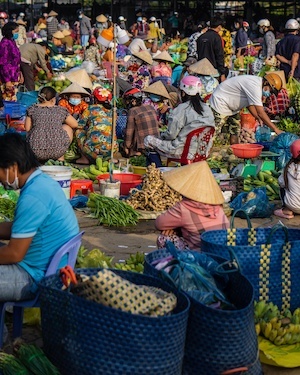
May 2022 – Karla of Colorful Journeys , expat in Vietnam: “Every day, an increasing number of tourists travel within Vietnam. Many local tour operators have reopened for business and are now easily bookable. Transportation options are widely available and simple to book.
Despite the fact that there are no longer any travel restrictions in Vietnam, the majority of people still wear masks. This is particularly true in larger cities such as Ho Chi Minh City and Hanoi. There is also a lot of local testing accessible in major cities. Because many hotels and attractions are permanently closed, it’s a good practice to call the business beforehand.”
March 25, 2022 – Phu, Vietnamese tour guide: “Vietnam now is reopening for tourists but the tourists come to Vietnam very little at the moment. Not so many, still quiet here. In Hoi An all the shops and restaurants are open, and more domestic tourists come to Hoi An. The local people we are really happy welcome the tourists. And me I open my motorbike tours again, but in 1 month I have only one tour booking. I will be offering a discount price to welcome tourists booking this is the year.”
We highly recommend a motorbike day tour or overnight tour with our friend, Phu! Contact him at Hoianmotorbiketouradventures@ gmail.com .
January 2022 – Isabelle of Move to Vietnam , Vietnamese resident: “At the moment, domestic travel is possible as long as you are fully vaccinated. Tourists are only allowed in Vietnam under specific requirements. Unless you want to spend $1500 and up for 7-14 days of holiday, it’s better to wait for a few more months.
June 2022 is the government’s target to reopen. However, these policies change very often.
Vietnam has a pretty good system when it comes to contact tracing. Most places of business require everyone to check-in using a QR code or sign up sheet. If that place detects a positive case, people who were there at the same time will be contacted to be tested and self-isolated for a number of days. There’s very little anti-vaccination sentiment here.
Tourists attractions are normally open. If you need to be hospitalised, you will have an option to go to a private hospital or a more affordable local hospital (you might have to bring a local or a translator).”
December 2021 – Huong Nguyen (Hanna), Vietnamese nomad CoXplore : “After the lifting of strict COVID-19 restrictions, the government is still strict with the 5K rule: ‘Khau trang’ (facemask), ‘Khu khuan’ (disinfection), ‘Khoang cach’ (distance), ‘Khong tu tap’ (no gathering), and ‘Khai bao y te’ (health declaration) to help citizens get used to living safely with the COVID-19 pandemic in ‘new normal’ state; and citizens are generally active to follow.
Recovering from COVID-19, Vietnam is now encouraging domestic travelling within the country, and is prepared to welcome international visitors who have met all the vaccination requirements. Residents must receive at least a dose of COVID-19 vaccine and obtain a QR code through mandated health apps for movement within the city.”
September 2021 – Phu, Central Vietnam Resident: “Vietnam now is lock down. Covid delta so fast in Vietnam now. Kill 14000 people already. My area we are staying home, still safe at the moment.”
January 2021 – Jackie & Justin, Life Of Doing , Expats in Ho Chi Minh City: “Vietnam does not currently allow tourists to enter the country. Tourist cities rely on locals and long term residents visiting. Currently, there aren’t any restrictions for traveling within the country for locals and long term residents. Everyone traveling must wear masks at public places and may have a temperature check before entering a building or vehicle. Many of the tourist cities have been impacted by fewer tourists and have closed restaurants and tourist attractions. Luckily, Vietnam’s government is proactive when it comes to finding the source of confirmed cases that have tested positive for the virus and trace the contacts of confirmed cases immediately.”
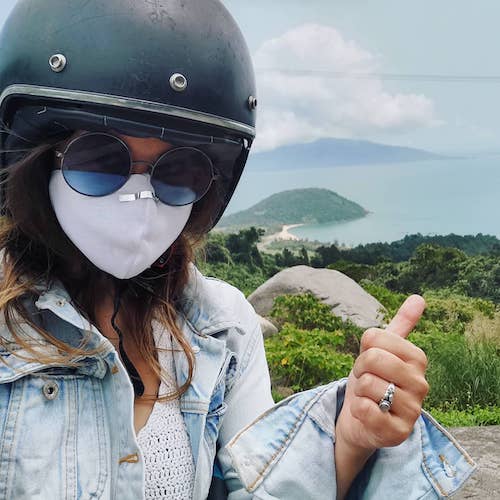
Adela, Spanish/Digital Nomad. July 2020 ~ “The only tourists in Vietnam at the moment are either those who were already in the country or Vietnamese nationals doing internal tourism. At the moment, the relationship of the locals with foreigners is back to normal, however during the months of March and April there was a sudden “fear” of foreigners, especially Westerners, and in some places (restaurants, hotels, bars, etc) we were denied entrance. Although at the moment everyone is as friendly and welcoming as it can be, the kids that live in our street still laugh and cover their faces when they see us. Many businesses have chosen to close due to the lack of tourists, but most touristic attractions are open and …less crowded than they will ever be!”
Tasha , American Digital Nomad. July 2020 ~ “Despite having a third the population of the U.S. and sharing a border with China, thanks to common sense, early action, and preventative measures, Vietnam has vanquished coronavirus. Cases peaked at less than 400, and now the virus is completely contained — there is no community spread. Borders remain closed to keep the virus out. Vietnam has done an excellent job with testing and contact tracing. The virus is completely gone from the general population, so we are living life as normal, going to restaurants and cafes.”
Even if you can’t go to Vietnam right now, you can still get started planning your Vietnam trip for the future.
Check out our other Vietnam travel resources: – Suggested Vietnam Itineraries: 10+ Days in Vietnam – A budget guide to Hoi An Vietnam – A budget guide to Ninh Binh – A budget guide to Hue – A budget guide to Hanoi – A budget guide to Mai Chau Vietnam – Central Vietnam Destinations and Itinerary
* Get our free Vietnam Travel Destinations e-guide *
If you have questions or updates about travel to Vietnam during the Coronavirus crisis or post-pandemic, please let us know in the comments below.
~ Pin this post for later or share with friends ~
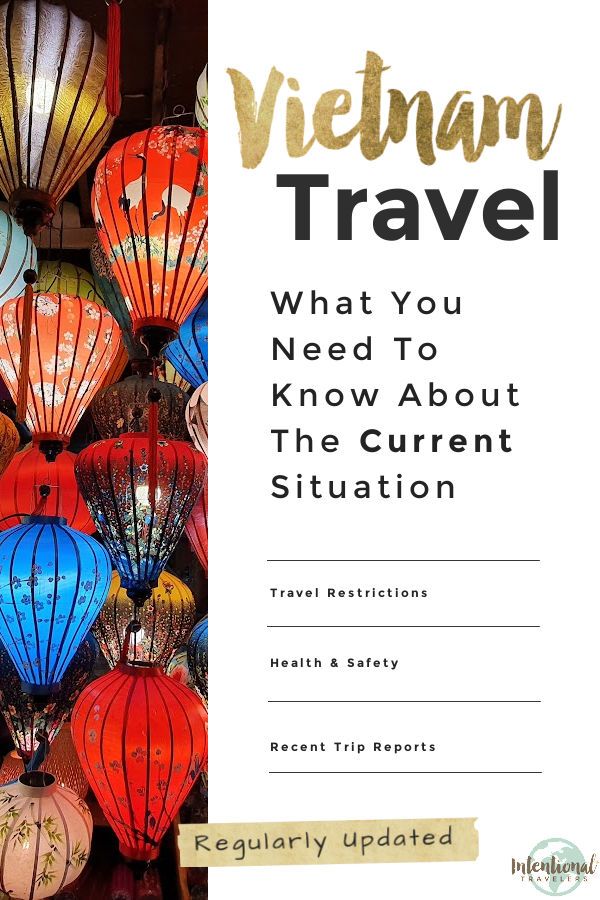
Disclaimer: Please note, travel restrictions change frequently. Readers must take responsibility for verifying information through official sources like the State Department and CDC, in respect to their specific situations. No responsibility can be accepted by Intentional Travelers for action or inaction as a result of information provided through IntentionalTravelers.com. Any information provided here is issued as general information only.
Similar Posts
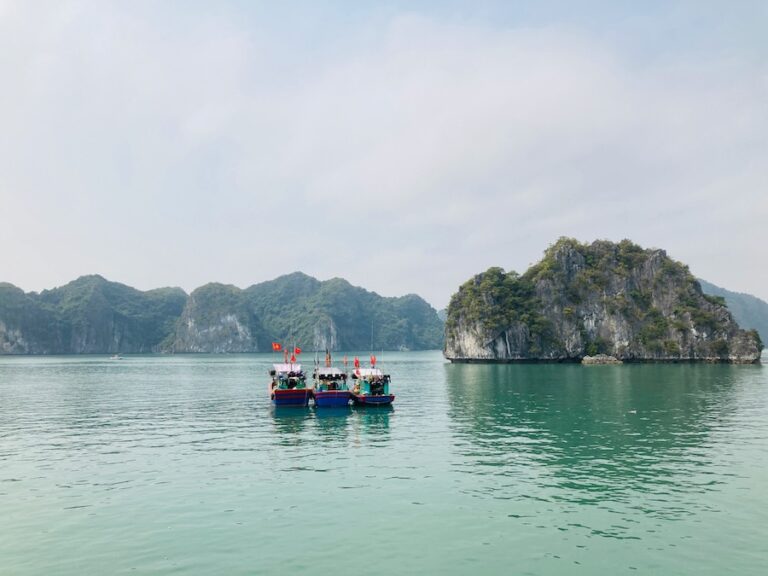
Cat Ba Island – Lan Ha – HaLong Bay Cruise Review + Tips
What is the best value for your money and time on a HaLong Bay cruise? These are our tips and full HaLong Bay cruise review to help you make the best choice. In this post, we share what we learned from our experience on Venezia Cruises 3-day 2-night Lan Ha Bay itinerary and from extensive research…
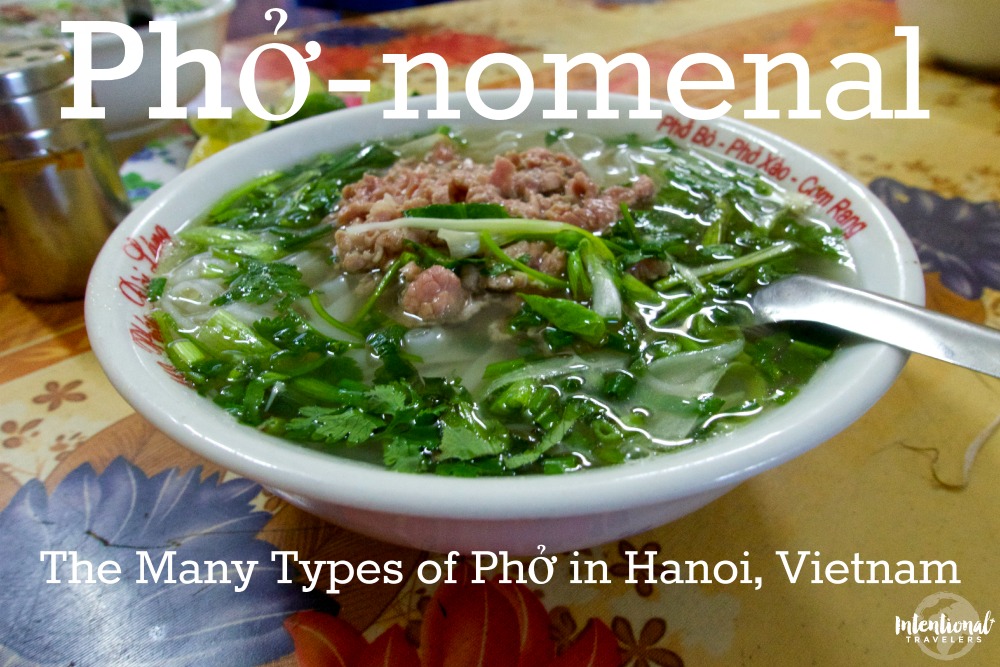
Phở-nomenal: The Many Types of Phở in Hanoi, Vietnam
Historians say that phở got its start in and around Hanoi at the turn of the century. So when we visited earlier this month, sampling the phở was high on our to do list. What is Phở? What we didn’t realize is that the Vietnamese noodle soup we’re familiar with from back home is just one kind of phở. The…
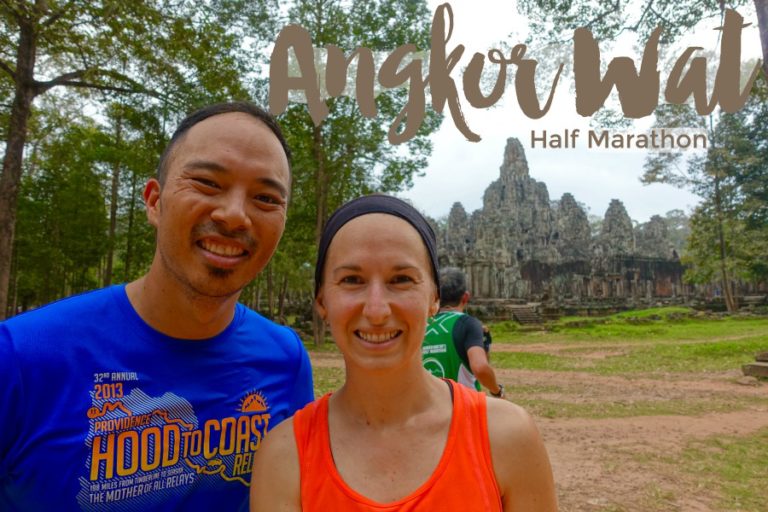
Angkor Wat Half Marathon: Race Review and Tips
The Angkor Wat Half Marathon and 10k Run is very special international running event that you may want to add to your bucket list. It’s a unique experience to run through ancient temple grounds with thousands of people from around the world! About the Angkor Wat Half Marathon What: Half marathon and 10k run (and…
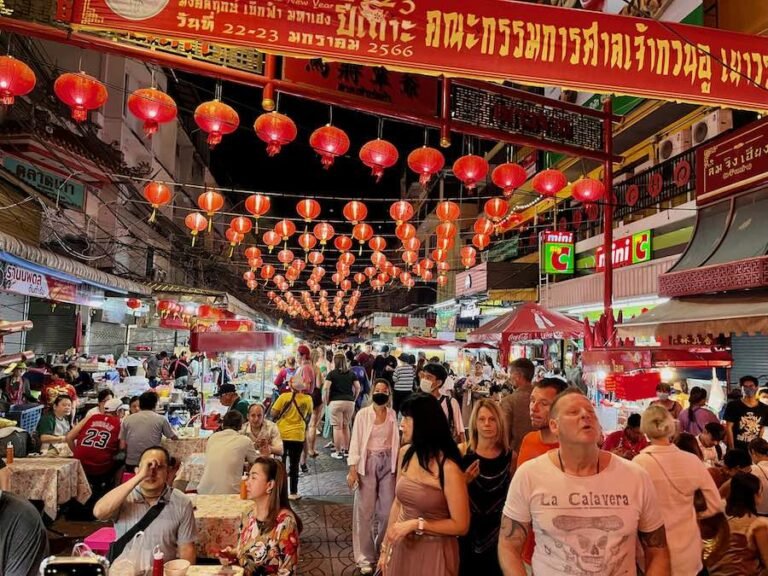
Is the Bangkok GoCity Pass worth it? Review & Best Uses
Will you be visiting Bangkok, Thailand? Bangkok is a huge city with a lot to offer, and it can be a little overwhelming even for seasoned travelers. The Bangkok GoCity Pass can be a great option to help you see the best of Bangkok with ease. We had the option to try it out for…
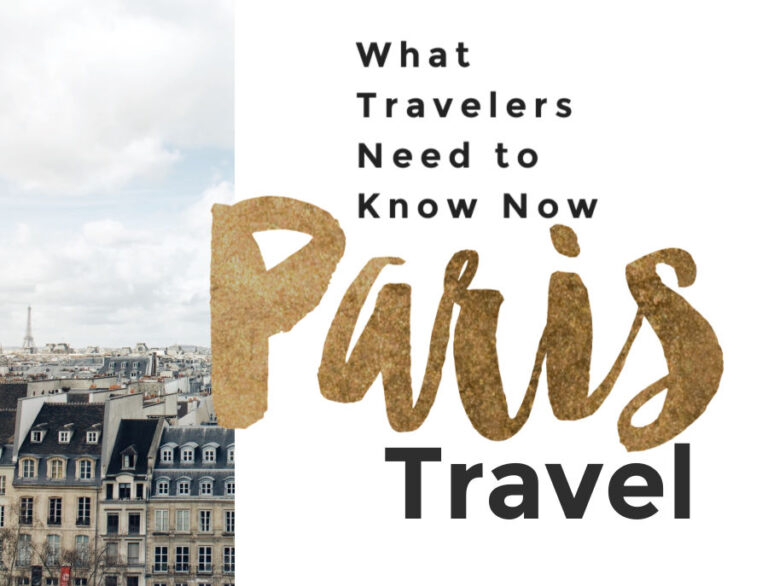
Paris France travel requirements 2024: What American travelers need to know
We aim to keep this post updated about Paris France travel in 2024 with official Paris travel restrictions, requirements, and health and safety guidance. Our goal is to help you make informed decisions so you can travel confidently, safely, and responsibly in this new post-pandemic world of ours. Paris is a destination close to our…
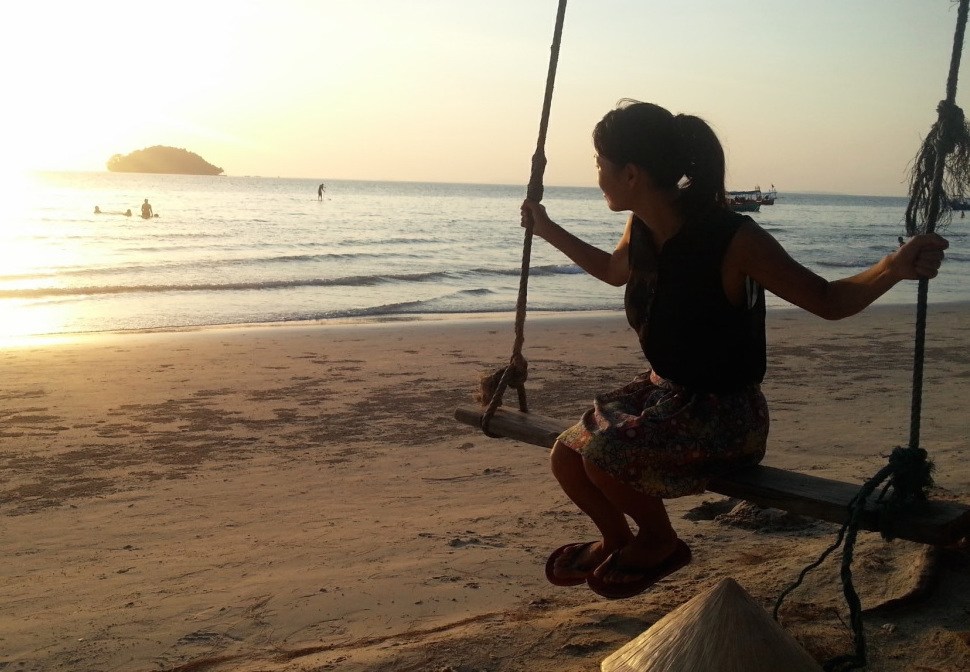
Here’s What Six Months of Travel in Southeast Asia and India Look Like
This is a guest post by fellow Intentional Traveler, Lianne Bronzo. She describes herself as a Korean-American adoptee who returned “home” to teach, travel, and discover who she is. She and her boyfriend, Adam, are avid budget travelers. They are currently serving in Zambia for the Peace Corps. Six months of travel overview Constantly being…
Hello: I’m wondering if someone could let me know where the cheapest COVID insurance is to be found (FOR VIETNAM.) Many thanks. I’m in Cambodia and wanting to travel there soon. It’s Dec. 1, 2022. I’m vaccinated and boosted, healthy, etc. Many thanks.
Hi Randy. We’re not experts in insurance, but we plan to use Safetywing, as mentioned in this post – it’s easy to apply for even when you’re already abroad, but the costs depends on your age and it includes additional benefits that Vietnam doesn’t require. There are online insurance quote comparison tools you could try, but I’m not aware of an insurance package specific to Vietnam travel.
I would like to know about Phase 2 travel in Vietnam in January 2022. Is Phase 1 and Phase 2 doing the same requirement such as taking Covid test within 72 hours as well as quarantine 7 days in the government facility during January 2022?
Hi Andy. Thanks for visiting our blog. There is very little information about the requirements for future phases so far, probably because everything is still in constant flux in Vietnam. We’ll do our best to update this post with details as they become available. It’s always possible the reopening dates could change and additional information may be released at the last minute.
Leave a Reply Cancel reply
Your email address will not be published. Required fields are marked *
This site uses Akismet to reduce spam. Learn how your comment data is processed .
You are using an outdated browser. Please upgrade your browser to improve your experience.
Vietnam Travel Requirements | Everything You Need To Know
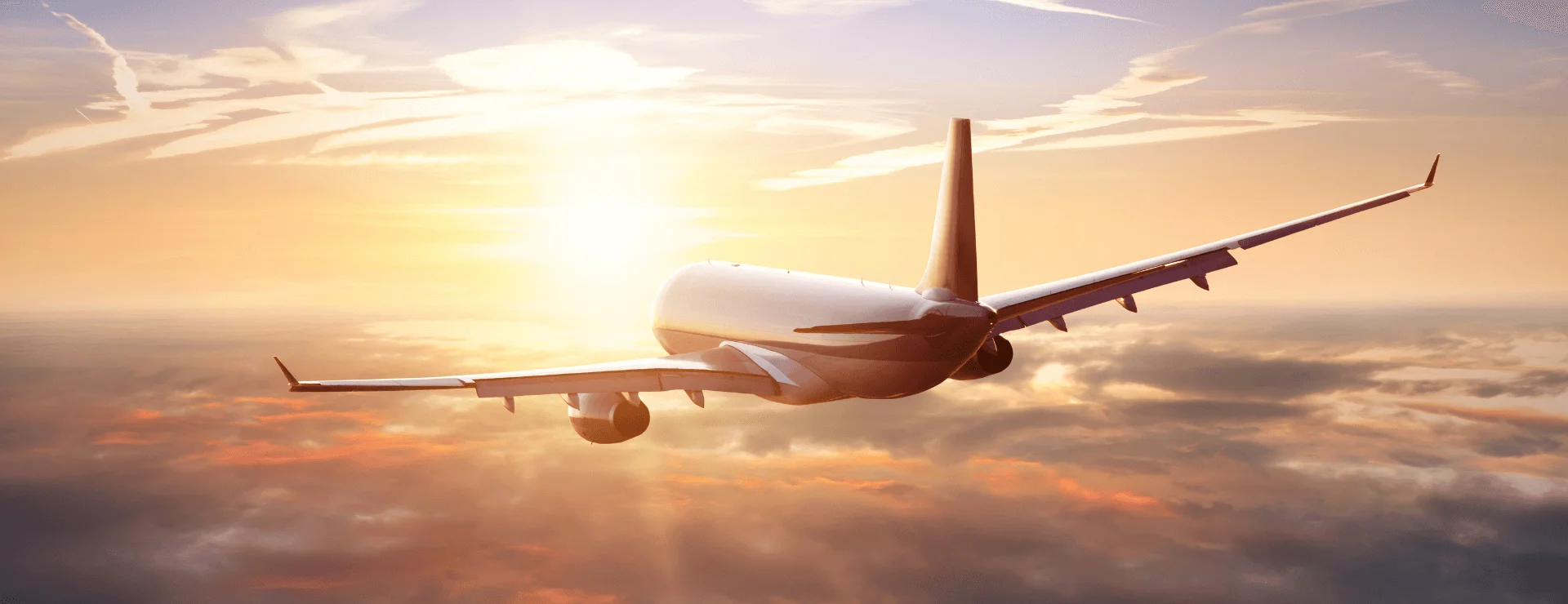
International travel to Vietnam has fully resumed. To make it easier for travelers to enter Vietnam while still upholding some health criteria, new entrance policies have been implemented. Learn more about the most recent Vietnam travel requirements , as well as tourist visa application guidance.

Visa Exempt
Visas are not required for tourists from the following countries, and they may remain for a specified number of days.
ASIA 14 days – Brunei, Myanmar. 15 days – Japan, South Korea (ROK). 21 days – The Philippines. 30 days – Cambodia, Indonesia, Laos, Malaysia, Singapore, Thailand.
EUROPE 15 days – Belarus, Denmark, Italy, Finland, France, Germany, Norway, Russia, Spain, Sweden, and The United Kingdom.
When you arrive in Vietnam, you can request a visa extension if you want to stay longer.
Visa Required
Visitors whose countries are not eligible for visa-exempt will have to apply for a Vietnam e-Visa, valid for 30 days. As of July 2020, Vietnam’s e-Visa is available to nationals of 80 countries .
The fee for an e-visa is $25 USD , and the processing time is 3 working days. The code to print your visa will be sent to you by email.
*The application fee of $25 USD is non-refundable, under any circumstance, regardless of the result.
Vietnam’s e-Visa Application Process
Please follow this guide to apply for a Vietnam’s e-Visa.
Vietnam’s e-Visa requirements
Prepare the following documents ahead of your application:
- A passport with six (6) months’ validity
- A photo in .jpg format of your full passport data page
- A passport photo in .jpg format (4×6, white background, without glasses)
- A valid international credit or debit card
- An email address for support purposes
- A temporary address within Vietnam
- Your entry and exit dates and entry and exit points/airports
- Travel insurance – medical/travel insurance with a $10,000 minimum coverage covers COVID-19 treatment. (usually, this costs around $40 USD .)
Steps to apply for Vietnam’s e-Visa
After you have got all the necessary documents, proceed with the application.
Step 1 : Go to the e-visa page or the National Immigration Web Portal . Choose ‘E-visa Issuance’ then click on the link for ‘Outside Vietnam foreigners’.
Step 2 : Fill out all of the essential fields on the form after uploading your.jpg pictures (passport data page and passport photo). Submit your form.
Step 3 : Pay the e-Visa fee of 25 USD. Copy down the document code provided.
Step 4 : You should receive an email notification of the status of your e-Visa application in three working days. If not, you can use this link to do a search for your e-Visa.
Step 5 : Find your e-Visa online with your document code. Download and print two copies of the e-Visa for added security.
You may enter the nation by any of the 28 international checkpoints , including eight international airports, using your current e-Visa. Please go here to get a complete list of the ports of entry, seaports, and airports that accept the e-Visa.
Other Notices Regarding Vietnam Travel Requirements
- Always double-check all the information on your e-Visa application form. The most common mistakes while submitting an e-Visa application for Vietnam are inputting the incorrect name and passport number, uploading wrong or low-quality photos, and selecting the wrong port of entry.
- If you have a visa exemption, such as for a period of 15 days, you may enter Vietnam, remain there, and then leave. You may then reenter Vietnam whenever you like and receive another 15 days.
- After you apply, e-visas typically take 3 days or up to 1 week. Make sure you apply early enough or you won’t get one before arriving.
- When you arrive, you can head straight to the immigration counter if you have an e-visa. If, however, you are exempt, head over to the counter for visas on arrival.
- Your visa will be stamped by an immigration official, who may also add the letters EV (electronic visa).
- To protect both yourself and others, you should follow common heath practices – such as regularly washing your hands, covering your nose and mouth when you sneeze or cough, and eating food that has been well prepared.
- Over the first 10 days of your stay in Vietnam, you must monitor your health. Call Vietnam’s health hotline at 1900 3228 as soon as you experience COVID-19 symptoms – fever, cough, or difficulty breathing.
Frequently Asked Questions
1. What if the Vietnam e-Visa application isn’t working properly? If you submitted your Vietnam e-Visa application incorrectly or there is a problem with it, you can send a message to the customer service representatives on the official website and detail the problem, such as incorrect information, a failed payment, or a forgotten registration code.
2. What if I provided invalid information on the Vietnam e-Visa application form?
The immigration department may ask for more information or, in unusual circumstances, may reject you if your application form is incomplete or contains inaccurate information.
If you need to supply more information for your Vietnam e-Visa, you will be contacted and asked to do so. Once you have submitted all the necessary data, the processing period will begin again.
3. What do I need to present upon arrival with the Vietnam e-Visa?
You must show a printed copy of the Vietnam e-Visa document you received (print from PDF) as well as your passport while entering Vietnam with your e-Visa.
4. Can I arrive on different dates than stated on the e-Visa?
You can arrive after the date of the entrance you specified on the Vietnam e-Visa application, but you cannot arrive earlier.
The days begin counting from the entry date you set after your visa is issued, regardless of whether it arrived late. Keep in mind that you must specify the exact arrival date when you apply.
5. Can I get an extension on my 30-day e-Visa?
Yes, but this can only be done from within Vietnam.
Let Us Help You Plan Your Vietnam Trip Don’t let the planning stress you out. Tell us your travel ideas and our travel advisors are very glad to give you suggestions and guidance for your trip planning. We offer personalized tours according to your interests and requirements and help to create the best Vietnam vacation for you.
You may also be interested in

- Sep 13, 2024
Where To Spend Thanksgiving Vacations In Southeast Asia With Families?
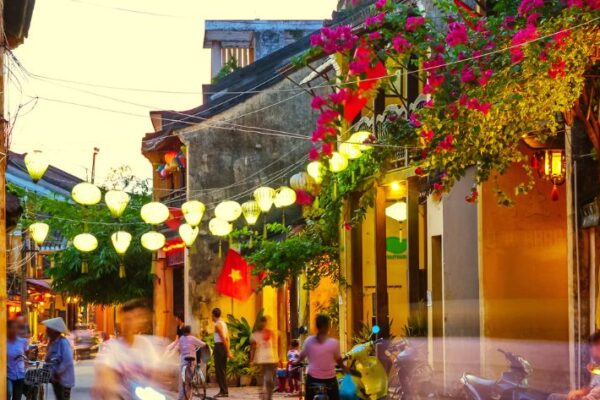
- Sep 10, 2024
A Complete Guide To The Ultimate Hoi An Tour Experience
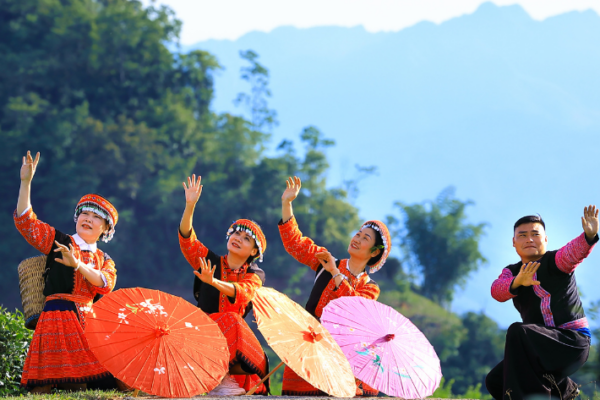
- Sep 6, 2024
Top 10 Popular Festivals in Vietnam: A Journey Through Culture and Celebration

- Privacy Overview
- Strictly Necessary Cookies
- 3rd Party Cookies
This website uses cookies so that we can provide you with the best user experience possible. Cookie information is stored in your browser and performs functions such as recognising you when you return to our website and helping our team to understand which sections of the website you find most interesting and useful.
Strictly Necessary Cookie should be enabled at all times so that we can save your preferences for cookie settings.
If you disable this cookie, we will not be able to save your preferences. This means that every time you visit this website you will need to enable or disable cookies again.
This website uses Google Analytics to collect anonymous information such as the number of visitors to the site, and the most popular pages.
Keeping this cookie enabled helps us to improve our website.
Please enable Strictly Necessary Cookies first so that we can save your preferences!
Cookies on GOV.UK
We use some essential cookies to make this website work.
We’d like to set additional cookies to understand how you use GOV.UK, remember your settings and improve government services.
We also use cookies set by other sites to help us deliver content from their services.
You have accepted additional cookies. You can change your cookie settings at any time.
You have rejected additional cookies. You can change your cookie settings at any time.
Entry requirements
This information is for people travelling on a full ‘British citizen’ passport from the UK. It is based on the UK government’s understanding of the current rules for the most common types of travel.
The authorities in Vietnam set and enforce entry rules. If you’re not sure how these requirements apply to you, contact the Vietnamese Embassy in the UK .
COVID-19 rules
There are no COVID-19 testing or vaccination requirements for travellers entering Vietnam.
Passport validity requirements
To enter Vietnam, your passport must have:
- an ‘expiry date’ at least 6 months after the date you arrive
- at least 2 blank pages
- no damage – British nationals have been denied entry and exit due to passport damage
Check with your travel provider that your passport and other travel documents meet requirements. Renew your passport if you need to.
You will be denied entry if you do not have a valid travel document or try to use a passport that has been reported lost or stolen.
It is a requirement of Vietnamese authorities that visitors enter and exit Vietnam using the same passport.
Make sure you get your passport stamped.
Check the visa expiry date written in your passport is correct before leaving border control. If it is wrong, you could be accused of overstaying. Your passport is stamped upon entry which will specify the date by which you need to leave Vietnam.
Visa requirements
You can visit Vietnam without a visa for up to 45 days for tourism or business.
If you want to stay longer than 45 days, you can:
- book with a travel agent in Vietnam and ask them to apply for a visa pre-approval letter – your agent will tell you when to collect your visa from the embassy
- apply for other visa types from the Vietnamese Embassy in the UK
- apply for an e-visa that allows a 90-day stay and multiple entries
E-visas restrict you to the entry and exit points you select when you apply. If you get an e-visa while in Vietnam, you must exit the country and re-enter to start your e-visa.
The British Embassy will not assist with visa extensions.
Work or study
If you want to work or study, check which type of visa or work permit you need with the Vietnam Immigration Department .
Read about visas and work permits if you live in Vietnam .
If you overstay your visa or work illegally, the authorities can prevent you from leaving until you pay a fine. You could be deported and prevented from visiting Vietnam in the future.
Travelling through Vietnam
If you transfer from an international flight to a domestic flight in Hanoi or Ho Chi Minh City, you must go through immigration and enter Vietnam. You must do this even if your final destination is outside Vietnam. Check with your airline before departing.
Exit requirements
You cannot leave Vietnam without a valid visa and must enter and exit Vietnam using the same passport.
Vietnamese authorities may place an exit ban on certain individuals to prevent them from leaving the country. Your passport will be seized until the case is fully investigated. If you are unable to leave the country because of an exit ban, consult a lawyer and contact your nearest British embassy or consulate.
An exit ban can relate to investigations into:
- an individual, their family or an employer
- criminal and civil matters, such as business disputes or motor vehicle accidents
- employment without a work visa
- unpaid financial debts
Vaccine requirements
For details about medical entry requirements and recommended vaccinations, see TravelHealthPro’s Vietnam guide
Customs rules
There are strict rules about goods you can take into or out of Vietnam . You must declare anything that may be prohibited or subject to tax or duty.
If you’re taking prescription medication into Vietnam, carry it in your hand luggage with a copy of the prescription. If it has a total import value greater than 100 US dollars, you must declare it at customs. For information about restrictions on medication, see Health .
Taking money into or out of Vietnam
If you’re taking cash into or out of Vietnam, you must declare amounts over:
- 15 million Vietnamese dong
- 5,000 US dollars (or the same value in other currencies)
If you’re leaving the country with more than these amounts, declare the money at customs and show either:
- confirmation you’re carrying cash abroad, issued by an authorised credit institution
- written approval to carry cash, issued by the State Bank of Vietnam
Related content
Is this page useful.
- Yes this page is useful
- No this page is not useful
Help us improve GOV.UK
Don’t include personal or financial information like your National Insurance number or credit card details.
To help us improve GOV.UK, we’d like to know more about your visit today. Please fill in this survey (opens in a new tab) .
- Culture - Sports
- Environment
- Destinations
- Media Center Mega Story Infographics Photos Videos Podcast
Detailed entry requirements for international visitors to Vietnam
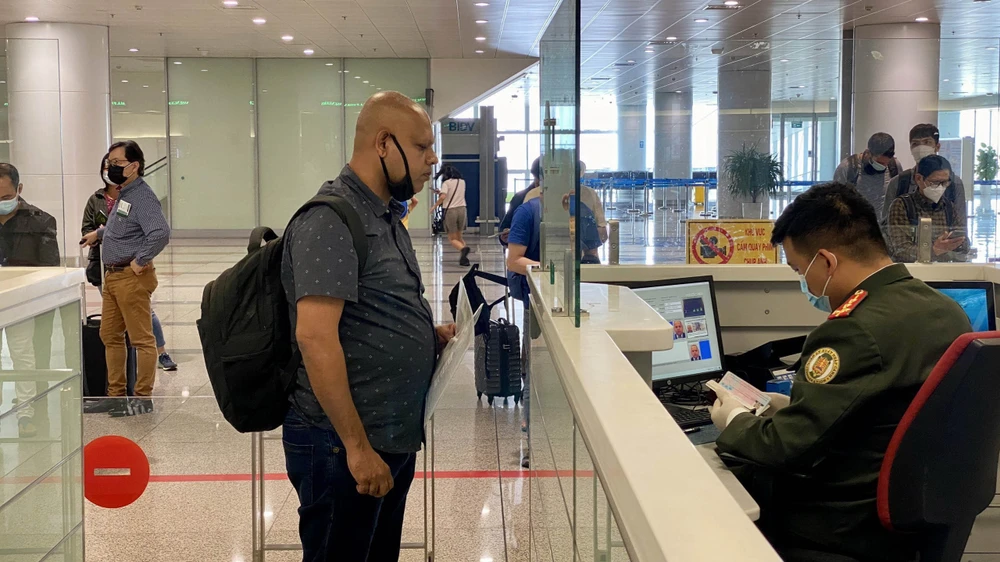
Related News
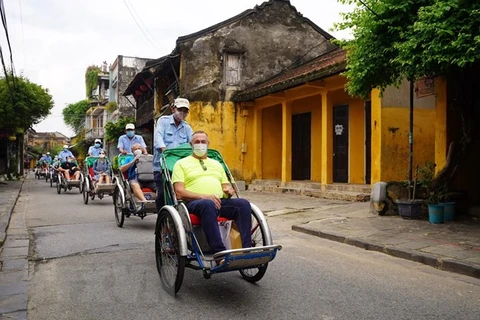
Health ministry asked to quickly adjust entry regulations
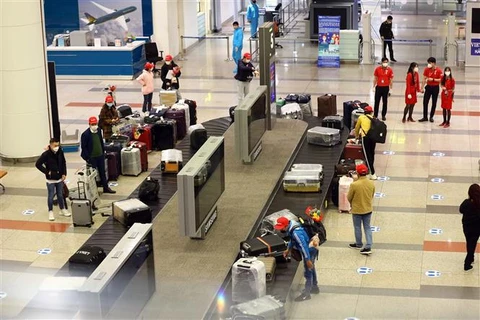
Vietnam reinstates pre-pandemic entry and exit procedures
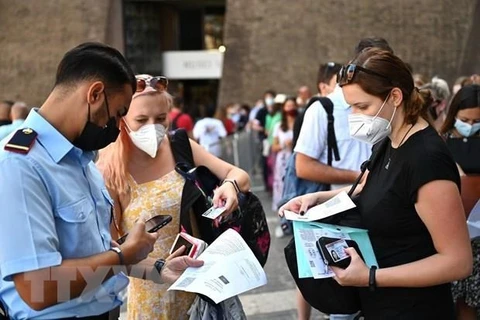
Spokeswoman gives more details on Vietnam’s plan to reopen to int’l visitors
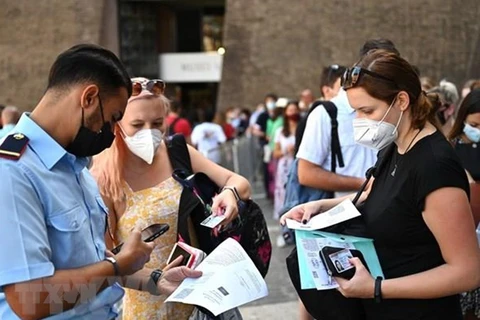
Ministry issues detailed guidance on entry regulations
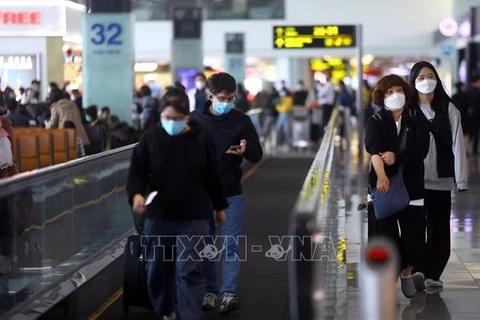
Vietnam now has easiest entry requirements in SEA: travel website

Vietnam attends major travel fair in France
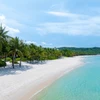
What to do in Phu Quoc – a Vietnamese Island you can visit without a visa
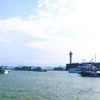
Ha Long city welcoming tourists back
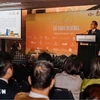
Quang Nam, Da Nang, Thua Thien-Hue promote tourism in Australia
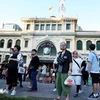
Vietnam ranks second among most favoured destinations for Koreans on Chuseok holidays


Measures discussed to leverage film-induced tourism in Vietnam

Environmental protection crucial in cave tourism activities: Experts
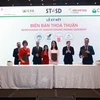
Switzerland supports Vietnam in tourism human resources training

Int’l Famtrip delegation makes field trip to Binh Thuan province

Quang Ninh eager to put Typhoon Yagi in rearview mirror to recover tourism
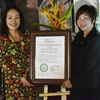
Ba Ria – Vung Tau’s tourist site goes carbon neutral
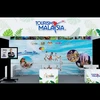
Malaysia introduces impressive tourism products at HCM City expo
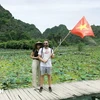
Vietnam hosts 1.43 million international tourists in August
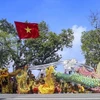
Hanoi tourist attractions to come alive during Autumn Festival
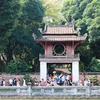
Vietnam wins big at World Travel Awards 2024
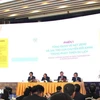
Forum seeks ways to achieve global target of net zero for tourism

International Travel Expo HCM City opens

HCM City int'l travel expo named best trade show in Asia
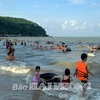
Visitors to Hai Phong surge during National Day holiday

Reasons why Phu Quoc is more attractive to Indian tourists
- Travel Advisories |
- Contact Us |
- MyTravelGov |
Find U.S. Embassies & Consulates
Travel.state.gov, congressional liaison, special issuance agency, u.s. passports, international travel, intercountry adoption, international parental child abduction, records and authentications, popular links, travel advisories, mytravelgov, stay connected, legal resources, legal information, info for u.s. law enforcement, replace or certify documents.
Share this page:
Vietnam Travel Advisory
Travel advisory july 24, 2023, vietnam - level 1: exercise normal precautions.
Reissued with obsolete COVID-19 page links removed. Exercise normal precautions in Vietnam.
Read the country information page for additional information on travel to Vietnam.
If you decide to travel to Vietnam:
- Enroll in the Smart Traveler Enrollment Program (STEP) to receive Alerts and make it easier to locate you in an emergency.
- Follow the Department of State on Facebook and Twitter .
- Review the Country Security Report for Vietnam.
- Visit the CDC page for the latest Travel Health Information related to your travel.
- Prepare a contingency plan for emergency situations. Review the Traveler’s Checklist .
Travel Advisory Levels
Assistance for u.s. citizens, vietnam map, search for travel advisories, external link.
You are about to leave travel.state.gov for an external website that is not maintained by the U.S. Department of State.
Links to external websites are provided as a convenience and should not be construed as an endorsement by the U.S. Department of State of the views or products contained therein. If you wish to remain on travel.state.gov, click the "cancel" message.
You are about to visit:
- Skip to main content
- Skip to "About this site"
Language selection
Search travel.gc.ca.
Help us to improve our website. Take our survey !
COVID-19: travel health notice for all travellers
Vietnam travel advice
Latest updates: Risk level – removed the advisory to avoid non-essential travel to the northeastern region’s coast to Vinh in North Central region; Natural disasters and climate – updated information about Typhoon Yagi
Last updated: September 8, 2024 11:22 ET
On this page
Safety and security, entry and exit requirements, laws and culture, natural disasters and climate, vietnam - exercise a high degree of caution.
Exercise a high degree of caution in Vietnam due to high rate of petty crime.
Back to top
Petty crime
Petty crime, such as pickpocketing and purse snatching, occurs frequently. It’s most prevalent in larger cities and may increase during major public holidays, such as Tet (Lunar New Year).
Criminals work alone or in groups and may use various techniques to distract you and steal your belongings. They may try to grab your bag and other valuables while passing on a motorbike or slash your bag in crowded streets and markets.
Theft is frequent:
- in popular tourist areas
- in markets, shopping centres and commercial streets
- on public transportation including sleeper trains
- in transportation hubs such as airports and train stations
- in restaurants, including patios and outdoor cafés
- at beaches and seaside destinations
While travelling:
- ensure that your belongings, including your passport and other travel documents, are secure at all times
- keep a digital copy of your identity and travel documents
- avoid showing signs of affluence or wearing expensive jewellery
- avoid carrying large sums of cash
- avoid isolated areas, especially at night
- pay attention to your surroundings, particularly in crowded and tourist areas
- be extra cautious when withdrawing cash from ATMs
Violent crime
Although violent crimes targeting foreigners are rarer, they may occur. In some cases, criminals have used weapons such as knives and razors. Threats of physical injury related to personal disputes also occasionally occur.
- If you are involved in a dispute, contact the police as soon as possible
- If you are threatened by robbers, don’t resist
Residential break-ins
Residential break-ins occur, especially in large cities and may increase before and during the Tet holiday (Lunar New Year). Burglars may target houses or apartments rented or owned by tourists and foreigners.
- Stay in accommodations with adequate security measures
- Make sure you lock doors and windows at night and when you’re away
Women’s safety
Women travelling alone may be subject to some forms of harassment and verbal abuse. Sexual assault and harassment do occur, including:
- in beach destinations
- in bars, nightclubs and entertainment districts
- on taxis and public transportation
Local authorities may not always respond adequately to reports of sexual violence and harassment. If you are a victim of sexual assault:
- seek immediate medical assistance, whether or not you appear to have been physically harmed
- contact the local police and ensure they file a report
- inform consular officials at the nearest Canadian embassy or consulate
Advice for women travellers
Credit card and ATM fraud
Credit and debit card as well as ATM fraud occurs frequently.
- Avoid using your credit card in small establishments
- Consider using a card with a small credit limit
- Cover the keypad with one hand when entering your PIN
- Pay careful attention when others are handling your cards
- Avoid using card readers with an irregular or unusual feature
- Use ATMs located in public areas or inside a bank or business
- Check for any unauthorized transactions on your account statements
Cybercrime occurs. Perpetrators may compromise public Wi-Fi networks to steal credit card or personal information.
- Avoid using unsecured public Wi-Fi networks
- Avoid making purchases on unencrypted websites
- Be cautious when posting information on social media
- Be especially vigilant if you decide to meet someone you met online
- Don’t click a suspicious link in an email or text message asking for your credit card details
At the airport
Criminals posing as taxi drivers have targeted foreign visitors at Nội Bài International Airport in Hanoi and robbed them by forcing them to withdraw money from ATMs.
Travellers have also been robbed by drivers who greeted them upon arrival with a placard showing their name.
- Arrange your pickup with your hotel before arrival, or use authorized airport taxis
- Confirm the driver’s identity and the licence plate before getting in the car
Gambling scams
Tourists have been victims of gambling scams in Hanoi, as well as in Ho Chi Minh City, particularly in the Pham Ngu Lao neighbourhood.
The scam consists of a friendly invitation sent to the victim to go to someone’s home in order to meet a relative interested in visiting Canada. While waiting for the relative, the scammers suggest a casual game of cards involving an initial small wager. Some victims have lost thousands of dollars over the course of an evening.
Be wary of unsolicited proposals from strangers.
If you’ve been scammed:
- get to a safe location immediately
- take note, as soon as possible, of the name and address of the facility where you were held
- notify the police and obtain a report
- if a bank card was involved, report the scam to your banking company, which will likely request a copy of the police report to cancel the transaction
Overseas fraud
Spiked food and drinks
Snacks, beverages, gum and cigarettes may contain drugs that could put you at risk of sexual assault and robbery.
- Be wary of accepting these items from new acquaintances
- Never leave food or drinks unattended or in the care of strangers
Unregulated alcohol
Some people died after consuming unregulated and adulterated rice wine due to high levels of methanol.
- Be cautious if you choose to drink alcohol
- Only consume reputable alcohol brands
- Avoid buying alcohol from individuals or street vendors
- Seek medical assistance if you begin to feel sick
Alcohol, drugs and travel
Demonstrations
Current situation in dak lak.
An increased police presence in Dak Lak continues, after organized attacks on a police station in June 2023.
If you are in the area, do not photograph security forces.
Public demonstrations are rare since local authorities don’t usually authorize them. Demonstrating without authorization can lead to heavy consequences, including lengthy prison sentences.
- Avoid areas where demonstrations and large gatherings are taking place
- Don’t photograph demonstrations
- Follow the instructions of local authorities
- Monitor local media for information on ongoing demonstrations
Mass gatherings (large-scale events)
Internet censorship and surveillance
Within the Vietnamese territory, local authorities block access to several:
- social media
- search engines
- online services
You shouldn’t expect internet privacy.
Local authorities may monitor your communications at any time. They may review the content stored or consulted on your electronic devices. They may also place certain foreigners under electronic surveillance. They can search your home or hotel room without your knowledge or consent.
Cyber security while travelling
Foreign journalists and other media workers in Vietnam may face considerable restrictions in the context of their work. The Vietnamese government may employ measures such as:
- physical and electronic surveillance
- delaying or refusing renewals of press cards and visas
- intimidation and harassment
Be particularly vigilant if researching or reporting on subjects critical of or sensitive to the government.
Landmines and war remnants
Landmines and unexploded ordnance still pose a serious risk in several areas, particularly:
- in the province of Quảng Trị
- along the border with Laos
- in North and Central Vietnam
Unmarked minefields are common. If you plan travelling outside of major tourist destinations:
- pay attention to signs indicating the possible presence of landmines
- remain on paved roads
- avoid open fields, roadside ditches, shoulders and unmarked trails
- report any suspicious items to local authorities
Adventure tourism
Outdoor activities, such as trekking, zip-lining, rock climbing, speleology, or parasailing and other adventure activities can be dangerous if unprepared. Trails are not always marked, and weather conditions can change rapidly, especially during the rainy season.
Tour operators may not always adhere to international safety standards.
If you intend to practice adventure tourism:
- never do so alone, and do not part with your expedition companions
- consider hiring an experienced guide from a reputable company
- obtain detailed information on your activity and on the environment in which you will be setting out
- buy travel insurance that includes helicopter rescue and medical evacuation
- ensure that your physical condition is good enough to meet the challenges of your activity
- avoid venturing off marked trails
- ensure that you’re adequately equipped and bring sufficient water
- stay informed about weather and other conditions that may pose a hazard
- refrain from using facilities or equipment if you have doubts on their safety
- inform a family member or friend of your itinerary
Water activities
Tidal changes and strong winds can cause hazardous currents and riptides.
Swimming and diving
Beaches are not always supervised.
Corals, sea urchins, jellyfish and other aquatic life found along reefs may be poisonous. A sting to the touch can cause poisoning or infection.
If you plan to dive:
- choose a reputable company
- always respect warning flags advising of dangerous conditions
- ask about the presence of dangerous species
- seek immediate medical attention in case of injury
- wear swimming shoes to protect yourself from reefs, rocks, corals or sea urchins
- keep a safe distance from boats and restricted areas
- avoid beaches or coastal areas during periods of severe weather warnings
- avoid diving into unknown waters, as hidden rocks or shallow depths can cause serious injury or death
- follow the advice of the local authorities
Boat accidents have occurred due to the overloading and poor maintenance of some vessels, including in Ha Long Bay.
- Choose a reputable boating company
- Ensure that your tour operator follows up-to-date safety regulations
- Don’t board vessels that appear overloaded or unseaworthy
Water safety abroad
Although rare in Vietnam, pirates commit attacks and armed robbery against ships in coastal waters.
Live piracy report - International Maritime Bureau
Road safety
Road safety is poor throughout the country.
Fatal accidents are frequent. They frequently involve motorcycle and pedestrians are commonly victims.
Always use elevated walkways or pedestrian bridges when available.
Road conditions
Road conditions are poor throughout the country.
Driving can be dangerous due to:
- poorly maintained roads and vehicles
- traffic jams and heavy traffic, especially in urban areas
- potholes
- slippery roads during the rainy season
Driving habits
Drivers don’t always respect traffic laws.
Some vehicles, especially motorcycles, drive against the flow of traffic and on the sidewalks.
If you plan to travel by car in Vietnam, you should consider hiring a driver.
If you choose to drive:
- always drive defensively
- avoid travelling after dark or during adverse weather conditions
- avoid driving a motorcycle
- Make sure you have proper insurance and a valid licence
Public transportation
Official taxis are generally safe.
Motorcycle taxis (known as “xe oms”) are not safe.
- Avoid motorcycle taxis
- Use only official taxis or a trusted ridesharing app
- Negotiate the fare in advance, or insist that the driver use the meter
- Never share a taxi with a stranger
- Be familiar with your hotel’s address and the neighbourhood to avoid being brought to a wrong location
Bus and coach accidents are common.
Trains are generally reliable.
Thefts have been reported on certain train lines, including sleeper trains.
Ticket stub is required to exit the train station. Passengers without a ticket stub will be required to pay the fare again.
Retain your ticket stub when travelling by train.
Ferry accidents have occurred due to the overloading and poor maintenance of some vessels, particularly on the line connecting Ho Chi Minh City to Vung Tau.
Don’t board vessels that appear overloaded or unseaworthy.
Transport within Vietnam - Vietnam Tourism
We do not make assessments on the compliance of foreign domestic airlines with international safety standards.
Information about foreign domestic airlines
Every country or territory decides who can enter or exit through its borders. The Government of Canada cannot intervene on your behalf if you do not meet your destination’s entry or exit requirements.
We have obtained the information on this page from the Vietnamese authorities. It can, however, change at any time.
Verify this information with the Foreign Representatives in Canada .
Entry requirements vary depending on the type of passport you use for travel.
Before you travel, check with your transportation company about passport requirements. Its rules on passport validity may be more stringent than the country’s entry rules.
Regular Canadian passport
Your passport must be valid at least 6 months beyond the date you expect to leave Vietnam.
Passport for official travel
Different entry rules may apply.
Official travel
Passport with “X” gender identifier
While the Government of Canada issues passports with an “X” gender identifier, it cannot guarantee your entry or transit through other countries. You might face entry restrictions in countries that do not recognize the “X” gender identifier. Before you leave, check with the closest foreign representative for your destination.
Other travel documents
Different entry rules may apply when travelling with a temporary passport or an emergency travel document. Before you leave, check with the closest foreign representative for your destination.
Useful links
- Foreign Representatives in Canada
- Canadian passports
Tourist visa: required Business visa: required Student visa: required Work visa: required
E-visa authorization
If you have a valid Canadian passport, you may be eligible to apply online for an e-visa. This can be a single-entry or multiple-entry electronic tourist visa, valid for a maximum of 90 days. It allows you to enter Vietnam via the port of entry indicated in the visa approval notice only. Some restrictions apply.
For visits longer than 90 days, you must get a visa from the nearest Vietnamese embassy before departure.
Apply for an e-visa - Immigration Department of Vietnam
Visa exemptions
Canadian spouses or children of Vietnamese citizens may be eligible for a visa exemption certificate.
Contact the Embassy of Vietnam in Canada for more information on this process.
Visa extension
You must have a visa to enter Vietnam.
If required, you can request a visa extension at:
- the Vietnam Immigration Department in Hanoi or Ho Chi Minh City
- certain local travel agencies and tour companies
Vietnamese visas in expired Canadian passports are not valid. The visa needs to be transferred to the new passport.
Overstaying your Vietnamese visa or having the wrong type of visa is a serious matter. You may be delayed from onward travel until a fine is paid.
Check the visa validity and conditions carefully.
Registration
You must report your presence to local authorities upon arrival.
Commercial accommodations will generally file the declaration on your behalf. If you're staying in a non-commercial accommodation, you must do so with the nearest police station.
Make sure you request the return of your passport once it has been registered by hotel staff.
The hotel staff may ask to see your passport at check-in. They may make copies of it. They may also insist on holding your passport until you leave. There is no legal reason for this.
- Never leave your passport or any other ID document with anyone
- Ask for your documents to be returned to you as soon as check-in is complete
Travel restrictions
Travel near military facilities is restricted:
- in some parts of the central highlands
- in some border area
If you wish to visit a village, commune or ward that is close to the border, you must obtain permission from the provincial police department.
Contact the relevant local authority to confirm these requirements.
Health screening
Upon entry, you may be subject to a body temperature check.
Vietnamese authorities may place an exit ban on certain individuals to prevent them from leaving the country.
An exit ban can relate to investigations into:
- an individual, their family or an employer
- criminal and civil matters, such as business disputes or motor vehicle accidents
- employment without a valid work permit
- unpaid financial debts
It is difficult to obtain information on bans from Vietnamese authorities. An exit ban can be requested by people involved in any of these circumstances. You may not be aware that authorities have placed an exit ban on you until you try to leave the country. Your passport may be seized until the case is fully investigated and settled.
If you're unable to leave the country because of an exit ban, consult a lawyer and contact the closest office of the Government of Canada.
- Children and travel
Learn more about travelling with children .
Yellow fever
Learn about potential entry requirements related to yellow fever (vaccines section).
Relevant Travel Health Notices
- Global Measles Notice - 13 March, 2024
- Zika virus: Advice for travellers - 31 August, 2023
- COVID-19 and International Travel - 13 March, 2024
This section contains information on possible health risks and restrictions regularly found or ongoing in the destination. Follow this advice to lower your risk of becoming ill while travelling. Not all risks are listed below.
Consult a health care professional or visit a travel health clinic preferably 6 weeks before you travel to get personalized health advice and recommendations.
Routine vaccines
Be sure that your routine vaccinations , as per your province or territory , are up-to-date before travelling, regardless of your destination.
Some of these vaccinations include measles-mumps-rubella (MMR), diphtheria, tetanus, pertussis, polio, varicella (chickenpox), influenza and others.
Pre-travel vaccines and medications
You may be at risk for preventable diseases while travelling in this destination. Talk to a travel health professional about which medications or vaccines may be right for you, based on your destination and itinerary.
Yellow fever is a disease caused by a flavivirus from the bite of an infected mosquito.
Travellers get vaccinated either because it is required to enter a country or because it is recommended for their protection.
- There is no risk of yellow fever in this country.
Country Entry Requirement*
- Proof of vaccination is not required to enter this country.
Recommendation
- Vaccination is not recommended.
* It is important to note that country entry requirements may not reflect your risk of yellow fever at your destination. It is recommended that you contact the nearest diplomatic or consular office of the destination(s) you will be visiting to verify any additional entry requirements.
About Yellow Fever
Yellow Fever Vaccination Centres in Canada
There is a risk of hepatitis A in this destination. It is a disease of the liver. People can get hepatitis A if they ingest contaminated food or water, eat foods prepared by an infectious person, or if they have close physical contact (such as oral-anal sex) with an infectious person, although casual contact among people does not spread the virus.
Practise safe food and water precautions and wash your hands often. Vaccination is recommended for all travellers to areas where hepatitis A is present.
Measles is a highly contagious viral disease. It can spread quickly from person to person by direct contact and through droplets in the air.
Anyone who is not protected against measles is at risk of being infected with it when travelling internationally.
Regardless of where you are going, talk to a health care professional before travelling to make sure you are fully protected against measles.
Japanese encephalitis is a viral infection that can cause swelling of the brain. It is spread to humans through the bite of an infected mosquito. Risk is very low for most travellers. Travellers at relatively higher risk may want to consider vaccination for JE prior to travelling.
Travellers are at higher risk if they will be:
- travelling long term (e.g. more than 30 days)
- making multiple trips to endemic areas
- staying for extended periods in rural areas
- visiting an area suffering a JE outbreak
- engaging in activities involving high contact with mosquitos (e.g., entomologists)
Hepatitis B is a risk in every destination. It is a viral liver disease that is easily transmitted from one person to another through exposure to blood and body fluids containing the hepatitis B virus. Travellers who may be exposed to blood or other bodily fluids (e.g., through sexual contact, medical treatment, sharing needles, tattooing, acupuncture or occupational exposure) are at higher risk of getting hepatitis B.
Hepatitis B vaccination is recommended for all travellers. Prevent hepatitis B infection by practicing safe sex, only using new and sterile drug equipment, and only getting tattoos and piercings in settings that follow public health regulations and standards.
Malaria is a serious and sometimes fatal disease that is caused by parasites spread through the bites of mosquitoes. There is a risk of malaria in certain areas and/or during a certain time of year in this destination.
Antimalarial medication may be recommended depending on your itinerary and the time of year you are travelling. Consult a health care professional or visit a travel health clinic before travelling to discuss your options. It is recommended to do this 6 weeks before travel, however, it is still a good idea any time before leaving. Protect yourself from mosquito bites at all times: • Cover your skin and use an approved insect repellent on uncovered skin. • Exclude mosquitoes from your living area with screening and/or closed, well-sealed doors and windows. • Use insecticide-treated bed nets if mosquitoes cannot be excluded from your living area. • Wear permethrin-treated clothing. If you develop symptoms similar to malaria when you are travelling or up to a year after you return home, see a health care professional immediately. Tell them where you have been travelling or living.
In this destination, rabies is carried by dogs and some wildlife, including bats. Rabies is a deadly disease that spreads to humans primarily through bites or scratches from an infected animal. While travelling, take precautions , including keeping your distance from animals (including free-roaming dogs), and closely supervising children.
If you are bitten or scratched by an animal while travelling, immediately wash the wound with soap and clean water and see a health care professional. Rabies treatment is often available in this destination.
Before travel, discuss rabies vaccination with a health care professional. It may be recommended for travellers who are at high risk of exposure (e.g., occupational risk such as veterinarians and wildlife workers, children, adventure travellers and spelunkers, and others in close contact with animals).
Coronavirus disease (COVID-19) is an infectious viral disease. It can spread from person to person by direct contact and through droplets in the air.
It is recommended that all eligible travellers complete a COVID-19 vaccine series along with any additional recommended doses in Canada before travelling. Evidence shows that vaccines are very effective at preventing severe illness, hospitalization and death from COVID-19. While vaccination provides better protection against serious illness, you may still be at risk of infection from the virus that causes COVID-19. Anyone who has not completed a vaccine series is at increased risk of being infected with the virus that causes COVID-19 and is at greater risk for severe disease when travelling internationally.
Before travelling, verify your destination’s COVID-19 vaccination entry/exit requirements. Regardless of where you are going, talk to a health care professional before travelling to make sure you are adequately protected against COVID-19.
Safe food and water precautions
Many illnesses can be caused by eating food or drinking beverages contaminated by bacteria, parasites, toxins, or viruses, or by swimming or bathing in contaminated water.
- Learn more about food and water precautions to take to avoid getting sick by visiting our eat and drink safely abroad page. Remember: Boil it, cook it, peel it, or leave it!
- Avoid getting water into your eyes, mouth or nose when swimming or participating in activities in freshwater (streams, canals, lakes), particularly after flooding or heavy rain. Water may look clean but could still be polluted or contaminated.
- Avoid inhaling or swallowing water while bathing, showering, or swimming in pools or hot tubs.
Travellers' diarrhea is the most common illness affecting travellers. It is spread from eating or drinking contaminated food or water.
Risk of developing travellers' diarrhea increases when travelling in regions with poor standards of hygiene and sanitation. Practise safe food and water precautions.
The most important treatment for travellers' diarrhea is rehydration (drinking lots of fluids). Carry oral rehydration salts when travelling.
Typhoid is a bacterial infection spread by contaminated food or water. Risk is higher among children, travellers going to rural areas, travellers visiting friends and relatives or those travelling for a long period of time.
Travellers visiting regions with a risk of typhoid, especially those exposed to places with poor sanitation, should speak to a health care professional about vaccination.
Insect bite prevention
Many diseases are spread by the bites of infected insects such as mosquitoes, ticks, fleas or flies. When travelling to areas where infected insects may be present:
- Use insect repellent (bug spray) on exposed skin
- Cover up with light-coloured, loose clothes made of tightly woven materials such as nylon or polyester
- Minimize exposure to insects
- Use mosquito netting when sleeping outdoors or in buildings that are not fully enclosed
To learn more about how you can reduce your risk of infection and disease caused by bites, both at home and abroad, visit our insect bite prevention page.
Find out what types of insects are present where you’re travelling, when they’re most active, and the symptoms of the diseases they spread.
There is a risk of chikungunya in this country. The level of risk may vary by:
The virus that causes chikungunya is spread through the bite of an infected mosquito. It can cause fever and pain in the joints. In some cases, the joint pain can be severe and last for months or years.
Protect yourself from mosquito bites at all times.
Learn more:
Insect bite and pest prevention Chikungunya
- In this country, dengue is a risk to travellers. It is a viral disease spread to humans by mosquito bites.
- Dengue can cause flu-like symptoms. In some cases, it can lead to severe dengue, which can be fatal.
- The level of risk of dengue changes seasonally, and varies from year to year. The level of risk also varies between regions in a country and can depend on the elevation in the region.
- Mosquitoes carrying dengue typically bite during the daytime, particularly around sunrise and sunset.
- Protect yourself from mosquito bites . There is no vaccine or medication that protects against dengue.
Animal precautions
Some infections, such as rabies and influenza, can be shared between humans and animals. Certain types of activities may increase your chance of contact with animals, such as travelling in rural or forested areas, camping, hiking, and visiting wet markets (places where live animals are slaughtered and sold) or caves.
Travellers are cautioned to avoid contact with animals, including dogs, livestock (pigs, cows), monkeys, snakes, rodents, birds, and bats, and to avoid eating undercooked wild game.
Closely supervise children, as they are more likely to come in contact with animals.
Human cases of avian influenza have been reported in this destination. Avian influenza is a viral infection that can spread quickly and easily among birds and in rare cases it can infect mammals, including people. The risk is low for most travellers.
Avoid contact with birds, including wild, farm, and backyard birds (alive or dead) and surfaces that may have bird droppings on them. Ensure all poultry dishes, including eggs and wild game, are properly cooked.
Travellers with a higher risk of exposure include those:
- visiting live bird/animal markets or poultry farms
- working with poultry (such as chickens, turkeys, domestic ducks)
- hunting, de-feathering, field dressing and butchering wild birds and wild mammals
- working with wild birds for activities such as research, conservation, or rehabilitation
- working with wild mammals, especially those that eat wild birds (e.g., foxes)
All eligible people are encouraged to get the seasonal influenza shot, which will protect them against human influenza viruses. While the seasonal influenza shot does not prevent infection with avian influenza, it can reduce the chance of getting sick with human and avian influenza viruses at the same time.
Person-to-person infections
Stay home if you’re sick and practise proper cough and sneeze etiquette , which includes coughing or sneezing into a tissue or the bend of your arm, not your hand. Reduce your risk of colds, the flu and other illnesses by:
- washing your hands often
- avoiding or limiting the amount of time spent in closed spaces, crowded places, or at large-scale events (concerts, sporting events, rallies)
- avoiding close physical contact with people who may be showing symptoms of illness
Sexually transmitted infections (STIs) , HIV , and mpox are spread through blood and bodily fluids; use condoms, practise safe sex, and limit your number of sexual partners. Check with your local public health authority pre-travel to determine your eligibility for mpox vaccine.
Tuberculosis is an infection caused by bacteria and usually affects the lungs.
For most travellers the risk of tuberculosis is low.
Travellers who may be at high risk while travelling in regions with risk of tuberculosis should discuss pre- and post-travel options with a health care professional.
High-risk travellers include those visiting or working in prisons, refugee camps, homeless shelters, or hospitals, or travellers visiting friends and relatives.
Medical services and facilities
Good health care is limited. The quality of care varies greatly throughout the country.
Both medical facilities and supplies are limited outside of Hanoi and Ho Chi Minh City.
Private clinics and hospitals are usually better equipped. Services can be expensive, but they usually have qualified medical staff who speak English or French well. Emergency and ambulance services response times may be slow du to traffic congestion. In case of emergency, you may consider taking a taxi or private vehicle to go to the hospital rather than wait for an ambulance.
Medical evacuation is very expensive. You may need it to neighbouring countries in case of serious illness or injury.
Make sure you get travel insurance that includes coverage for medical evacuation and hospital stays.
Health and safety outside Canada
If you take prescription medication, you’re responsible for determining their legality in Vietnam.
- Bring sufficient quantities of your medication with you
- Always keep your medication in the original container
- Pack your medication in your carry-on luggage
- Carry a copy of your prescriptions
You must abide by local laws.
Learn about what you should do and how we can help if you are arrested or detained abroad .
No transfer of offenders treaty exists between Canada and Vietnam. If you’re convicted of a serious crime, you must serve your jail sentence in Vietnam. You may also have to remain in Vietnam for a parole period after your release.
Penalties for possession, use, production or trafficking of drugs, including cannabis, are severe. Convicted offenders can expect heavy fines, jail sentences or the death penalty.
Drugs, alcohol and travel
Identification
Local authorities may request to see your ID at any time.
- Carry valid identification or a photocopy of it at all times
- Keep a photocopy of your passport in a safe place in case it’s lost or seized
- Keep a digital copy of your ID and travel documents
Gambling outside of licensed casinos is illegal in Vietnam.
You must hold of a foreign passport to gamble in these licensed establishments.
Political activities
There are severe restrictions on political activities, including:
- participating in public protests
- publishing messages critical of the government on social media
If you engage in political activities you may face detention, deportation and travel ban to Vietnam in the future.
Photography
Photography of sensitive installations is prohibited. This includes:
- military sites
- border crossings
These sensitive areas are not always identified.
- Refrain from photographing military installations or personnel even if no sign is posted
- Comply with all requests from local authorities
Religious activities
There are restrictions on certain religious activities, such as preaching, distributing literature and associating with unapproved religious groups.
Sexual and intimate activities
As a foreigner, you are not allowed to invite Vietnamese nationals of the opposite sex into your hotel room to stay overnight unless you are married.
You are allowed to stay with a Vietnamese family only if you have obtained permission from local authorities.
Importation, possession and distribution of pornographic material is illegal.
Exportation of antiques
Vietnamese law restricts the export of antiques, but these laws are vague and unevenly enforced. If you purchase items that may be considered as antiques:
- keep receipts and all paperwork provided by the seller
- ensure you have the proper exportation permits from the Ministry of Culture, Sports and Tourism and the Vietnam General Department of Customs
If you can't present the required paperwork, the items may be confiscated.
Ministry of Culture, Sports and Tourism of Vietnam (in Vietnamese)
Dress and behaviour
The Vietnamese society is conservative.
When visiting religious and culturally places to avoid offending local sensitivities:
- dress conservatively
- behave discreetly
- respect religious and social traditions
- seek permission from locals before photographing them
Tet celebrations
The lunar new year is celebrated between the end of January and the end of February. Theses celebrations usually last several days and can have an impact on the availability and provision of essential services such as:
- banking services
- public services including healthcare
- food distribution
Plan your trip accordingly if you travel to Vietnam during this period.
Dual citizenship
Dual citizenship is not legally recognized in Vietnam.
If local authorities consider you a citizen of Vietnam, they may refuse to grant you access to Canadian consular services. This will prevent us from providing you with those services.
Dual citizens
Mandatory military service
Canadians with Vietnamese citizenship may be subject to mandatory military service and other national obligations.
Confirm this requirement before travelling to Vietnam.
International Child Abduction
The Hague Convention on the Civil Aspects of International Child Abduction is an international treaty. It can help parents with the return of children who have been removed to or retained in certain countries in violation of custody rights. It does not apply between Canada and Vietnam.
If your child was wrongfully taken to, or is being held in Vietnam by an abducting parent:
- act as quickly as you can
- consult a lawyer in Canada and in Vietnam to explore all the legal options for the return of your child
- report the situation to the nearest Canadian government office abroad or to the Vulnerable Children's Consular Unit at Global Affairs Canada by calling the Emergency Watch and Response Centre
If your child was removed from a country other than Canada, consult a lawyer to determine if The Hague Convention applies.
Be aware that Canadian consular officials cannot interfere in private legal matters or in another country's judicial affairs.
- International Child Abductions: A guide for affected parents
- Canadian embassies and consulates by destination
- Request emergency assistance
Doing business in Vietnam
Disputes related to business agreements or arrangements are costly and take time to resolve. You may be subject to a travel ban restricting you from leaving the country until matters are resolved.
If you plan on doing business in Vietnam:
- seek legal advice in Canada and in Vietnam before making commitments
- choose your own lawyer
- ensure that all documents are translated so that conditions, terms and limitations are well understood
There are many teaching opportunities in Vietnam. However, make sure you are well informed before signing a contract.
- Consult a local lawyer or professional
- Ensure that the contract specifies the maximum number of classroom hours per day and per week, maximum workdays per week, and vacation periods
- Confirm the living arrangements if any are included
- Ensure that you possess the right visa for the activities you will perform
- Ensure you understand any liabilities linked to early termination of a contract
You must hold a valid Vietnamese driver's licence to drive a vehicle with an engine of 50CC or more. This includes most motorcycles. Motorcycle drivers and passengers must wear a helmet.
The country has a zero-tolerance policy for drinking and driving or cycling. Penalties for drinking and driving or cycling include:
- licence suspension
- heavy fines
If you are involved in a traffic accident as a driver, you may:
- face criminal charges as a driver
- have to pay compensation to the victims
- face a travel ban preventing you from leaving the country until compensation is paid
There are restrictions on vehicles crossing from and into neighbouring countries.
Contact the Department of Transport in Hanoi or Ho Chi Minh City for information on for licences or restrictions.
Department of Transport in Ho Chi Minh City (in Vietnamese)
The currency of Vietnam is the Vietnamese dong (VND).
Cash declarations
Upon arrival, you must declare if you have:
- more than 15 million Vietnamese dong, more than US$5,000, or the equivalent in any other currency, in cash
- more than 300 grams of gold, including jewellery, gold bar and raw gold
Upon departure, you must:
- declare if you have more than 15 million Vietnamese dong, more than US$5,000, or the equivalent in any other currency, in cash
- present a written approval to carry foreign currency or Vietnamese dong in cash abroad, issued by an authorized Vietnamese credit institution in accordance with the laws on foreign exchange control or the State Bank of Vietnam
Rainy season
The rainy season extends:
- from June to September in the north and south
- from October to December in central Vietnam
Seasonal flooding occurs in October and November in central Vietnam. It’s also common:
- in and around Hanoi, particularly along the Red River
- in the Mekong River Delta regions in the south
Seasonal flooding can hamper overland travel and reduce the provision of essential services. Roads may become impassable due to mudslides and landslides. Bridges, buildings, and infrastructure may be damaged.
- Remain vigilant, especially in areas around major rivers
- Stay away from flooded areas
- Monitor weather reports
- Monitor local media for the latest updates, including those on road conditions
- Follow the instructions of local authorities, including evacuation orders
- Mekong Flood and Drought Forecasting - Mekong River Commission
- Forecasting - National Center for Hydro-Meteorological Forecasting
Typhoon Yagi
Typhoon Yagi made landfall on the eastern coast of Vietnam, in the provinces of Quang Ninh and Haiphong on September 7, 2024.
There are reports of casualties and significant damage.
There could still be significant disruptions to the following essential services:
- transportation, including operations at airports
- power distribution
- water and food supply
- telecommunications networks
- emergency services
- medical care
If you are in the affected areas:
- exercise caution
- monitor local news and weather reports
- follow the instructions of local authorities
Typhoons usually occur from June and December. During this period, even small tropical storms can quickly develop into major typhoons.
These severe storms can put you at risk and hamper the provision of essential services.
If you decide to travel to Vietnam during this period:
- know that you may expose yourself to serious safety risks
- be prepared to change your travel plans on short notice, including cutting short or cancelling your trip
- stay informed of the latest regional weather forecasts
- carry emergency contact information for your airline or tour operator
- follow the advice and instructions of local authorities
- Tornadoes, cyclones, hurricanes, typhoons and monsoons
- Large-scale emergencies abroad
Humidity and heat may be severe, particularly during the rainy season.
Know the symptoms of dehydration and heatstroke, which can both be fatal.
Forest fires may occur.
The air quality in areas near active fires may deteriorate due to heavy smoke.
In case of a major fire:
- stay away from affected areas, particularly if you suffer from respiratory ailments
- follow the instructions of local emergency services personnel
- monitor local media to stay informed on the evolving situation
Air pollution
Smog and other types of air pollution can be hazardous in urban areas. Air quality can also be affected in rural areas due to agricultural burning.
Air pollution levels can change quickly.
During periods of high pollution:
- limit your outdoor activities, especially if you suffer from respiratory ailments or have pre-existing medical conditions
- monitor local media
- Air pollution in Hanoi - World Air Quality Index
- Air pollution in Ho Chi Minh City - World Air Quality Index
Local services
In case of emergency, dial:
- police: 113
- medical assistance: 115
- firefighters: 114
Consular assistance
For emergency consular assistance, call the Embassy of Canada to Vietnam, in Hanoi, or the Consulate General of Canada to Vietnam, in Ho Chi Minh City, and follow the instructions. At any time, you may also contact the Emergency Watch and Response Centre in Ottawa.
The decision to travel is your choice and you are responsible for your personal safety abroad. We take the safety and security of Canadians abroad very seriously and provide credible and timely information in our Travel Advice to enable you to make well-informed decisions regarding your travel abroad.
The content on this page is provided for information only. While we make every effort to give you correct information, it is provided on an "as is" basis without warranty of any kind, expressed or implied. The Government of Canada does not assume responsibility and will not be liable for any damages in connection to the information provided.
If you need consular assistance while abroad, we will make every effort to help you. However, there may be constraints that will limit the ability of the Government of Canada to provide services.
Learn more about consular services .
Risk Levels
take normal security precautions.
Take similar precautions to those you would take in Canada.
Exercise a high degree of caution
There are certain safety and security concerns or the situation could change quickly. Be very cautious at all times, monitor local media and follow the instructions of local authorities.
IMPORTANT: The two levels below are official Government of Canada Travel Advisories and are issued when the safety and security of Canadians travelling or living in the country or region may be at risk.
Avoid non-essential travel
Your safety and security could be at risk. You should think about your need to travel to this country, territory or region based on family or business requirements, knowledge of or familiarity with the region, and other factors. If you are already there, think about whether you really need to be there. If you do not need to be there, you should think about leaving.
Avoid all travel
You should not travel to this country, territory or region. Your personal safety and security are at great risk. If you are already there, you should think about leaving if it is safe to do so.
You are using an outdated browser. Please upgrade your browser to improve your experience.
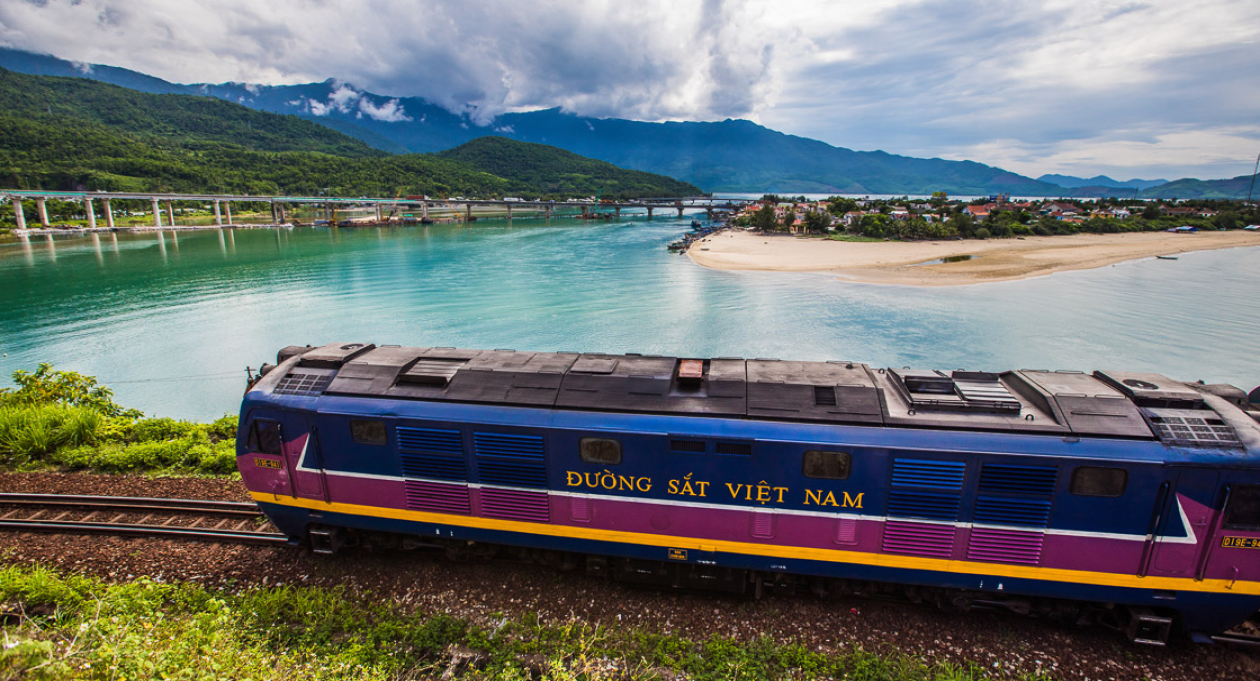
- Plan your trip
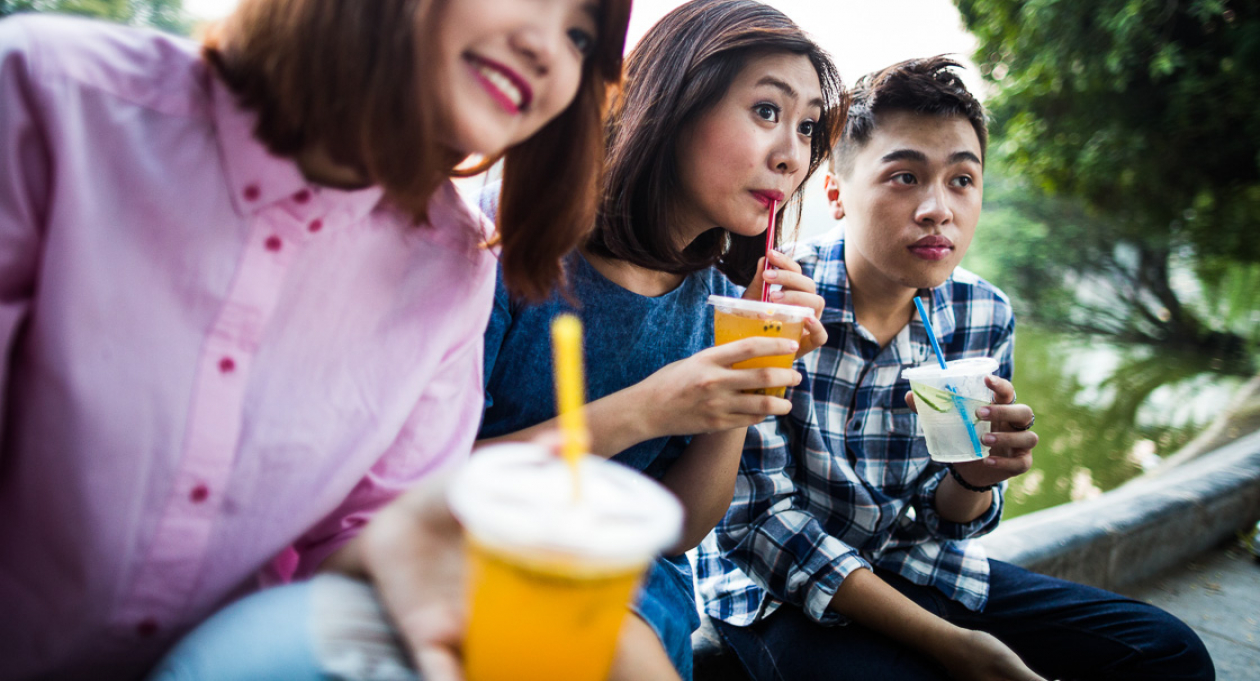
What are the Vietnamese like?
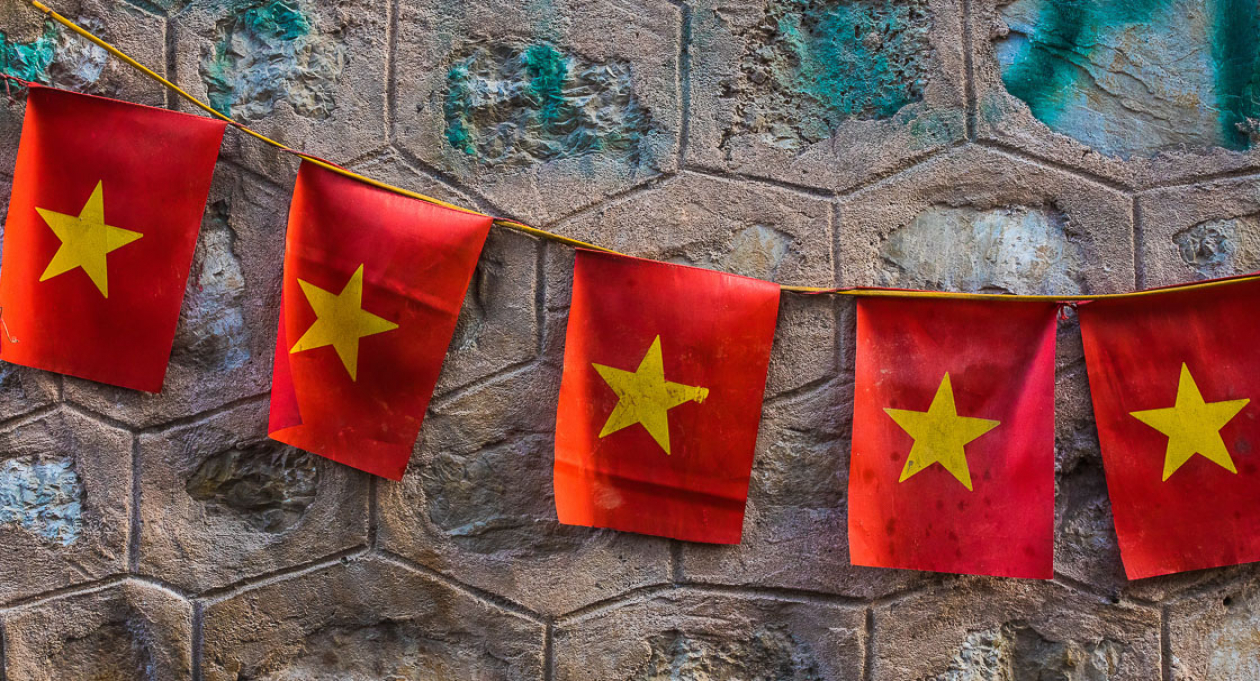
A guide to e-Visas in Vietnam
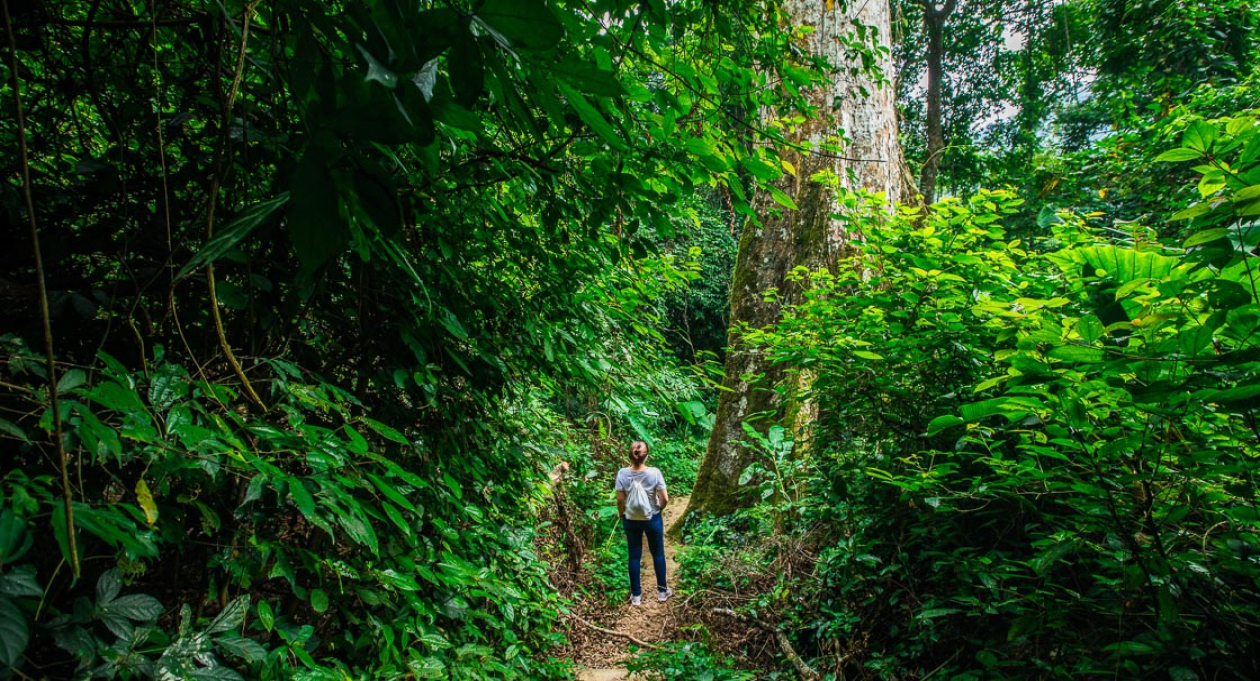
How to travel responsibly in Vietnam
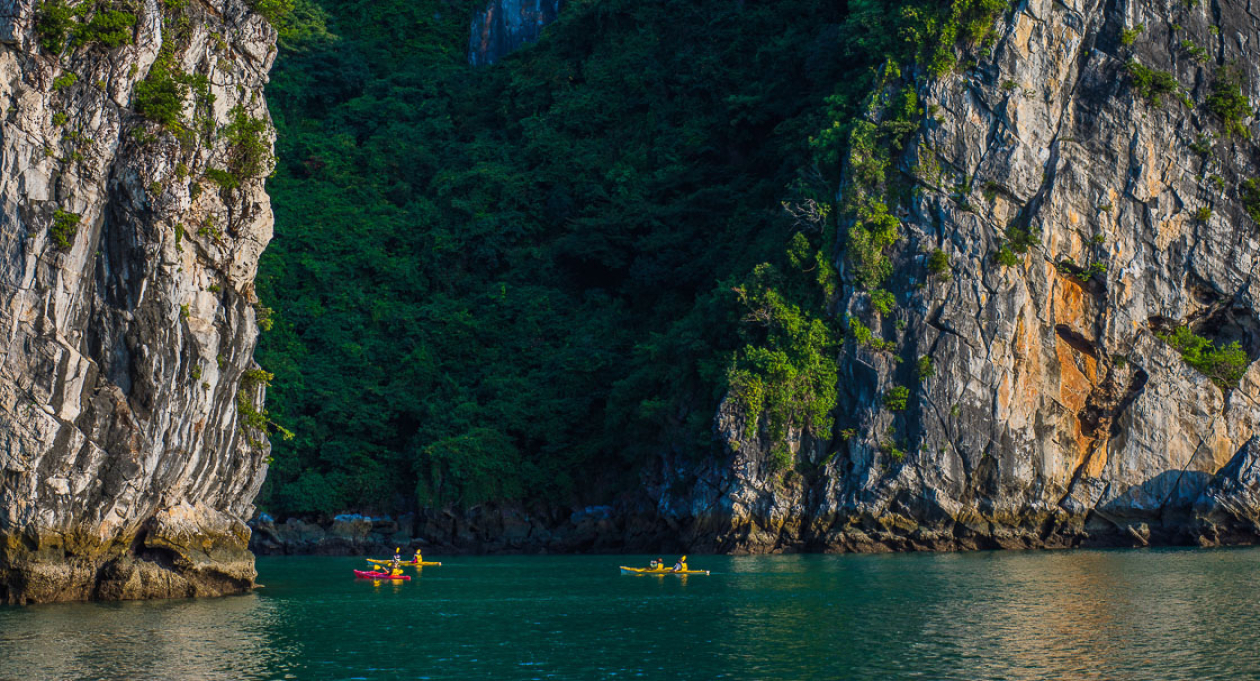
Beginner's guide to Vietnam now
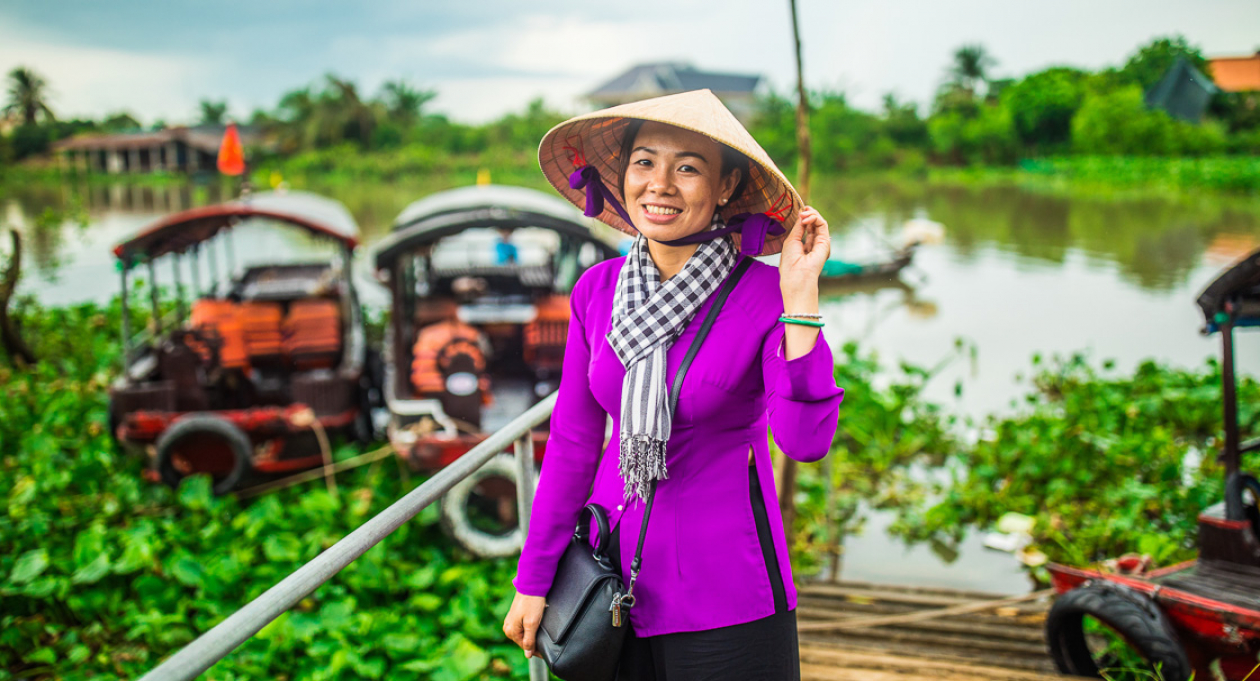
5 reasons to try a homestay in Vietnam
Your holiday in vietnam may be an adventure, but planning it should be a breeze..
Below you'll find all the practical information you need to prepare for your trip, including visas for Vietnam, transportation within the country, and basic Vietnamese phrases. If you need help with something specific, try our Frequently Asked Questions ; and for inspiration for your itinerary, check out our Recommended Trips for first-time visitors.
travel tips
Read up before you go
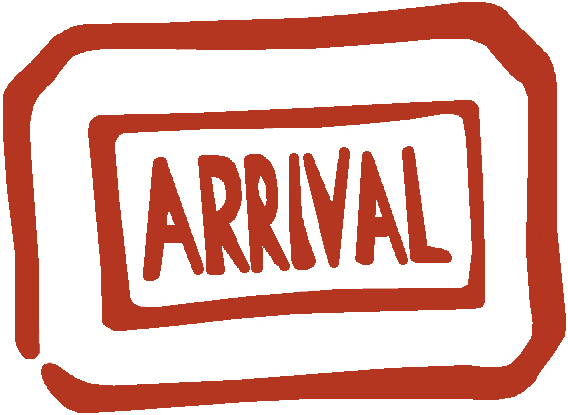
Itineraries
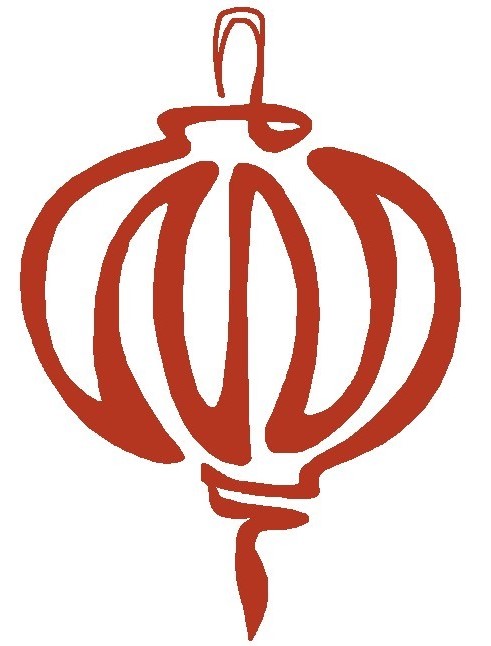
practicalities
Get ready for your visit
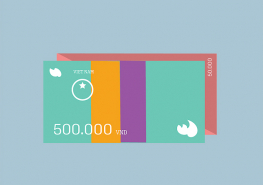
Vietnam's unit of currency is the Vietnamese đồng (VND) , represented by the '₫' symbol. You can find notes in denominations of 200₫, 500₫, 1,000₫, 2,000₫, 5,000,₫ 10,000₫, 20,000₫, 50,000₫, 100,000₫, 200,000₫, and 500,000₫. For newcomers it can be helpful to ignore the final three zeros until you get the hang of the conversion.
Cash is generally used for small purchases, however, most establishments will accept payments from major credit card providers such as Visa. In addition, hotels, tour operators, boutiques, restaurants, and grocery stores generally accept international debit and credit cards.
If you need to change money, currency exchange counters are available at airports, banks, and official exchange centers. However do note it can be very difficult to purchase dollars once you’re in Vietnam. For most travellers we recommend using ATMs instead of currency exchange points. ATMs are widely available across the country. Maximum withdrawals for foreign cards are usually two or three million per transaction. Below are some banks with higher withdrawal limits:
Bank maximum withdrawals:
- ANZ: 5 million VND
- Citibank: 10 million VND
- HSBC: 5 million VND
- Commonwealth: 10 million VND
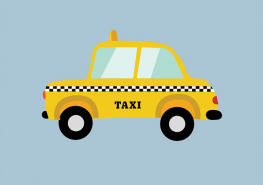
Taxi services
Vietnam has modern, efficient taxi services to help you get around. To avoid scams and haggling, we recommend sticking with the reputable Vinasun and Mai Linh taxis only. There are plenty of these taxis in Vietnam’s tourism destinations. Other taxi companies you can take are Hanoi Taxi Group and SaigonTourist.
Whichever taxi company you take, always ask to use the metre. In most cities, you can also use call the operator numbers for Vinasun or Mai Linh taxis for a pickup from your location.
Ride-sharing applications such as Grab are also available for cars and motorbikes in Vietnam's main cities. You will need a local SIM card to use these apps. Click here for more information about transport in Vietnam.
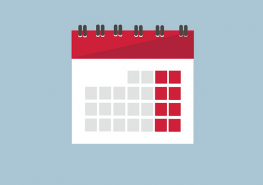
Public holidays
Vietnamese Lunar New Year Festival (Tet) is the biggest holiday of the year, and takes place in late January or early February. Travellers should be aware that most businesses and restaurants shut down during this holiday, as Vietnamese travel home to be with their families. Public transport hubs are full to overflowing in the days leading up to Tet. Any transportation booked over the Tet period should be confirmed well in advance.
You can find a full list of public holidays in Vietnam here , and a round-up of Vietnam’s best festivals here .
Government agencies work eight hours a day from 8am to 5pm, with a one-hour lunch break. Working days are from Monday to Friday.
Most banks in Vietnam open from 7:30am or 8am to 4:30pm, with a break for lunch. Some banks are open on Saturday mornings from 8am to 11:30pm.
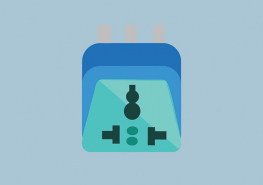
Power plugs
The voltage supply in Vietnam is 220 volts. Most sockets accommodate plugs with two round prongs. If you need adaptors you can find them at any electrical shop, or ask your hotel for assistance. Power cuts and surges are not common but can happen from time to time depending on the location.
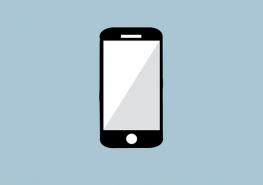
SIM cards & helpful numbers
Getting a local SIM card in Vietnam is fast and inexpensive. There are three major GSM network operators in Vietnam, and all have good coverage
You can buy prepaid SIM cards on arrival at major airports, as well as from countless shops across the country. You will need to show your passport to register your SIM card. Prices for SIM cards, SMS messages and phone calls are extremely affordable within Vietnam. You can load your phone credit in increments from 20,000 VND to 100,000 VND on most networks. Data-only SIM cards may cost 100,000 VND to 200,000 VND depending on the amount of data purchased.
Here are few numbers you may need while in Vietnam: International Dialing Code: +84 Domestic Calls (within Vietnam): 0 + Area code + Telephone No. International Calls (outside Vietnam): 00 + Country code + Area code + Telephone No.
The following is a list of useful telephone numbers to have on hand when visiting Vietnam: +84: International Dialing Code 101: Domestic Long Distance Telephone Service 1080: Social and Cultural Information 110: International Telephone Service 113: Police 114: Fire Brigade 115: Ambulance
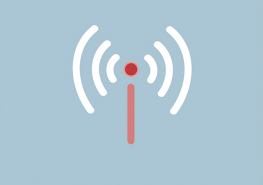
Internet and postal services
Vietnam is well-wired and in most destinations you can easily find a connection in cafes, spas, shops, hotels and restaurants. Free public Internet access is available in several tourist hubs and major airports. Local 3G and 4G packages are an affordable option if you plan to visit remote areas or need to be online frequently. The Vietnamese postal service is generally reliable, although packages can take longer to arrive than expected and are often held at the post office for pick-up. Mailboxes are uncommon. If you are sending postcards home, give them to your hotel to mail or send them directly from a post office.
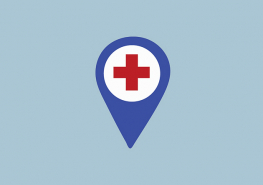
Vietnam’s major cities have excellent clinics and hospitals ready to serve travellers, with English-speaking doctors and staff. Below you’ll find a list of some of the best places to go if you need medical help. We highly recommend buying travel insurance before coming to Vietnam.
COLUMBIA ASIA
No. 8, Alexandre de Rhodes, Bến Nghé, District 1, Bến Nghé, Vietnam +84 8 3823 8888 www.columbiaasia.com/vietnam
FAMILY MEDICAL HCMC
Add: Diamond Plaza, 34 Le Duan, District 3, Hồ Chí Minh, Vietnam +84 8 3822 7848 www.vietnammedicalpractice.com
FV HOSPITAL
No. 6 Nguyễn Lương Bằng, Tân Phú, District7, Hồ Chí Minh, Vietnam +84 8 54 11 33 33 www.fvhospital.com/en
INTERNATIONAL SOS
No.167A Nam Ky Khoi Nghia street, district 3, HCMC, Vietnam +84 8 3824 0777 www.internationalsos.com
YERSIN INTERNATIONAL
No. 10 Truong Dinh - Ward 6 - District 3 - HCMC +84 8 3933 66 88 www.yersinclinic.com
VICTORIA HEALTHCARE VIETNAM
152 Nguyen Luon Bang, Tan Phu, District 7, HCMC, Vietnam +84 8 3910 4545 www.victoriavn.com
FAMILY MEDICAL DANANG
96-98 Nguyen Van Linh Street, Hai Chau District, Danang, Vietnam +84 236 3582 699 www.vietnammedicalpractice.com
HOAN MY DANANG HOSPITAL
161 Nguyễn Văn Linh, Thạc Gián, Q. Thanh Khê, Da Nang, Vietnam +84 236 3650 676 www.hoanmy.com
FAMILY MEDICAL PRACTICE HANOI
Van Phuc Compound, 298 Kim Ma Street, Ba Dinh District, Hanoi, Vietnam +84 4 3843 0748 www.vietnammedicalpractice.com
HONG NGOC HOSPITAL
55 Yen Ninh, Ba Dinh District, Hanoi, Vietnam +04 8 39 275 568 www.hongngochospital.vn
L’HOPITAL FRANCAIS DE HANOI
No.1 Phuong Mai, Dong Da District, Hanoi, Vietnam +84 4 3577 1100 www.hfh.com.vn
INTERNATIONAL SOS HANOI
51 Xuan Dieu Street, Tay Ho District, Hanoi, Vietnam + 84 4 3934 0666 www.internationalsos.com
VIET DUC HOSPITAL
40 Trang Thi Street, Hanoi, Vietnam +84 4 3825 3531 www.vietduchospital.edu.vn
VINMEC INTERNATIONAL HOSPITAL
458 Minh Khai Street, Hai Ba Trung District, Hanoi, Vietnam +84 4 3974 3556 www.vinmec.com
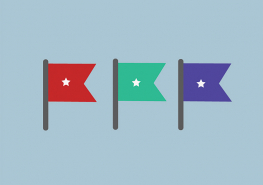
Embassies and consulates
Embassies and consulates of foreign countries in Vietnam can be found in the cities of Hanoi and Ho Chi Minh. For easy reference, below is a full list of embassies in Vietnam and Vietnamese embassies abroad.
Ha Noi Add: 13 Phan Chu Trinh St., Hoan Kiem Dist. Tel: (84-4) 3825 3865 Fax: (84-4) 3826 0830 Email: [email protected]
Ha Noi Add: A19 - 21, D5 Vuon Dao St., Tay Ho Dist. Tel: (84-4) 6258 3559 Fax: (84-4) 6258 3504
Ha Noi Add: 63 To Ngoc Van Road, Tay Ho Dist. Tel: (84-4) 3829 4999 Fax: (84-4) 3829 4997 Email: [email protected]
Ha Noi Add: 298B Kim Ma St., Ba Dinh Dist. Tel: (84-4) 3845 3379 Fax: (84-4) 3845 4977 Email: [email protected]
Ha Noi Add: 9 Chu Van An St., Ba Dinh Dist. Tel: (84-4) 3734 5586 Fax: (84-4) 3734 5589 Email: [email protected]
Ha Noi Add: 305 – 308, A2 Bulding, Van Phuc Diplomatic Compound, 298 Kim Ma St., Ba Dinh Dist. Tel: (84-4) 6268 4888 Fax: (84-4) 6269 4999
Ha Noi Add: Villa No 44/1 Van Bao St., Ba Dinh Dist. Tel: (84-4) 3726 3610 Fax: (84-4) 3726 3615
SOUTH AFRICA
Add: 3rd floor Central Buiding, 31 Hai Ba Trung St., Hoan Kiem Dist. Tel: (84-4) 3936 2000 Fax: (84-4) 3936 1991 Email: [email protected]
Ho Chi Minh City (Consulate)
Add: 80 Vo Van Tan St., Dist.3 Tel: (84-8) 3823 8556 Fax: (84-8) 3823 8557 Email: [email protected]
Ha Noi (Consulate) Add: 9B Da Tuong St., Hoan Kiem Dist. Tel: (84-4) 3942 9266 Fax: (84-4) 3942 9249
Add: 61 Ly Thuong Kiet St., Hoan Kiem Dist. Tel: (84-4) 3718 5911 Fax: (84-4) 3718 5910 Email: [email protected]: 194 No Trang Long St., Binh Thanh Dist. Tel: (84-8) 3516 5062 Fax: (84-8) 3516 5072
Add: 194 No Trang Long St., Binh Thanh Dist. Tel: (84-8) 3516 5062 Fax: (84-8) 3516 5072
Ha Noi Add: Room 401, 4th floor, Sentinel Place, 41A Ly Thai To St., Hoan Kiem Dist. Tel: (84-4) 3831 5262 Fax: (84-4) 3831 5288 Email: [email protected]
Ha Noi Add: D6-D7, 14 Thuy Khue St., Tay Ho Dist. Tel: (84-4) 3843 2544 Fax: (84-4) 3843 2542 Email: [email protected]
Ha Noi (Consulate)
Add: 31 Hung Vuong St., Ba Dinh Dist. Tel: (84-4) 3734 5000 Fax: (84-4) 3734 5049 Email: [email protected]
Ho Chi Minh City (Consulate)
Add: Suite 1002, 235 Dong Khoi St., Dist. 1 Tel: (84-8) 3827 9899 Fax: (84-8) 3827 9935 Email: [email protected]
Ha Noi
Add: 121A, 38th St., Dist. 2 Tel: (84-8) 3743 2717 Fax: (84-8) 3743 2716 Email: [email protected]
Add: 14th floor, Corner Stone Building, 16 Phan Chu Trinh St., Hoan Kiem Dist. Tel: (84-4) 3936 5318 Fax: (84-4) 3936 5319 Email: [email protected]
Add: 65A Ly Thuong Kiet St., Hoan Kiem Dist. Tel: (84-4) 3942 4775 Fax: (84-4) 3942 2426 Email: [email protected]
Add: 45 Phung Khac Khoan St., Dist. 1 Tel: (84-8) 3829 7350 Fax: (84-8) 3829 5293 Email: [email protected]
Add: 44/4 Van Bao St.,Ba Dinh Dist. Tel: (84-4) 7107 8888 Fax: (84-4) 3726 5408 Email: [email protected]
Add: 9th floor, Hanoi Central Office Building, 44B Ly Thuong Kiet St., Hoan Kiem Dist. Tel: (84-4) 3936 5213 Fax: (84-4) 3936 5214 Email: [email protected]
Add: 7A Le Thanh Ton St., Dist.1 Tel: (84-4) 3825 0334 Fax: (84-4) 3823 6447 Email: [email protected]
Add: Suite 1402, 14th floor, Corner Stone Building, 16 Phan Chu Trinh St., Hoan Kiem Dist. Tel: (84-4) 3936 3082 Fax: (84-4) 3936 3081 Email: [email protected]
Add: 30 Le Ngoc Han St., Hai Ba Trung Dist. Tel: (84-8) 3972 9867 Fax: (84-8) 3972 9992 Email: [email protected]
Add: T11 Building, 14 Thuy Khue St., Tay Ho Dist. Tel: (84-4) 3847 0948 Fax: (84-4) 3847 0949 Email: [email protected]
Add: 11 Tra Khuc St., Tan Binh Dist.
Add: 407 Au Co St., Tay Ho Dist. Tel: (84-4) 3718 5747 Fax: (84-4) 3718 8049 Email: [email protected]
Add: 7 Lang Ha St., Dong Da Dist. Tel: (84-4) 3850 5000 Fax: (84-4) 3850 5010
Add: 4 Le Duan St., Dist. 1 Tel: (84-8) 3520 4200 Fax: (84-8) 3520 4244
Add: 111 Trich Sai St., Tay Ho Dist. Tel: (84-4) 3759 2788 Fax: (84-4) 3759 2728 Email: [email protected]
Add: 73 D5C Vuon Dao St., Tay Ho Dist. Email: (84-4) 3758 5228 Fax: (84-4) 3758 5229 Email: [email protected]
Add: 8th floor, Prime Center, 53 Quang Trung, Hoan Kiem Dist. Add: (84-4) 3943 3050 Fax: (84-4) 3943 3055 Email: hanoi-obbmeia.gv.at
Add: 12/140 Nguyen Van Thuong St., Dist. 2, Tell: (84-8) 3519 3128 Fax: (84-8) 3519 3122 Email: [email protected]
Add: 66 To Ngoc Van St., Tay Ho Dist. Email: (84-4) 3719 2974 Fax: (84-4) 3719 7125 Email: [email protected]
Add: 9th floor, Hanoi Tower, 49 Hai Ba Trung St., Hoan Kiem Dist. Email: (84-4) 3934 6179 Fax: (84-4) 3934 6183 Email: [email protected]
Add: 105 Duong Van An St., Dist. 2 Email: (84-8) 6281 8001 Fax: (84-8) 6281 8010 Email: [email protected]
Add: 5 Nui Truc St., Ba Dinh Dist. Email: (84-4) 3845 2908 Fax: (84-4) 3846 0856 Email: [email protected]
CZECH REPUBLIC
Add: 13 Chu Van An St., Ba Dinh Dist. Email: (84-4) 3845 4131/2 Fax: (84-4) 3823 3996
Add: 28 Mac Dinh Chi St., Dist. 1 Email: (84-8) 3829 0585 Fax: (84-8) 3822 6043 Email: [email protected]
Hai Phong
Add: 2 Pham Minh Duc, Ngo Quyen Dist. Tell: (84-31) 3836 539 Fax:(84-31) 3737 618 Email:[email protected]
Add: 7th floor, BIDV Tower, 194 Tran Quang Khai St., Hoan Kiem Dist Email: (84-4) 3823 1888 Fax: (84-4) 3823 1999 Email: [email protected]
Add: Suite 505, 5th floor, Centec Tower, 72 - 74 Nguyen Thi Minh Khai St., Dist. 3 Email: (84-8) 3821 9373 Fax: (84-8) 3821 9371
Add: 34 Nguyen Thi Nghia St., Dist. 1, Tel/ Fax: (84-8) 3925 7276 Email: [email protected]
Add: 24th floor, Lotter Center Hanoi, 54 Lieu Giai St., Ba Dinh Dist. Email: (84-4) 3826 6788 Fax: (84-4) 3826 6766 Email: [email protected]
Add: Suite 501, 5th floor, Sailing Tower, 111A Pasteur Rd., Dist. 1 Email: (84-8) 3827 2029 Fax: (84-8) 3823 4436 Email: [email protected]
Add: 57 Tran Hung Dao St., Hoan Kiem Dist. Email: (84-4) 3944 5700 Fax: (84-4) 3944 5717 Email: [email protected]
Add: 27 Nguyen Thi Minh Khai St., Dist. 1 Email: (84-8) 3520 6800 Fax: (84-8) 3520 6819 Email: [email protected]
Add: 29 Tran Phu St., Ba Dinh Dist. Email: (84-4) 3845 3836 Fax: (84-4) 3845 3838 Email: [email protected]
Add: 126 Nguyen Dinh Chieu St., Dist. 3 Email: (84-8) 3829 1967 Fax: (84-8) 3823 1919 Email: [email protected]
Add: 27 - 29 Au Co St., Tay Ho Dist. Email: (84-4) 3715 2254 Fax: (84-4) 3715 2253 Email: [email protected]
Add: 44 Hoang Dieu St., Dist.4 Email: (84-8) 3940 0726 Fax: (84-4) 3825 4278
Add: 9th floor Hanoi Lake View, 28 Thanh Nien St., Tay Ho Dist. Email: (84-4) 3771 5714/5 Fax: (84-4) 3715 0694 Email: [email protected]
Add: 21th floor, Lim Tower, 9 -11 Ton Duc Thang St., Dist.1 Email: (84-8) 0909 991731 Email: [email protected]
Add: 9th floor, The Vista, 628C Hanoi Highway, Dist.2 Email: (84-8) 3827 4462 Fax: (84-8) 3827 4461
Add: 2th floor, Sentinel Place, 41A Ly Thai To St., Hoan Kiem Dist. Email: (84-4) 3974 3291 Fax: (84-4) 3974 3295 Email: [email protected]
Add: 9 Le Phung Hieu St., Hoan Kiem Dist. Email: (84-4) 3825 6256 Fax: (84-4) 3826 7602 Email: [email protected]
Add: 10th floor, President Place Building, 93 Nguyen Du St., Dist.1 Tel: (84-8) 3827 5445/46/47 Fax: (84-8) 3827 5444
Add: 6th floor, Thu Do Building, 72 Tran Hung Dao St., Hoan Kiem Dist. Tel: (84-4) 6654 2197 Fax: (84-4) 3928 8901
Add: 12th floor, Petro Viet Nam Tower, 1-5 Le Duan St., Dist.1 Tel: (84-8) (84-8) 5404 6868 Fax: (84-8) (84-8) 5404 6969
Add: Room 1603B, Prime Centre Building, 53 Quang Trung St., Hai Ba Trung Dist. Tel: (84-4) 3562 6500 Fax: (84-4) 3562 6501 Email: [email protected]
NETHERLANDS
Add: 7th floor, BIDV Tower, 194 Tran Quang Khai St., Hoan Kiem Dist. Email: (84-4) 3831 5650 Fax: (84-4) 3831 5655 Email: [email protected]
Add: Suite 901, Saigon Tower, 29 Le Duan St.,Dist. 1 Email: (84-8) 3823 5932 Fax: (84-8) 3823 5934 Email: [email protected]
Add: 8th floor, Hanoi Tower, 49 Hai Ba Trung St., Hoan Kiem Dist. Email: (84-4) 3974 8900 Fax: (84-4) 3974 3301 Email: [email protected]
Add: 21- 23 Nguyen Thi Minh Khai St., Dist. 1 Email: (84-8) 3822 1696 Fax: (84-8) 3827 2696 Email: [email protected]
Add: 3 Chua Mot Cot St., Ba Dinh Dist. Email: (84-4) 3845 2027 Fax: (84-4) 3823 6914 Email: [email protected]
Add: 31 Pho Duc Chinh St., Ba Dinh Dist. Email: (84-4) 9075 6860 Fax: (84-4) 3926 3926 Email: [email protected]
Add: 66/11 Pham Ngoc Thach St., Dist. 3 Email: (84-8) 3820 0623 Fax: (84-8) 3820 0623 Email: [email protected]
Add: 5 Le Hong Phong St., Ba Dinh Dist. Email: (84-4) 3845 2014 Fax: (84-4) 3843 0922 Email: [email protected]
Add: Villa 33/5A Dang Van Ngu St., Phu Nhuan Dist. Email: (84-8) 3991 0896 Fax: (84-8) 6292 8226
RUSSIAN FEDERATION
Add: 191 La Thanh Rd., Dong Da Dist. Email: (84-4) 3833 6991 Fax: (84-4) 3833 6995 Email: [email protected]
Add: 40 Ba Huyen Thanh Quan St., Dist. 3 Email: (84-8) 3930 3936 Fax: (84-8) 3930 3937 Email: [email protected]
Da Nang City (Consulate)
Add: 22 Tran Phu St. Email: (84-511) 3822 380 Fax: (84-511) 3818 527 Email: [email protected]
Add: 666 Ground Floor, The Manor Towers, Me Tri Rd., Tu Liem Dist. Email: (84-4) 3794 9999 Fax: (84-4) 3794 6666
Add: 12 Ba Huyen Thanh Quan St., Ba Dinh Dist. Email: (84-4) 3734 7601 Fax: (84-4) 3734 7603 Email: [email protected]
Add: 64 - 68 Hai Ba Trung St., Dist. 1 Email: (84-8) 3829 8888 Fax: (84-8) 3827 7999 Email: [email protected]
Add: 4 Le Hong Phong St., Ba Dinh Dist. Email: (84-4) 3771 5207 Fax: (84-4) 3771 5206 Email: [email protected]
Add: 2 Nui Truc St., Ba Dinh Dist. Email: (84-4) 3726 0400 Fax: (84-4) 3823 2195 Email: [email protected]
Add: 186 Nguyen Van Huong St., Dist. 2 Email: (84-8) 3519 2335 Fax: (84-8) 3519 2337
SWITZERLAND
Add: 15th floor, Central Office Building, 44B Ly Thuong Kiet St., Hoan Kiem Dist. Email: (84-4) 3934 6589 Fax: (84-4) 3934 6591 Email: [email protected]
Add: 37th floor, Bitexco Financial Tower, 2 Hai Trieu St., Dist. 1 Email: (84-8) 6299 1200 Fax: (84-8) 6299 1222
UK AND NORTHERN IRELAND
Add: 4th floor, Central Building, 31 Hai Ba Trung St., Hoan Kiem Dist. Email: (84-4) 3936 0500 Fax: (84-4) 3936 0561 Email: [email protected]
Add: 25 Le Duan St., Dist.1 Email: (84-8) 3825 1380/1 Fax: (84-8) 3822 1971
Add: 6 Le Hong Phong St., Ba Dinh Dist. Email: (84-4) 3734 4492 Fax: (84-4) 3734 4497 Email: [email protected]
Add: 22 - 24 Nguyen Van Thu St., Dist. 1 Email: (84-8) 3910 4054 Fax: (84-8) 3910 4053 Email: [email protected]
Add: 8 Dao Tan St., Ba Dinh Dist. Tel: (84-4) 3774 0100 Fax: (84-4) 3774 0111
Add: 20th floor, Vincom Center, 47 Ly Tu Trong St., Dist.1 Tel: (84-8) 3521 8100 Fax: (84-8) 3521 8101 Email: hcmc.vietnam.embassy.gov.au
NEW ZEALAND
Add: Room 504, 5th floor , 63 Ly Thai To St., Hoan Kiem Dist.
Tel: (84-4) 3824 1481
Fax: (84-4) 3824 1480
Email: [email protected]
Add: Suite 804, 8th floor, Metropolitan Building, 235 Dong Khoi St., Dist. 1
Tel: (84-8) 3822 6907
Fax: (84-8) 3822 6905
Add: 6A Le Hong Phong St., Ba Dinh Dist. Tel: (84-4) 3737 9011 Fax: (84-4) 3737 9013 Email: [email protected]
Add: 675 Lac Long Quan Rd., Tay Ho Dist. Tel: (84-4) 3771 6625 Fax: (84-4) 3771 6628 Email: [email protected]
Add: 312 Lac Long Quan St., Tay Ho Dist. Tel: (84-4) 3726 2003 Fax: (84-4) 3726 2010 Email: [email protected]
Add: 71 Tran Hung Dao St., Hoan Kiem Dist. Tel: (84-4) 3942 4788 Fax: (84-4) 3942 3225 Email: [email protected]
Add: 41 Phung Khac Khoan St., Dist. 1 Tel: (84-8) 3829 2751 Fax: (84-8) 3822 2773 Email: [email protected]
Add: 46 Hoang Dieu St., Ba Dinh Dist. Tel: (84-4) 3823 5569 Fax: (84-4) 3734 1181
Add: 175 Hai Ba Trung St., Dist. 3 Tel: (84-8) 3822 1327 Fax: (84-8) 3829 5009
DPR. OF KOREA
Add: 25 Cao Ba Quat St., Ba Dinh Dist. Tel: (84-4) 3845 3008 Fax: (84-4) 3823 1221 Email: [email protected]
Add: 58-60 Tran Hung Dao St., Hoan Kiem Dist. Tel: (84-4) 3824 4989 Fax: (84-4) 3824 4998 Email: [email protected]
Add: 55 Nguyen Dinh Chieu St., Dist. 3 Tel: (84-8) 3823 7050 Fax: (84-8) 3823 7047 Email: [email protected]
Add: 50 Ngo Quyen St., Hoan Kiem Dist. Tel: (84-4) 3825 3353 Fax: (84-4) 3825 9274 Email: [email protected]
Add: 18 Phung Khac Khoan St., Dist.1 Tel: (84-8) 3825 1888 Fax: (84-8) 3829 9493 Email: [email protected]
Add: 54 Tran Phu St., Hoan Kiem Dist. Tel: (84-4) 3823 2068 Fax: (84-4) 3823 2120 Email: [email protected]
Add: 66 Tran Hung Dao St., Hoan Kiem Dist. Tel: (84-4) 3942 4141 Fax: (84-4) 3942 4055 Email: [email protected]
Add: 10th floor, Hanoi Tower Building, 49 Hai Ba Trung St., Hoan Kiem Dist. Tel: (84-4) 3843 3140 Fax: (84-4) 3843 5760 Email: [email protected]
Add: 27 Lieu Giai St., Ba Dinh Dist. Tel: (84-4) 3846 3000 Fax: (84-4) 3846 3043 Email: [email protected]
Add: 261 Dien Bien Phu St., Dist. 3 Tel: (84-8) 3933 3510 Fax: (84-8) 3933 3520 Email: [email protected]
Add: Villa No 51, Ho Tay Villa Compound, 10 Dang Thai Mai St., Tay Ho Dist. Tel: (84-4) 3718 0777 Fax: (84-4) 3718 6777
Add: 28th floor, Lotte Center Hanoi Building, 54 Lieu Giai St., Ba Dinh Dist. Tel: (84-4) 3831 5110 Fax: (84-4) 3831 5117 Email: [email protected]
Add: 107 Nguyen Du St., Dist. 1 Tel: (84-8) 3822 5757 Fax: (84-8) 3822 5750 Email: [email protected]
Add: 10 Le Hong Phong St., Ba Dinh Dist. Tel: (84-4) 3848 9955 Fax: (84-4) 3848 9988 Email: [email protected]
Add: 24 Phung Khac Khoan St., Dist. 1 Tel: (84-8) 3827 0555 Fax: (84-8) 3827 0111 Email: [email protected]
Add: 40 Quang Trung St., Hoan Kiem Dist. Tel: (84-4) 3942 4576 Fax: (84-4) 3822 8414 Email: [email protected]
Add: 93 Pasteur St., Dist. 3 Tel: (84-8) 3829 7667 Fax: (84-8) 3829 9272 Email: [email protected]
Add: 43 - 45 Dien Bien Phu St., Ba Dinh Dist. Tel: (84-4) 3734 3849 Fax: (84-4) 3734 3832 Email: [email protected]
Add: 2nd floor, Me Linh Point Tower, 2 Ngo Duc Ke St., Dist. 1 Tel: (84-8) 3829 9023 Fax: (84-8) 3829 9027 Email: [email protected]
Add: Villa No 6 Van Phuc St., Ba Dinh Dist. Tel: (84-4) 3845 3009 Fax: (84-4) 3845 4954 Email: [email protected]
Add: 298A Kim Ma St., Ba Dinh Dist. Tel: (84-4) 3845 3369 Fax: (84-4) 3845 2404
Add: 74 Trich Sai St., Tay Ho Dist. Tel: (84-4) 3759 2700 Fax: (84-4) 3753 6666
Add: 44/2 Van Bao St., Ba Dinh Dist. Tel: (84-4) 3726 2251 Fax: (84-4) 3726 2253 Email: [email protected] or
Add: Room 201 - 301, Building E4b, Trung Tu Diplomatic Compound, 6 Dang Van Ngu St., Dong Da Dist. Tel: (84-4) 3852 4013 Fax: (84-4) 3834 9696 Email: [email protected]
PHILIPPINES
Add: 27B Tran Hung Dao St., Hoan Kiem Dist. Tel: (84-4) 3943 7948 Fax: (84-4) 3943 5760 Email: [email protected]
Add: 12 Nam Ky Khoi Nghia St., Dist. 3 Tel: (84-8) 3821 0033 Fax: (84-8) 3821 0026 Email: [email protected]
Add: Villa 43, Tran Hung Dao St., Hoan Kiem Dist. Tel: (84-4) 3943 0222 Fax: (84-4) 3944 0148 Email: [email protected]
AUDI ARABIA
Add: 48A Tran Phu St., Tay Ho Dist. Tel: (84-4) 3726 4373 Fax: (84-4) 3726 4374 Email: [email protected]
Add: 41 - 43 Tran Phu St., Hoan Kiem Dist. Tel: (84-4) 3848 9168 Fax: (84-4) 3848 9178 Email: [email protected]
Add: 65 Le Loi Boulevard, Dist. 1 Tel: (84-8) 3822 5174 Fax: (84-8) 3914 2938 Email: [email protected]
Add: 55B Tran Phu St., Hoan Kiem Dist. Tel: (84-4) 3734 1894 Fax: (84-4) 3734 1897 Email: [email protected]
Add: 26 Phan Boi Chau St., Hoan Kiem Dist. Tel: (84-4) 3823 5092 Fax: (84-4) 3823 5088
Add: 77 Tran Quoc Thao St., Dist. 3 Tel: (84-8) 3932 7637/ 8 Fax: (84-8) 3932 6002 Email: [email protected]
TIMOR - LESTE
Add: 51 Nguyen Du St., Hai Ba Trung Dist. Tel: (84-4) 6278 2972 Fax: (84-4) 6278 2973
Add: 14th floor, Central Office Building, 44B Ly Thuong Kiet St., Hoan Kiem Dist. Tel: (84-4) 3822 2460 Fax: (84-4) 3822 2458 Email: [email protected]
UNITED ARAB EMIRATES
Add: 20 Quang An St., Tay Ho Dist. Tel: (84-4) 3726 4545 Fax: (84-4) 3726 2020 Email: [email protected]
Add: 22/9 Dao Tan St., Ba Dinh Dist. Tel: (84-4) 3766 5203
2. Consulates Overseas:
IN AUSTRALIA
Add: 6 Timbarra Cres., O'Malley, Canberra, ACT 2606 Tel: (61-2) 6286 6059 Fax: (61-2) 6286 4534 Email: [email protected]
Consulate : Suite 205, Level 2 Edgecliff Centre, 203 - 233 New South Head Rd, Edgecliff - NSW 2027 Tel: (61-2) 9327 2539 Fax: (61-2) 9328 1653 Email: [email protected]
Consulate : Level 8, 16 St., Georges Terrace Perth WA 6000 P O Box 3122, East Perth, WA 6892 Tel: (61-8) 9221 1158 Fax: (61-8) 9225 6881 Email: [email protected]
IN NEW ZEALAND
Add: Level 21 Grand Plimmer Tower, 2-6 Gilmer Terrace Po Box 8042 Wellington Tel: (644) 4735 912 Fax: (644) 4735 913 Email: [email protected]
Add: Villa 101& 102, St 27, Sector 24, Al Mushrif. Abu Dhabi – The U.S.E, P.O Box: 113038 Tel: (971-2) 4496 710 Fax: (971-2) 4496 730 Email: [email protected]
IN BRUNEI DARUSSALAM
Add: No 9, Spg 148-3 jalan Telanai BA 2312, BSB Tel: (67-3) 2651 580 Fax: (67-3) 2651 574 Email: [email protected]
IN CAMBODIA
Add: 436 Monivong Blvd, Phnom Penh Tel: (855-23) 726 274 Fax: (855-23) 726 495
Consulate : Rd. No.3, Battambang Tel: (855-53) 6888 866 Fax: (855-53) 6888 866 Email:[email protected]
Consulate : 310 Ekreach, Khan Mittapheap, Sihanouk City Tel: (855-34) 933 466 Fax: (855-34) 933 669 Email: [email protected]
Add: Guang Hua Lu, No 32, Beijing.100600 Tel: (86-10) 6532 1155 Fax: (86-10) 6532 5720 Email: [email protected]
Consulate : No. 155 Beijing Rd., Kunming Tel: (86-871) 351 5889 Fax: (86-871) 351 6667 Email:[email protected]
Consulate : 15/F, Great Smart Tower, 230 Wan Chai Rd., Wan Chai, Hong Kong Tel: (85-2) 2591 4510 Fax: (85-2) 2591 4539 Email:[email protected]
Consulate : 1st floor, Touzi Dasha 109 Minzu Avenue - Nanning Tel: (86-771) 551 0562 Fax: (86-771) 553 4738 Email:[email protected]
Consulate : 2nd floor, B Building north, Landmark Hotel, Qiaoguang Rd. (Haizhu square), Guangzhou
Tel: (86-20) 8330 5916 Fax: (86-20) 8330 5915 Email:[email protected]
Consulate : 3F No. 65 Sung Chiang Road, Taipei, Taiwan Tel: (886-2) 25166 626 Fax: (886-2) 25041 761 Email:[email protected]
Consulate : 3F, Huachen Financial Mansion, No 900, Pudong Ave, Shanghai Tel: (86-21) 6855 5871 Fax: (86-21) 6855 5873 Email: [email protected]
Consulate : B-306 Oberoi chamber, New Link road, Andheri (w) Mumbai 400 053 Tel: (91-22) 2673 6688 Fax: (91-22) 2673 6633 Email: [email protected]
IN INDONESIA
Add: No.9 JL. Pekalongan, Menteng, Jakarta-Pusat 10310 Tel: (62-21) 3190 7255 Fax: (62-21) 3190 6642 Email: [email protected]
Add: No. 6 East Ordibehesht, Mardani Sharestan 8th. St. Pey Syan. St. M.Ardabili Valiyear Ave. Tehran Tel: (98-21) 2241 478 Fax: (98-21) 2241 6045 Email: [email protected]
Add: 4th floor.Beit Asia, 4 Weizman Str. Tel Aviv, Israel Tel: (972-3) 6093 704 Fax: (972-3) 6966 243 Email: [email protected]
Add: 50-11, Motoyoyogi-cho Shibuya-ku, Tokyo Tel: (81) 3466 3313 Fax: (81) 3466 3391 Email: [email protected]
Consulate : 4-2-15 Ichino-cho Higashi, Sakai-ku, Sakai-shi, Osaka 590-0952 Tel: (81-72) 2216 666 Fax: (81-72) 2216 667 Email: [email protected]
Consulate : 4th Floor, Aquahakata, 5-3-8 Nakasu, Hakata-ku, Fukuoka, Japan 810-0801 Tel: (81-92) 2637 668 Fax: (81-92) 2637 676 Email:[email protected]
IN KAZAKHSTAN
Add: No 6 Xary-Arka - A-xta-na Tel: (7-7172) 990 375 Fax: (7-7172) 990 379 Email: [email protected]
IN KOREA (DEMOCRATIC PEOPLE’S REPUBLIC)
Add: 7 Munsu Street, Pyongyang Tel: (850-2) 3817 358 Fax: (850-2) 3817 632 Email:[email protected]
IN KOREA (REPUBLIC)
Add: 28-58, Samchong - Dong, Chongno-Ku, 110-230, Seoul Tel: (82-2) 7382 318 Fax: (82-2) 7392 064 Email: [email protected]
Add: Block 10, St.19, Villa 96 - Ku Wait Tel: (965) 2531 1450 Fax: (965) 2535 1592 Email: [email protected]
Add: Thatluang Rd, Vientiane Tel: (856-21) 413 409 Fax: (856-21) 413 379 Email: [email protected]
Consulate : 31 Ban Pha Bat, Pakse, Champassak Tel: (856-31) 212 827 Fax: (856-31) 212 058 Email: [email protected]
Consulate : 118 Sisavangvong Rd., Khanthabuly Dist., Savanakhet Tel: (85-6) 212 418 Fax: (85-6) 212 182 Email: [email protected]
Consulate : No 427- 428 Ban That Bosot, Luang Prabang Town, Luang Prang Province Tel: (856-71) 254 748 Fax: (856-71) 254 746 Email: [email protected]
IN MALAYSIA
Add: No.4, Persiaran Stonor 50450, Kuala Lumpur Tel: (60-3) 2148 4534 Fax: (60-3) 2148 3270 Email: [email protected]
IN MONGOLIA
Add: Enlchtaivany Urgunchulur 47-Ulaan Baatar Tel: (97-611) 454 632 Fax: (97-611) 458 923 Email: [email protected]
Add: Building No.70-72, Thanlwin Rd., Bahan Tsp, Yangon Tel: (95-1) 501 992 Fax: (95-1) 514 897 Email: [email protected]
IN PAKISTAN
Add: 1117, St.11 Sector E7, Islamabad Pakistan Tel: (92-51) 2655 785, ext: 103 Fax: (92-51) 2655 783 Email: [email protected]
IN PHILIPPINES
Add: 670 Ocampo Pablo Malate, Manila Tel: (63-2) 5216 843 Fax: (63-2) 5260 472 Email: [email protected]
Add: Villa No.8 (Near Saha 109 Street), West bay Lagoon. P.O.Box: 23595 Doha Tel: (974) 4412 8480 Fax: (974) 4412 8370 Email: [email protected]
IN SAUDI ARABIA
Add: 23 Al-Dhiyafah St, Al-Nuzha District, Riyadh Tel: (9661) 4547 887 Fax: (9661) 4548 844 Email: [email protected]
IN SINGAPORE
Add: 10 Leedon Park, Singapore 267887 Tel: (65-6) 4625 938 Fax: (65-6) 4689 863 Email: [email protected]
IN THAILAND
Add: 83/1 Wireless Rd., Pathumwan, Bangkok 10330 Tel: (66-2) 2515 836 Fax: (66-2) 2517 201 Email: [email protected]
Consulate : 65/6 Chatapadung, Khonkaen 40000 Tel: (66-43) 242 190 Fax: (66-43) 241 154 Email: [email protected]
IN BANGLADESH
Add: Vintage Building, Plot 07, Road 104, Gulshan 2, Dhaka 1212 Tel: (880-2) 8854 051 Fax: (880-2) 8854 052 Email: [email protected]
IN SRI LANKA
Add: 30/5 Ward Place, Colombo-7 Tel: (94-11) 2696 050 Fax: (94-11) 2692 040 Email: [email protected]
Add: No.30, Rue Chénoua, Hydra - Alger Tel: (213-21) 608 843 Fax: (213-21) 693 778 Email: [email protected]
Add: Via AL4, Lotes 4-5, Bairro Talatona-Luanda Sul, LUANDA CP 1774 Tel: (244-222) 010 697 Fax: (244-222) 010 696 Email: [email protected]
Add: 110, Sudan str.Mohandesseen, Cairo Tel: (202) 3762 3841 Fax: (202) 3336 8612 Email: [email protected]
Add: Al Hadba Al Khadra – Tripoli Libya P.O. Box: 587 Tel: (218-21) 4903 664 Fax: (218-21) 4901 499 Email: [email protected]
IN MOZAMBIQUE
Add: Av.Francisco Orlando Mabunbwe 1048/1026 Caixa Postal: 4051 - Maputo Tel: (258) 2149 7912 Fax: (258) 2149 1992 Email: [email protected]
Add: No.9 River Niger Street, Maitama, Abuja Tel: (234-9) 8703 678 Email: vnemb.ng@m
IN SOUTH AFRICA
Add: 87 Brooks Street, Brooklyn, P.O. Box : 13692 Hatfield 0028 Pretoria Tel: (27-12) 3628 119 Fax: (27-12) 3628 115 Email: [email protected]
IN TANZANIA
Add: Plot 11, Bongoyo Road, Oysterbay, PO Box: 9724 Dar Es Salaam Tel: (255-222) 664 535 Fax: (255-222) 664 537 Email: [email protected]
Add: Felix-Mottl - Strabe A - 1190 Vienna Tel: (43-1) 3680 755 Fax: (43-1) 3680 754 Email: [email protected]
Add: 220040 Minsk, Mozajskovo St, house No 3 Tel/Fax: (37-51) 7237 4879 Email:[email protected]
Add: Boulevard General Jacques 11050 Bruxelles Tel: (32-2) 3792 731 Fax: (32-2) 3749 376 Email: [email protected]
IN BULGARIA
Add: Sofia 1113 Ul. Jetvarka No 1 Tel: (359-2) 9632 743, ext: 201 Fax: (359-2) 9633 658 Email: [email protected]
Add: Plzenská 214 - 150 00 - Praha 5 Tel: (42-02) 5721 1540 Fax: (42-02) 5721 1792 Email: [email protected]
Add: Gammel Vartov Ve 20-2900 Hellekup Copenhagen Tel: (45) 3918 3932 Fax: (45) 3918 4171 Email: [email protected]
Add: Kulosaarentie 12, 00570 Helsinki Tel: (358-9) 6229 900 Fax: (358-9) 6229 902 Email: [email protected]
Add: 61 rue de Miromesnil, 75008 Paris Tel: (33-1) 4414 6400 Fax: (33-1) 4524 3948 Email: [email protected]
Add: Elsenstrasse 3, 12435 Berlin - Treptow Tel: (49-30) 5363 0108 Fax: (49-30) 5363 0200 Email: [email protected]
Consulate : Villa Ha Noi, Kennedy-Alle 49, Frankfurt/M Tel: (49-69) 79533 650 Fax: (49-69) 79533 6511 Email:[email protected]
Add: Iereos Dousi St. 54, Marousi 15126 Tel: (30-210) 6128 733 Fax: (30-210) 6128 734 Email: [email protected]
Add: 1146 Budapest – Thokoly Ut 41 Tel: (36-1) 3425 583 Fax: (36-1) 3528 798 Email: [email protected]
Add: Via Clitunno 34 00198 Roma Tel: (39-06) 6616 0726 Fax: (39-06) 6615 7520 Email: [email protected]
IN NETHERLANDS
Add: Nassauplein 12, 2585 EB, The Hague Tel: (31-70) 3648 917 Fax: (31-70) 3648 656 Email: [email protected]
Add: St. Olavs Gate 21C, 0165 Oslo Tel: (47) 2220 3300 Fax: (47) 2220 3301 Email: [email protected]
Add: UL Resorowa 36 02-956 Warszawa Tel: (48-22) 6516 098, ext: 50 Fax: (48-22) 6516 095 Email: [email protected]
Add: St.C.A. Roseth Nr.35 Sector 2, Bucaest Tel: (4021) 3110 334, ext: 50 Fax: (4021) 3121 626 Email:[email protected]
IN RUSSIAN FEDERATION
Add: Bolshaya Pirogovskaya,13 Moscow Tel: (7-499) 2451 092 Fax: (7-499) 2463 121 Email: [email protected]
Consulate : 107/1, Pushkinskaya St., Vladivostok Tel: (7-4232) 226 927 Fax: (7-4232) 261 496 Email:[email protected]
Consulate : 411 - DIVS-22, Karla Libknhesta - 620075, Ekaterinburg Tel: (7-343) 2530 280 Fax: (7-343) 2530 282 Email:[email protected]
IN SLOVAKIA
Add: 15 Dunajska, Bratislava, Slovakia - PO 81108 Tel: (421) 25245 1263 Fax: (421) 25245 1273 Email: [email protected]
Add: Avenida Alfonso XIII, No.5 – 28016 Madrid Tel: (34) 91510 2867 Fax: (34) 91415 7067 Email: [email protected]
Add: Orby Slottsvag 26125 ALVSJO - Stockholm Tel: (46-8) 5562 1071 Fax: (46-8) 5562 1080 Email: [email protected]
IN SWITZERLAND
Add: Schlosslistrasse 26-3008 Bern Tel: (41-31) 388 7878 Fax: (41-31) 388 7879 Email: [email protected]
Add: Koza, No 109, G.O.P, Ankara Tel: (90-312) 4468 049 Fax: (90-312) 4465 623 Email: [email protected]
Add: 12-14 Victoria Rd., London W8 - 5rd Tel: (44-20) 7937 1912 Fax: (44-20) 7565 3853 Email: [email protected]
Add: 51 Tovarna –St 01103/ Kiev Tel/Fax: (380-44) 2845 5442 Email: [email protected]
IN UZBEKISTAN
Add: Rashidov-St-100, Tashkent-700084 Tel: (998-71) 1356 493 Fax: (998-71) 1206 265 Email: [email protected]
IN ARGENTINA
Add: Calle 11 de Setiembre 1442, C.P (1426) - Capital Federal Tel: (54-114) 7831 802 Fax: (54-114) 7820 078 Email: [email protected]
Add: SHIS, QI 09, Conj10, Casa 1, Lago Sul, CEP: 71.615-070 – Brasil Brasilia/DF Tel: (55-61) 3364 5876 Fax: (55-61) 3364 5836 Email: [email protected]
Add: No.55 MacKay Street Ottawa, K1M 2B2 Tel: (1-613) 2361 398 Fax: (1-613) 2362 704 Email:[email protected]
Consulate : #800-605, Robson Street, Vancouver B.C V6B5J3 Tel: (1-604) 6290 189 Fax: (1-604) 6812 906 Email:[email protected]
Add: No. 5ta.Avenide #1802, esquina a 18, Miramar,Playa, La Habana Tel: (53-7) 2041 502 Fax: (53-7) 2041 041 Email: [email protected]
Add: Avenida Eliodoro Yasasnsnez 2897 – Providencia, Santiago de Chile Tel: (56-2) 2244 3633 Fax: (56-2) 2244 3799 Email: [email protected]
Add: No. 255 Sierra Ventana 255 lomasde Chapultepec Delegation -Miguel Hidalgo CP.11000 Tel: (52-55) 55401 632 Fax: (52-55) 5401 612 Email: [email protected]
Add: Edificio St. Georges Bank (Antiguo Banco Atlantico), Piso 2, Local 1, Entre Calle 50 y 53, Obarrio, Ciudad de Panama Tel: (507) 2642 551 Fax: (507) 2656 056 Email: [email protected]
Add: 1233, 20th Str., N.W, Suite 400 - Washington DC 20036 Tel: (1-202) 8610 737 Fax: (1-202) 8610 917 Email: [email protected]
Consulate : Suite 430, California Street, San Francisco, CA. 94109 Tel: (1-415) 9221 707 Fax: (1-415) 9221 848 Email:[email protected]
Consulate : 5333 Westheimer Rd., Suite 800 Houston, TX 77056 Tel: (1-832) 2667 068 Fax: (1-713) 8100 159 Email: [email protected]
IN VENEZUELA
Add: 9ta Transversal, entre 6ta y 7ma Avenidas, Quinta Las Mercedes, Altamira, Chacao 1060-025 D.F, Caracas Tel: (58-212) 6357 402 Fax: (58-212) 2647 324 Email: [email protected]
EXPLORE FROM HOME
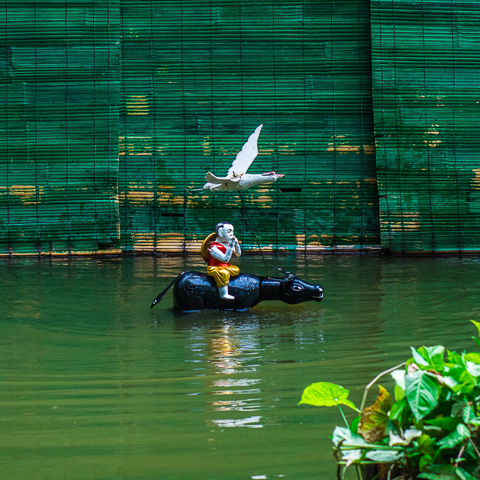
infographics
Learn more about Vietnam
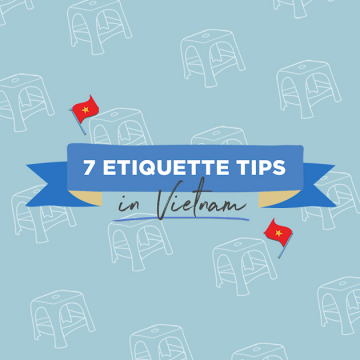
EXPERIENCES
See outstanding travel products from our partners
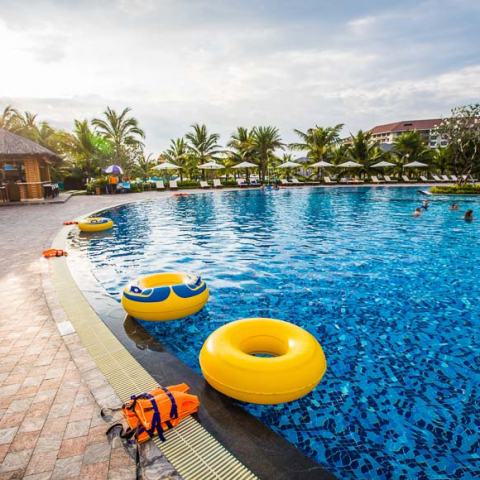
VinOasis Phu Quoc
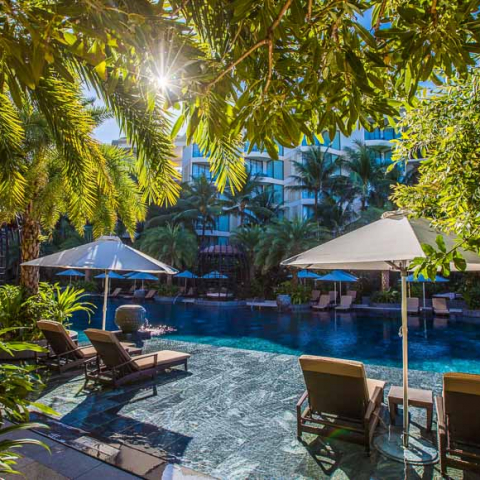
InterContinental Phu Quoc
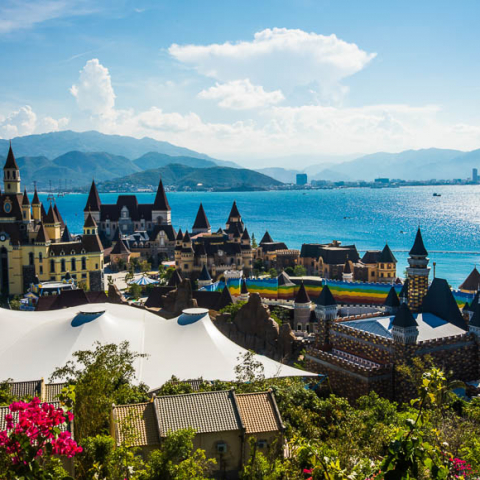
VinWonders Nha Trang
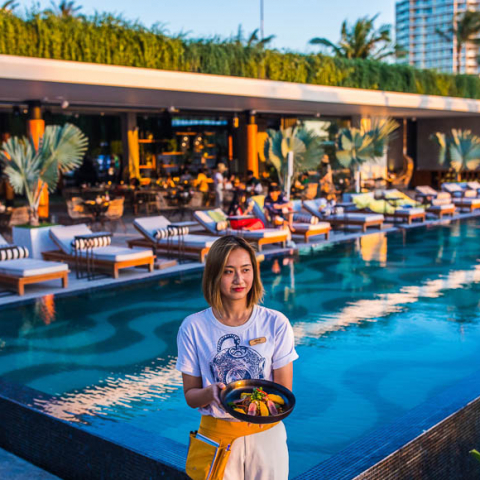
Sailing Club Phu Quoc
itineraries
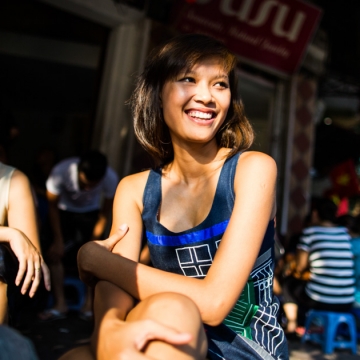
- You are here:
Create an account
Already have an account? Click here to sign in
By clicking submit, you agree to our Privacy Policy and Terms of Use
Sign in with your social accounts
Sign in with your email
Forgot password? Click here to get it back
Don't have an account? Sign up here
Forgot Password
The entered email has subscribed for Vietnam Tourism monthly newsletter
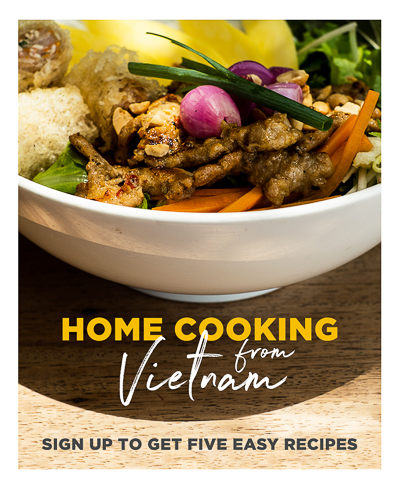

IMAGES
VIDEO
COMMENTS
VIETNAM ELECTRONIC VISA (E-VISA) From 15th August 2023, Vietnam grants e-visas for citizens of all countries and territories with 90-day stay duration and valid for multiple entry. Here is the list of border gates that allowed foreigners enter and exit Vietnam by E-visa. 13 international airports: Noi Bai (Ha Noi), Tan Son Nhat (Ho Chi Minh ...
Debit or credit card for payment. Step 2: Click this link or access https://immigration.gov.vn/ and go to 'E-visa Issuance' then click on the link for 'Outside Vietnam foreigners'. Step 3: Upload your .jpg images (passport data page and passport photo) and fill out the required fields on the form completely. Submit your form.
The U.S. Mission to Vietnam cannot assist U.S. citizens who arrive in Vietnam without required visas. U.S.-Vietnam dual nationals should consult the Department of State's information page for Travelers with Dual Nationality and the Embassy of Vietnam for travel requirements. You must enter and exit Vietnam on the same passport.
According to document, international tourists (including oversea Vietnamese) need to meet following requirements: 1. Vaccinate: Having a certificate of full dose of COVID-19 vaccine recognized by a competent authority in Vietnam (except for children under 12 years old traveling with parents or guardians).The duration of injection of the 2nd or 1st dose (for the 1 dose vaccine) is valid for 14 ...
Detailed entry requirements for international visitors to Vietnam. The Ministry of Culture, Sports and Tourism has issued Document No. 829/PA-BVHTTDL on its plan to reopen the tourism sector in the new normal. A foreigner waits to handle entry procedures at an international airport in Vietnam. Regulations on the reception of international ...
Vietnam dropped Covid-19 testing requirements for all international arrivals from 15 May 2022 as per Official Dispatch No. 416/CD-TTg after a significant decrease in the number of cases. 2. Insurance requirement. Purchase medical/travel insurance that covers COVID-19 treatment with a minimum of 10,000 USD cover.
Vietnam restored the policies on entry visas for foreigners as before the pandemic outbreak. From 15th March 2022 to 14th March 2025, Vietnam applies visa exemption for citizens of 13 countries (Germany, French, Italy, Spain, UK and Northern Ireland, Russian, Japan, Republic of Korea, Denmark, Sweden, Norway, Finland and Belarus) with maximum ...
Requirements for all travelers to enter Viet Nam. All travelers boarding a flight to Viet Nam are required to show a negative SARS-CoV-2 test result (except those aged 2 years and under) obtained within 72 hours before travel if using the RT-PCR/RT-LAMP test, or within 24 hours before travel if using the SARS-CoV-2 rapid antigen test.
Bars in Vietnam are . Find continuously updated travel restrictions for Vietnam such as border, vaccination, COVID-19 testing, and quarantine requirements.
Mandatory Requirements (in case you apply for a visa on arrival online) Applicants must enter Vietnam by air to Hanoi, Ho Chi Minh city or Da Nang. Passport must valid at least 6 month from the date of exit. Two passport photos size 4 x 6 cm (see photo specifications). In most cases, you do NOT need to show the following: The required documents ...
Contact your local embassy or consulate for fees for in-person or postal applications. To get a Visa on Arrival, you must first pay a fee to a visa agency for a "visa pre-approval letter". For a single-entry visa, this costs around US$17 for 30 days and US$25 for 90 days. For a multiple-entry visa, the fee is around US$20 for 30 days and US$65 ...
See our Vietnam evisa tips here. Foreign travelers are not required to take a pre-departure Covid-19 test or show proof of vaccination prior to arrival. The health declaration form requirement has been removed. Travel insurance that covers Covid-19 treatment with a minimum coverage of $10,000 has been required.
If your travel plans in Vietnam include outdoor activities, take these steps to stay safe and healthy during your trip. Stay alert to changing weather conditions and adjust your plans if conditions become unsafe. Prepare for activities by wearing the right clothes and packing protective items, such as bug spray, sunscreen, and a basic first aid ...
Travellers with symptoms of COVID-19 or those concerned they may have been exposed to the SARS-CoV-2 virus should call Vietnam's health hotline: 1900 3228. Vietnam has appointed 30 screening centres nationwide to carry out testing and diagnosis of COVID-19 disease, as well as 45 quick response teams to assist health facilities in the ...
Visa Required. Visitors whose countries are not eligible for visa-exempt will have to apply for a Vietnam e-Visa, valid for 30 days. As of July 2020, Vietnam's e-Visa is available to nationals of 80 countries. The fee for an e-visa is $25 USD, and the processing time is 3 working days. The code to print your visa will be sent to you by email.
This page was updated on January 2023 Is Vietnam open for visitors? Yes. Vietnam has now fully opened its borders to international visitors. There are no longer any COVID‑19 entry restrictions for travel to Vietnam. This includes requirements for testing, vaccination, quarantine and entry forms. What are Vietnam's vaccine requirements? It is generally possible to […]
To enter Vietnam, your passport must have: an 'expiry date' at least 6 months after the date you arrive. at least 2 blank pages. no damage - British nationals have been denied entry and exit ...
An article posted on the travel website Traveloffpath.com on March 17 highlighted the entry requirements that Vietnam is applying in the new normal context, saying Vietnam now seems to be the ...
Exercise normal precautions in Vietnam. Read the country information page for additional information on travel to Vietnam. If you decide to travel to Vietnam: Enroll in the Smart Traveler Enrollment Program (STEP) to receive Alerts and make it easier to locate you in an emergency. Follow the Department of State on Facebook and Twitter.
Live fully in Vietnam. Vietnam opens its door widely to welcome visitors all around the world! Starting from 15th August 2023, Vietnam extends e-visa validity to 90 days and unilateral visa exemption will be valid in 45 days! We are more than happy to welcome you all here and admire our stunning landscapes, free your soul on white sandy beaches ...
Before you travel, check with your transportation company about passport requirements. Its rules on passport validity may be more stringent than the country's entry rules. Regular Canadian passport. Your passport must be valid at least 6 months beyond the date you expect to leave Vietnam. Passport for official travel. Different entry rules ...
Comprehensive 13-day itinerary that covers Vietnam's top destinations, including Hanoi, Hoi An, and Ho Chi Minh City, priced at $1,291.91 per person. Offers a small-group experience with a maximum of 12 participants, ensuring a personalized and immersive travel experience.
The e-visa is valid for 90 days, and multiple entry. As of 15th August 2023, Vietnam's e-visa is available to all countries/territories around the world. Travellers can apply directly for e-visas at Vietnam e-Visa Official Website. Vietnam's e-Visa is a simple, online approval process available to citizens of 80 countries.
Get ready for your visit. Vietnam's unit of currency is the Vietnamese đồng (VND), represented by the '₫' symbol. You can find ... , represented by the '₫' symbol. You can find notes in denominations of 200₫, 500₫, 1,000₫, 2,000₫, 5,000,₫ 10,000₫, 20,000₫, 50,000₫, 100,000₫, 200,000₫, and 500,000₫. For newcomers it ...